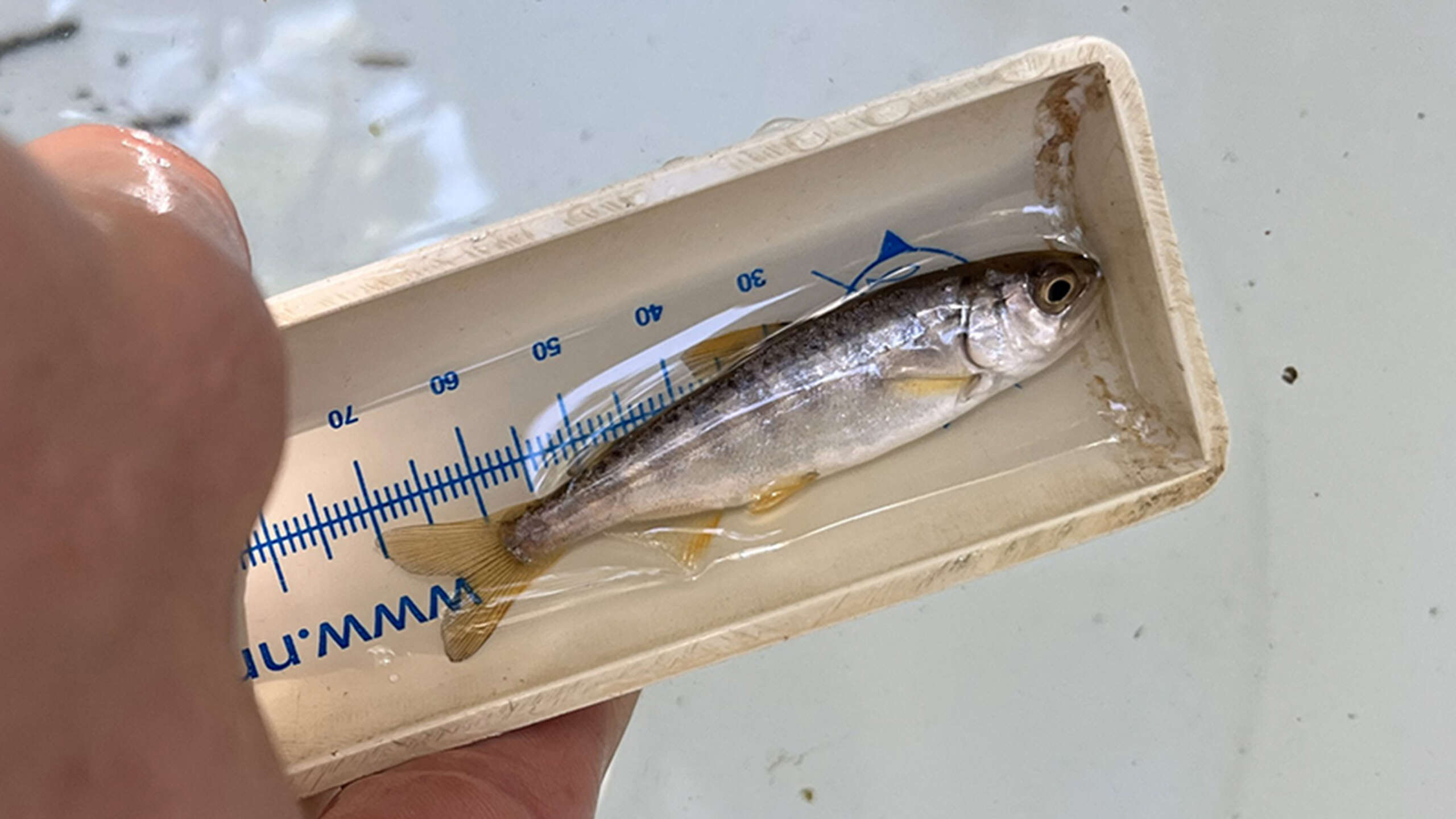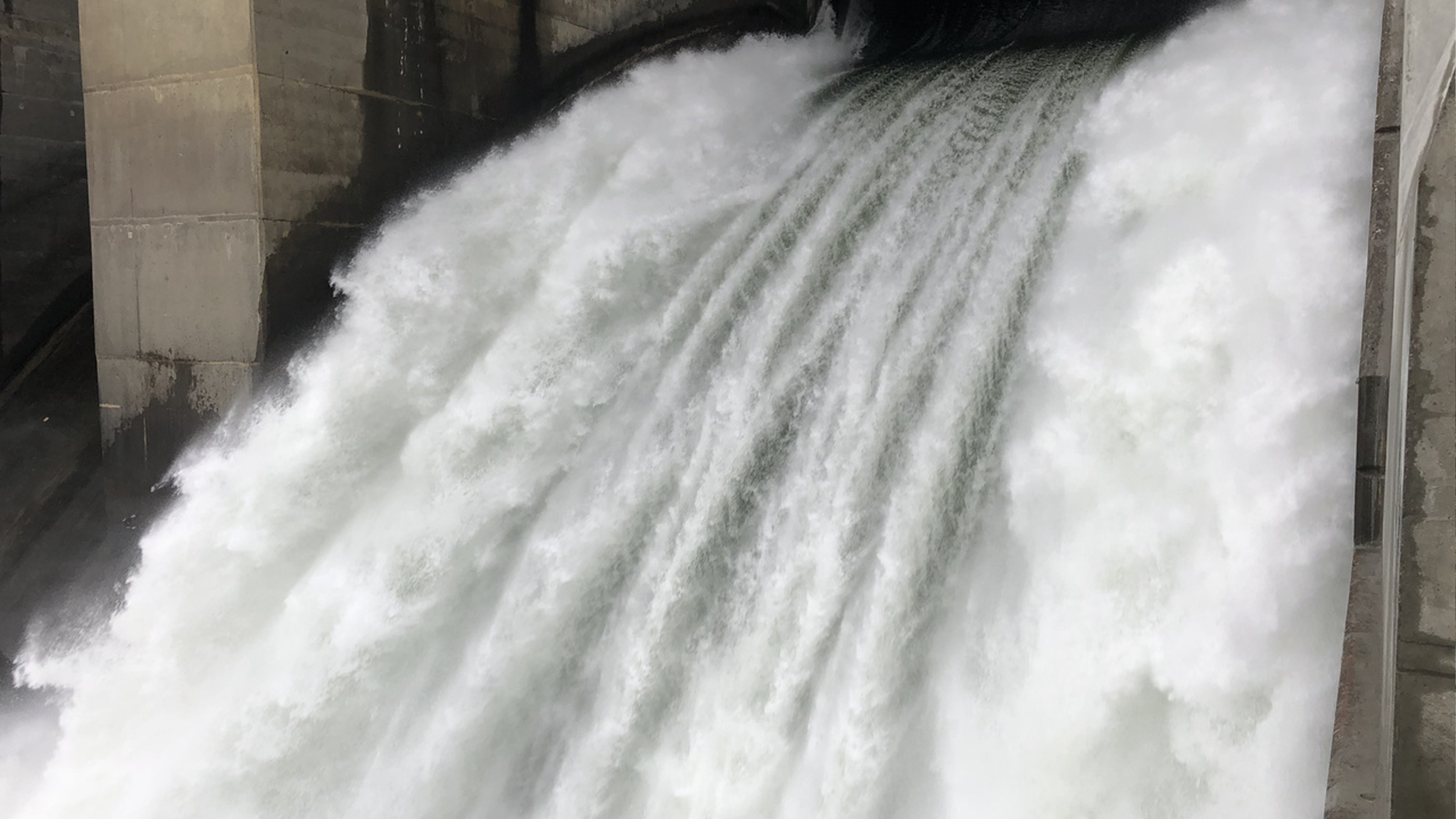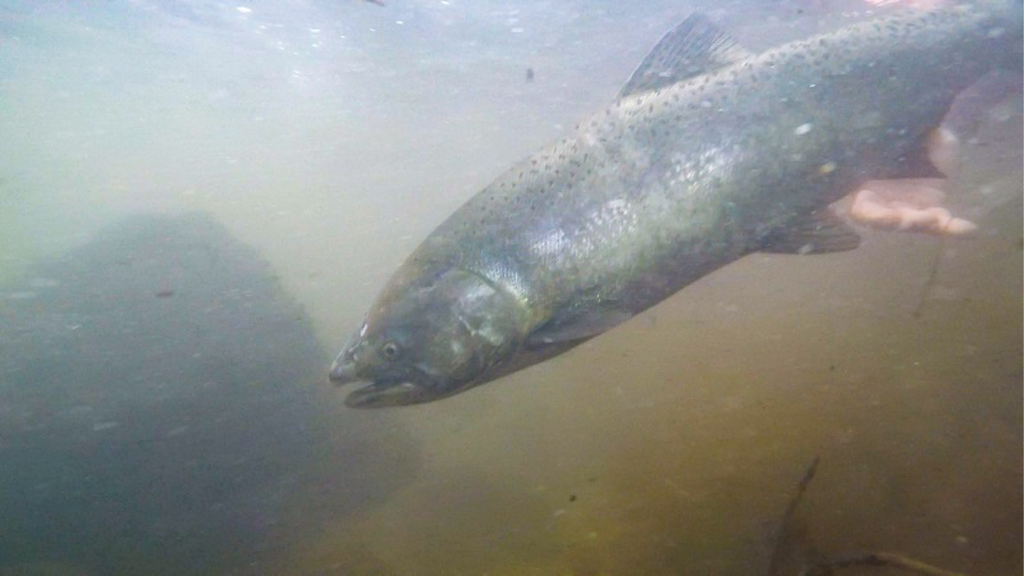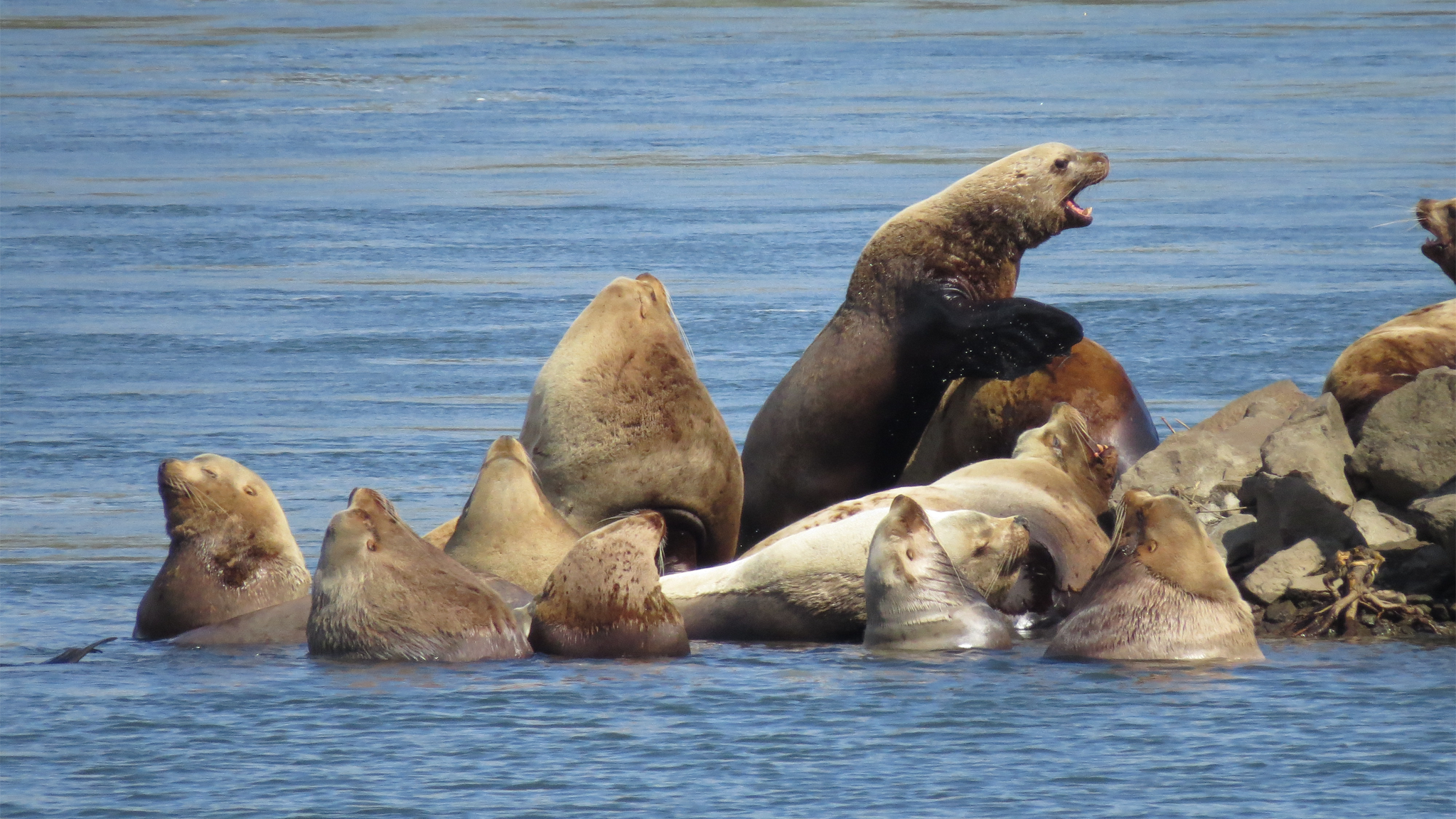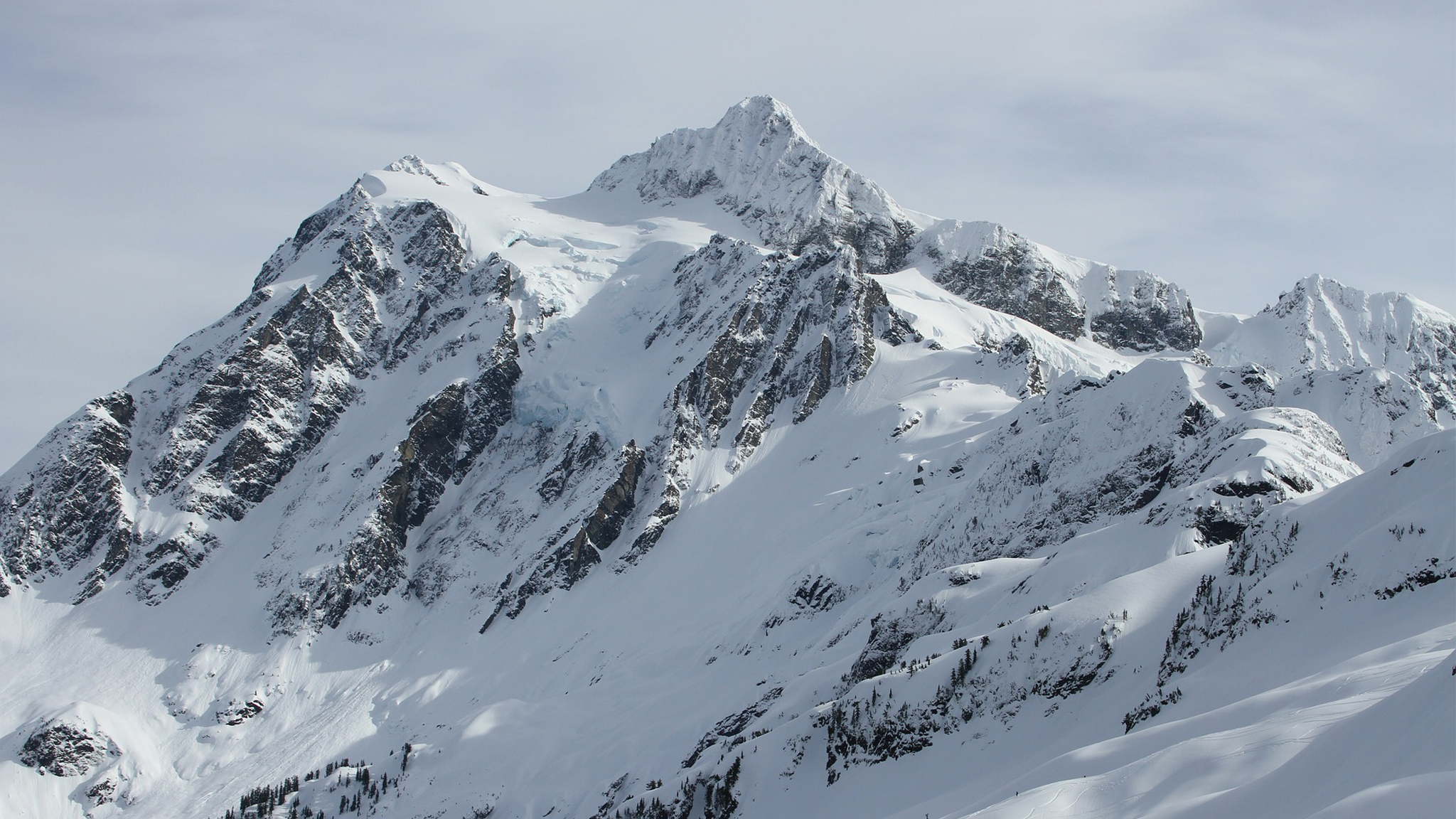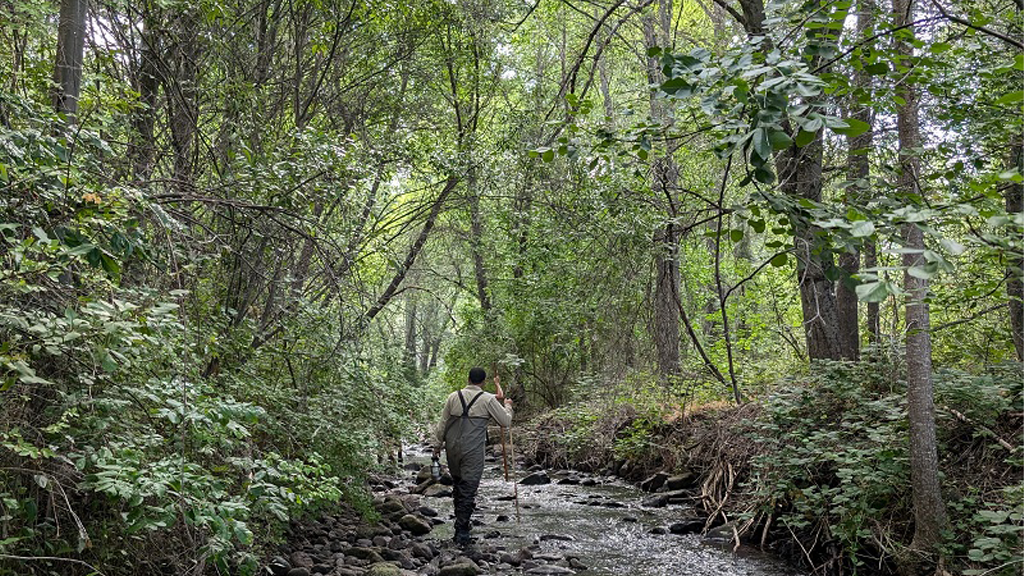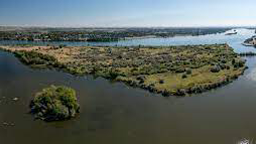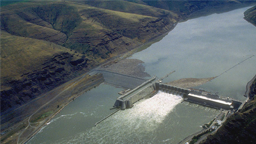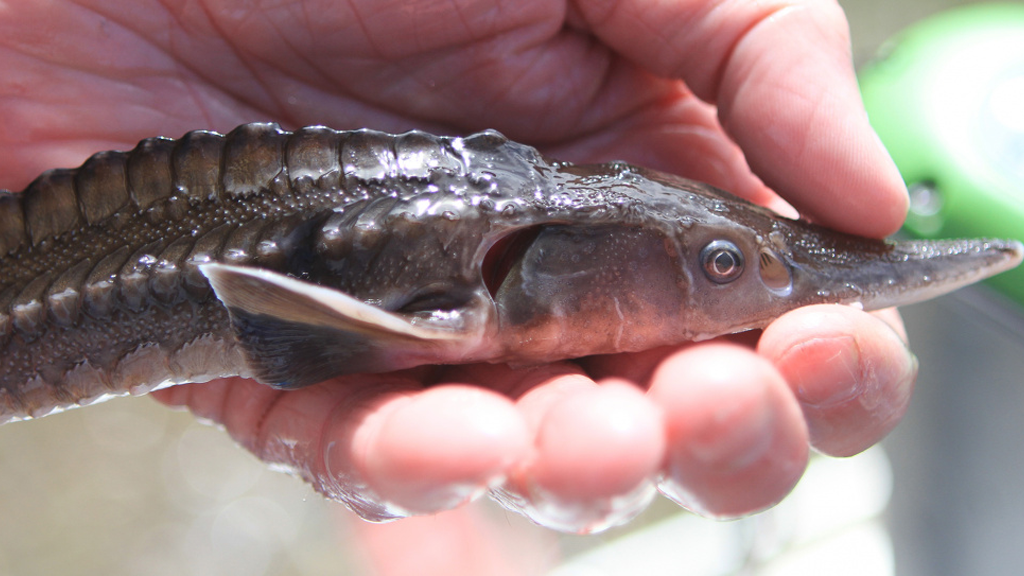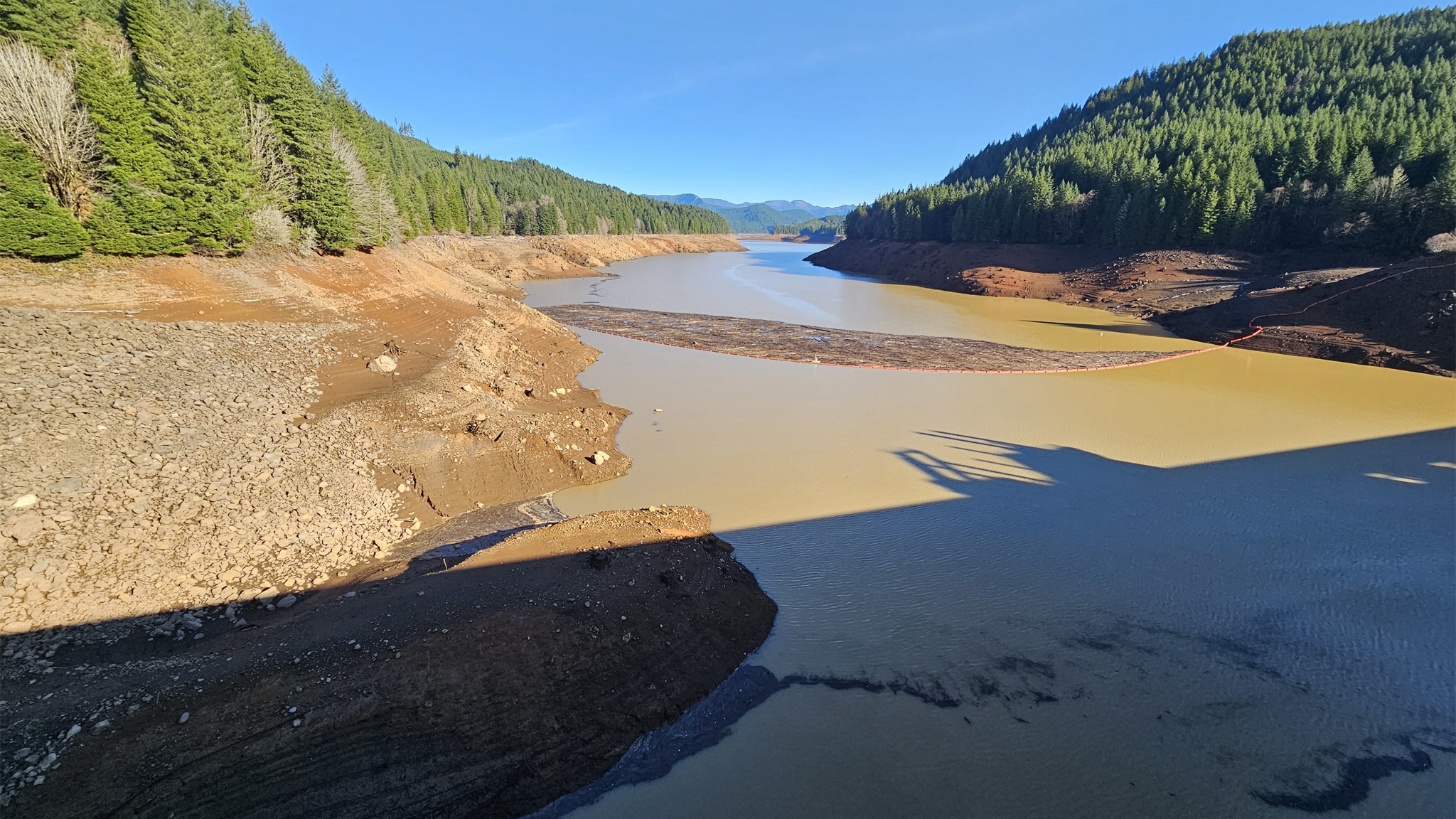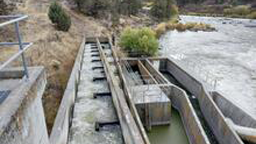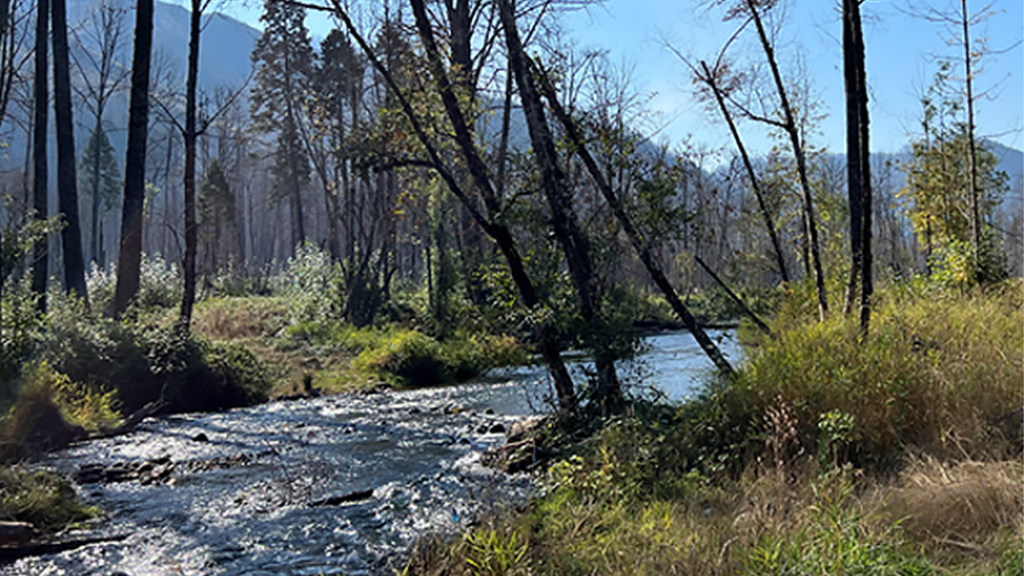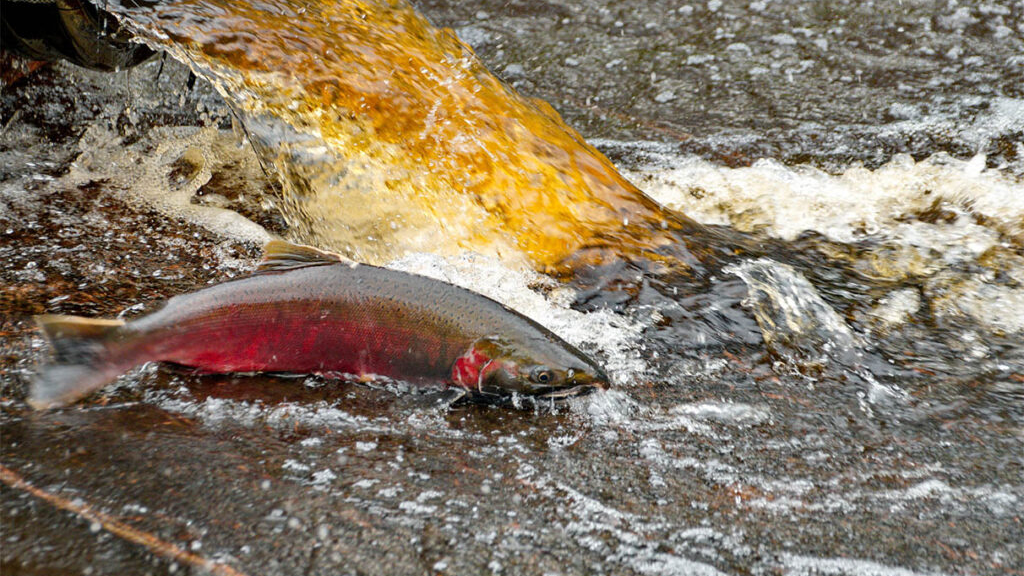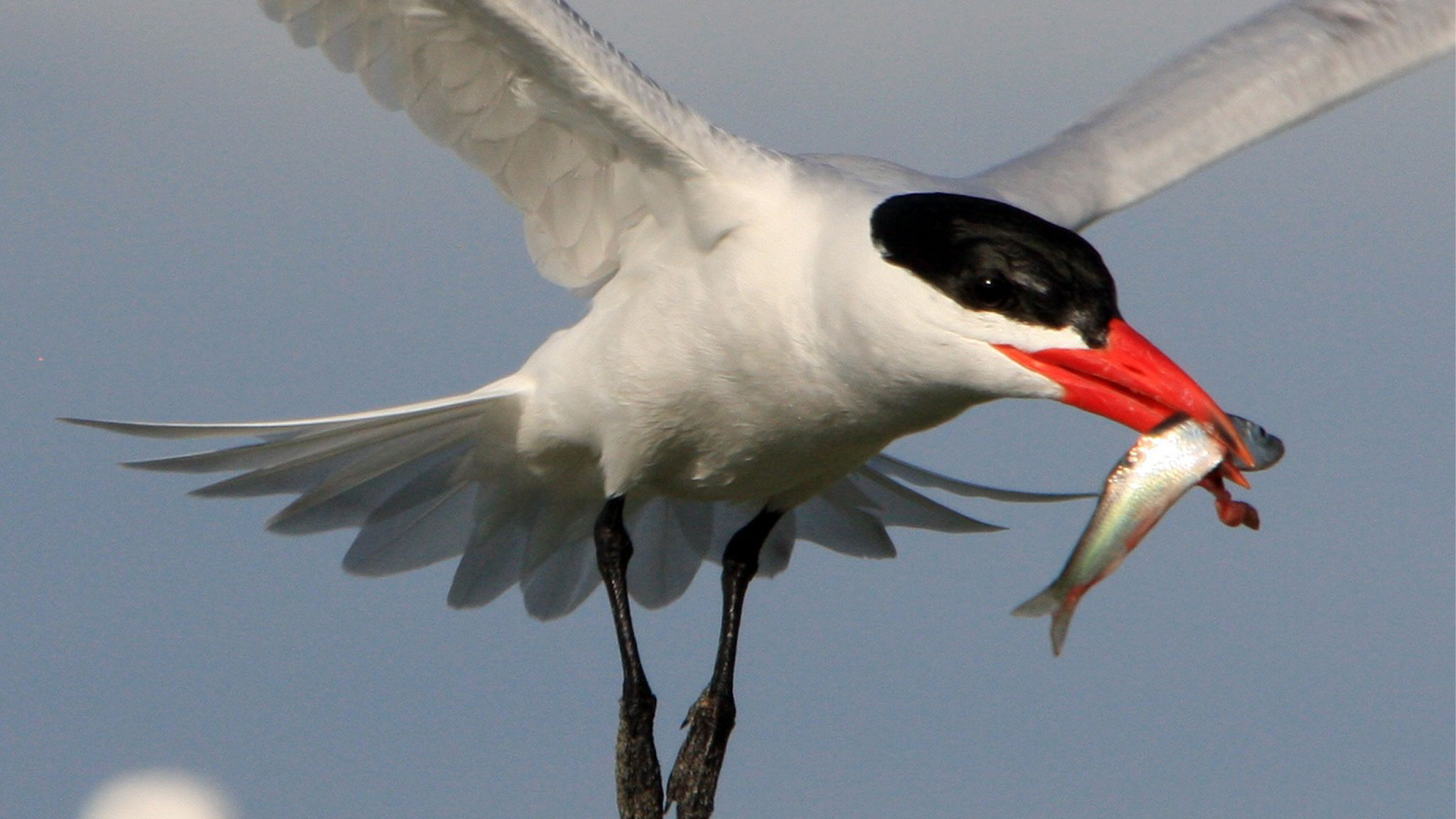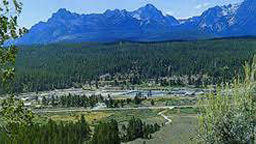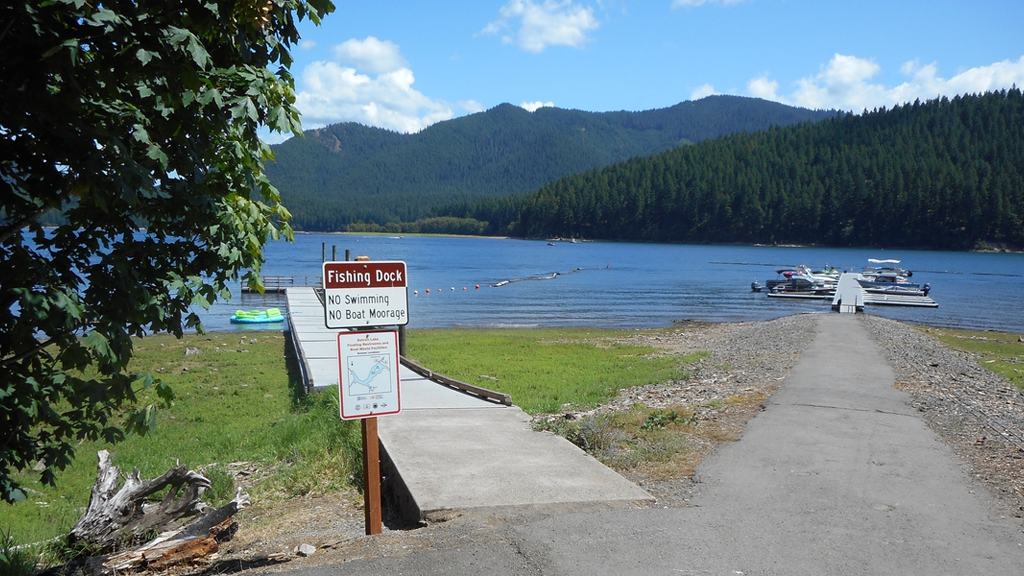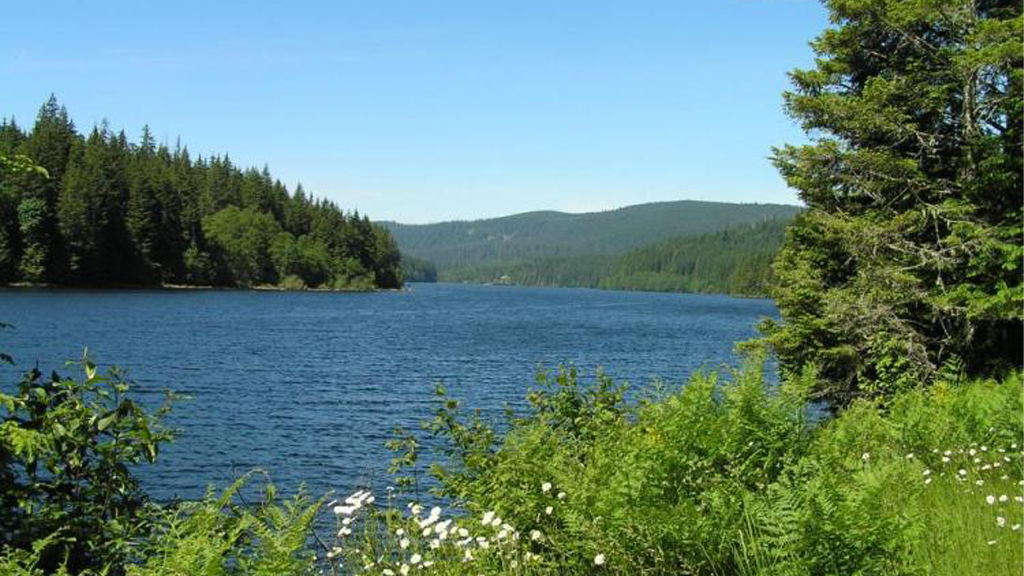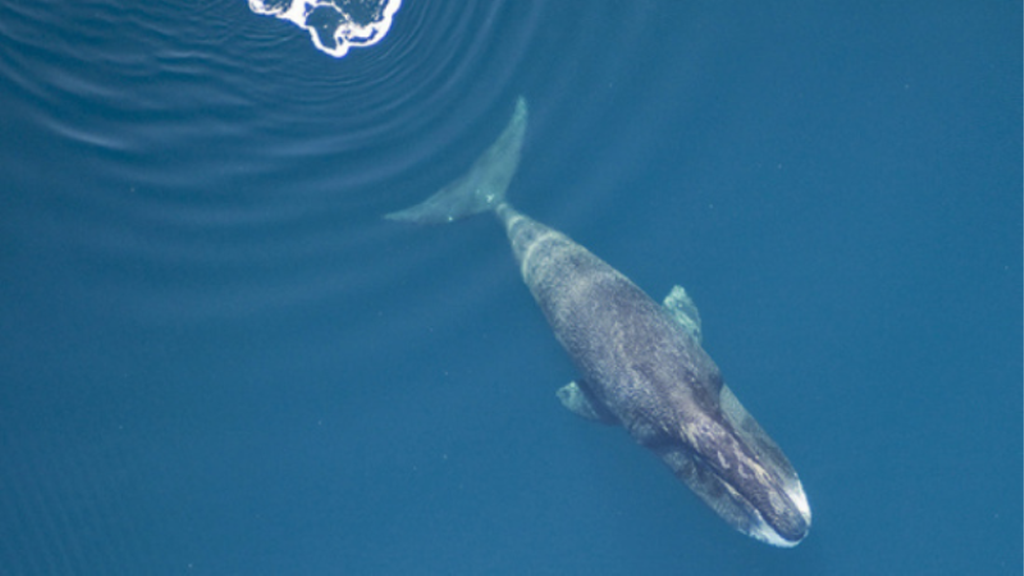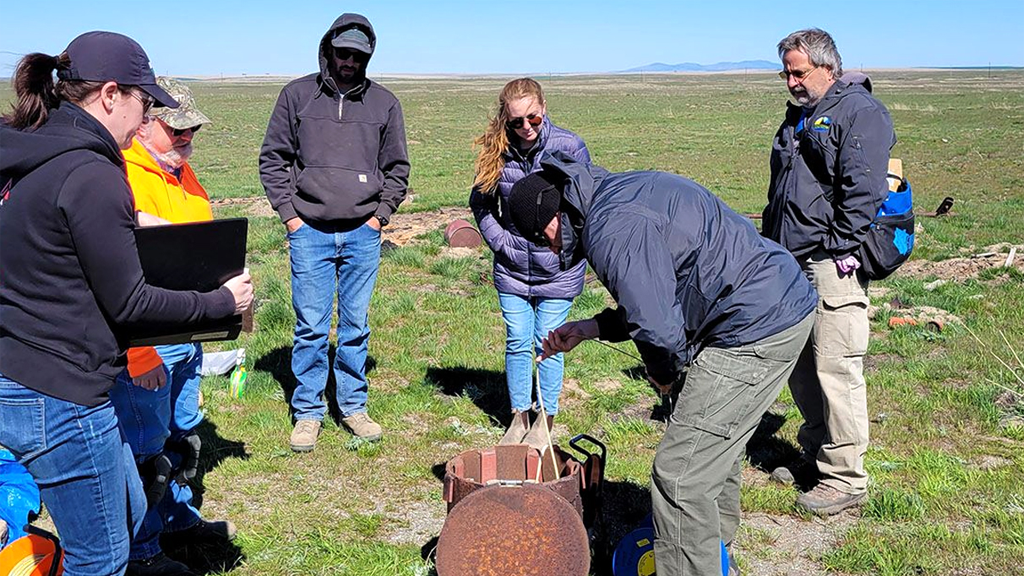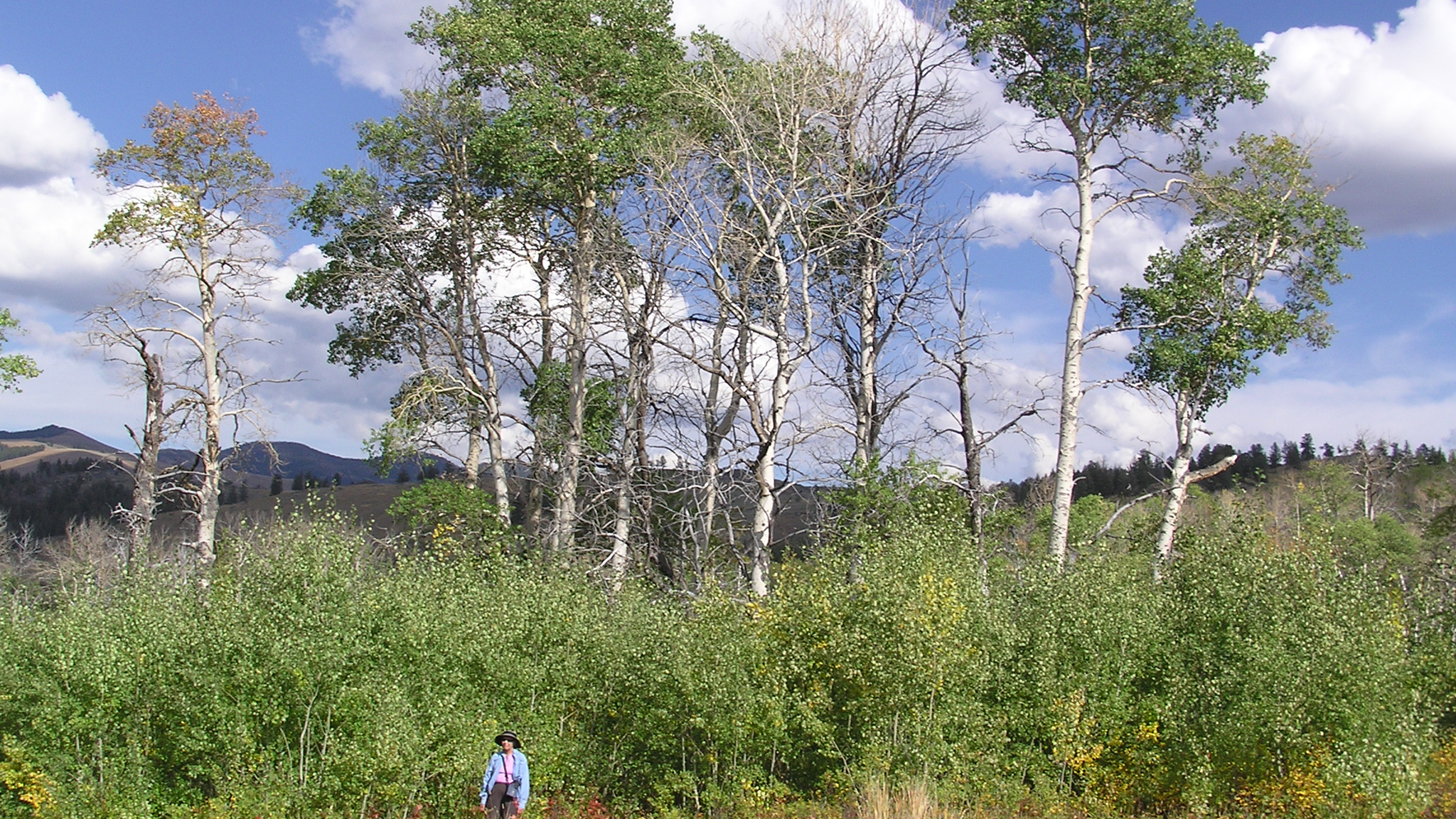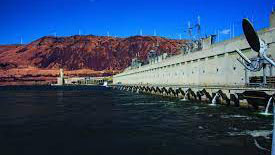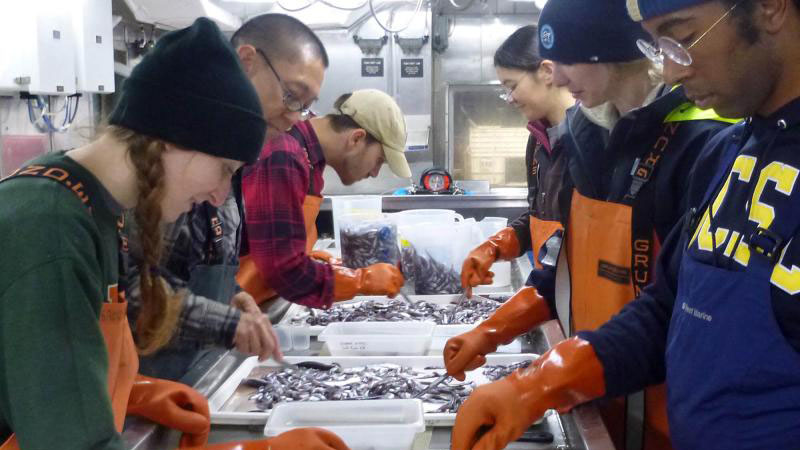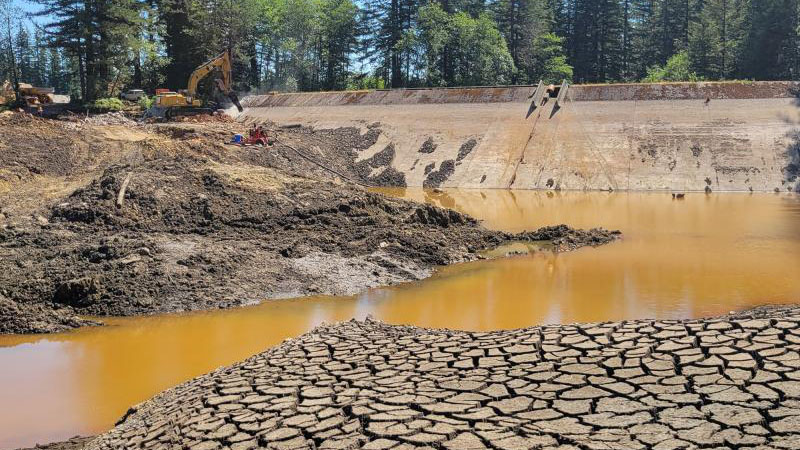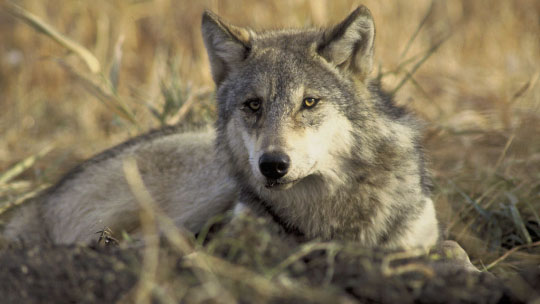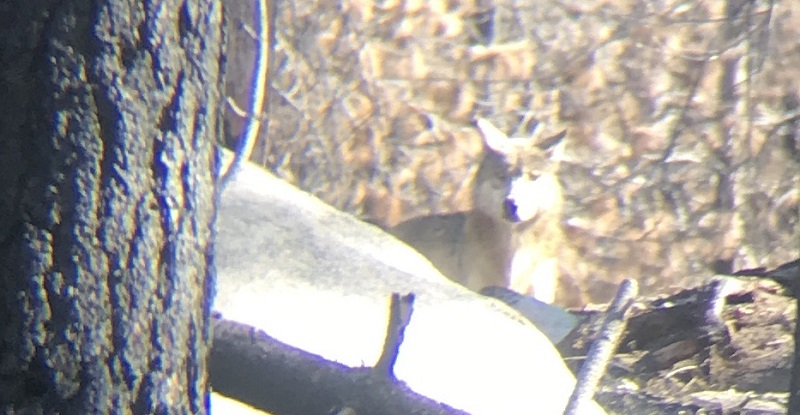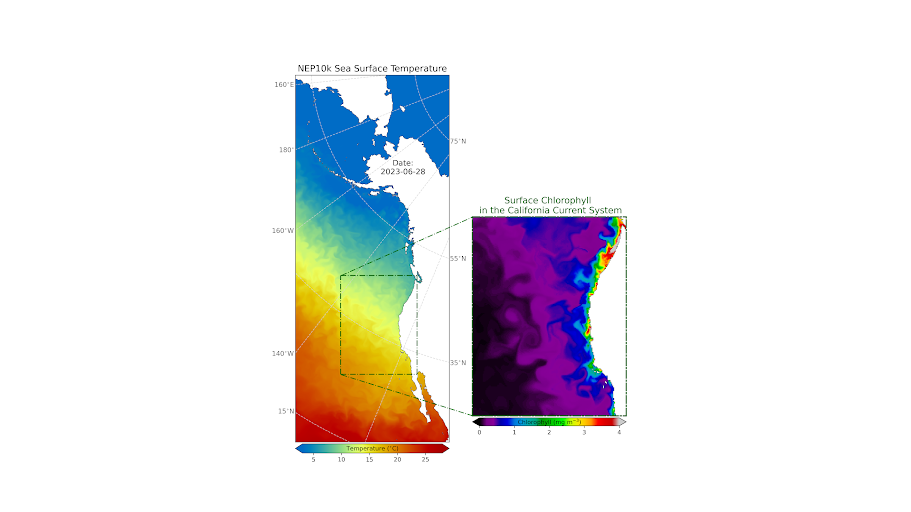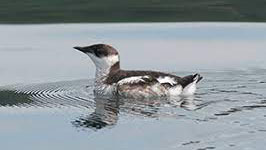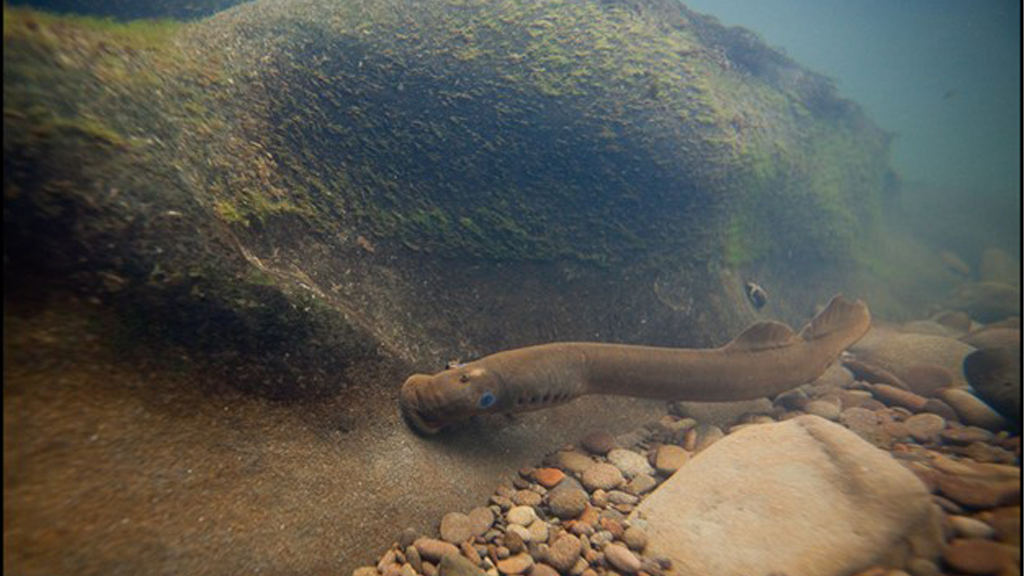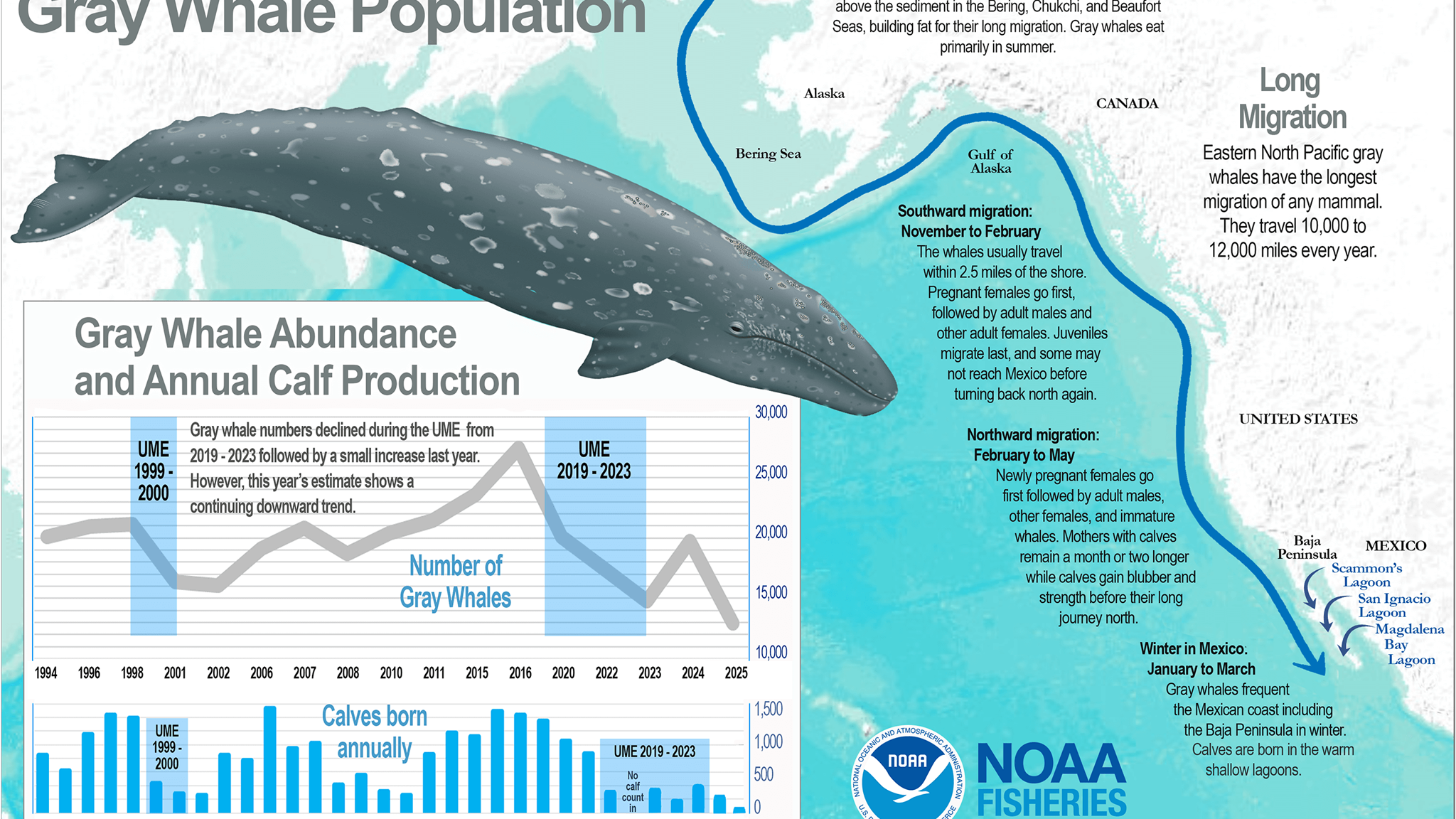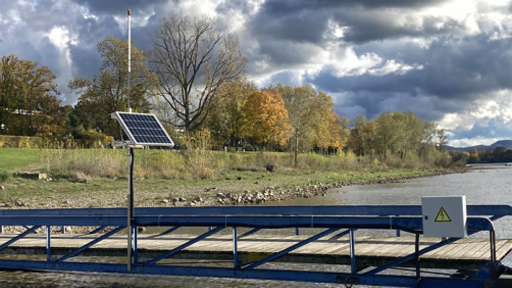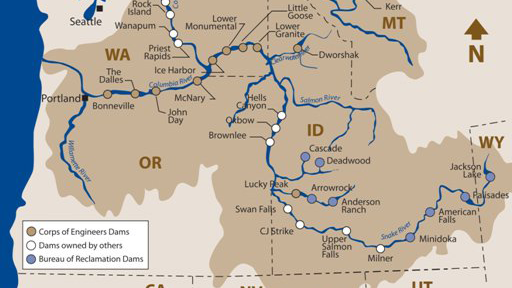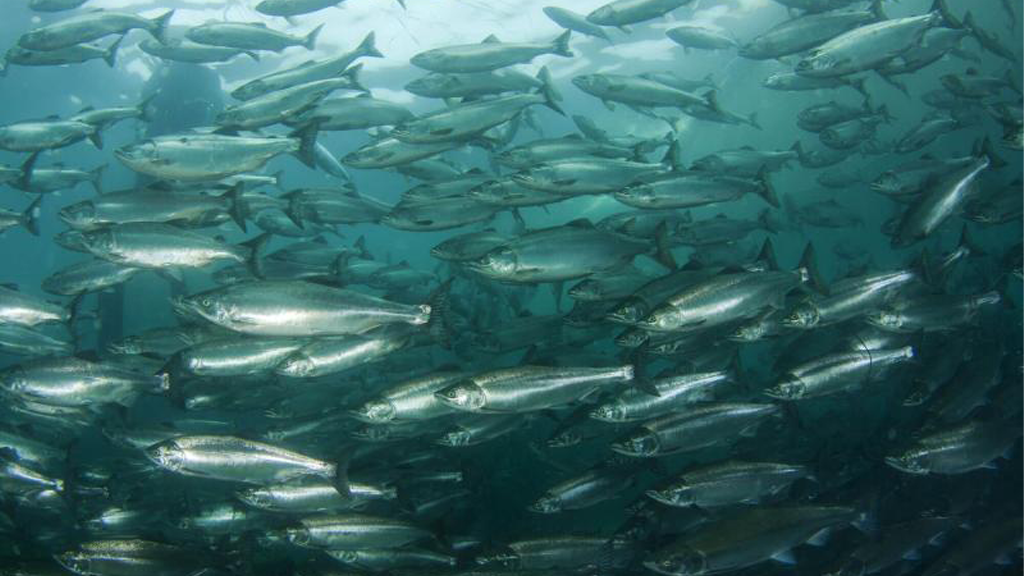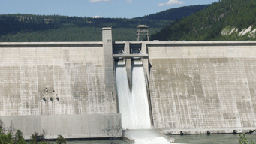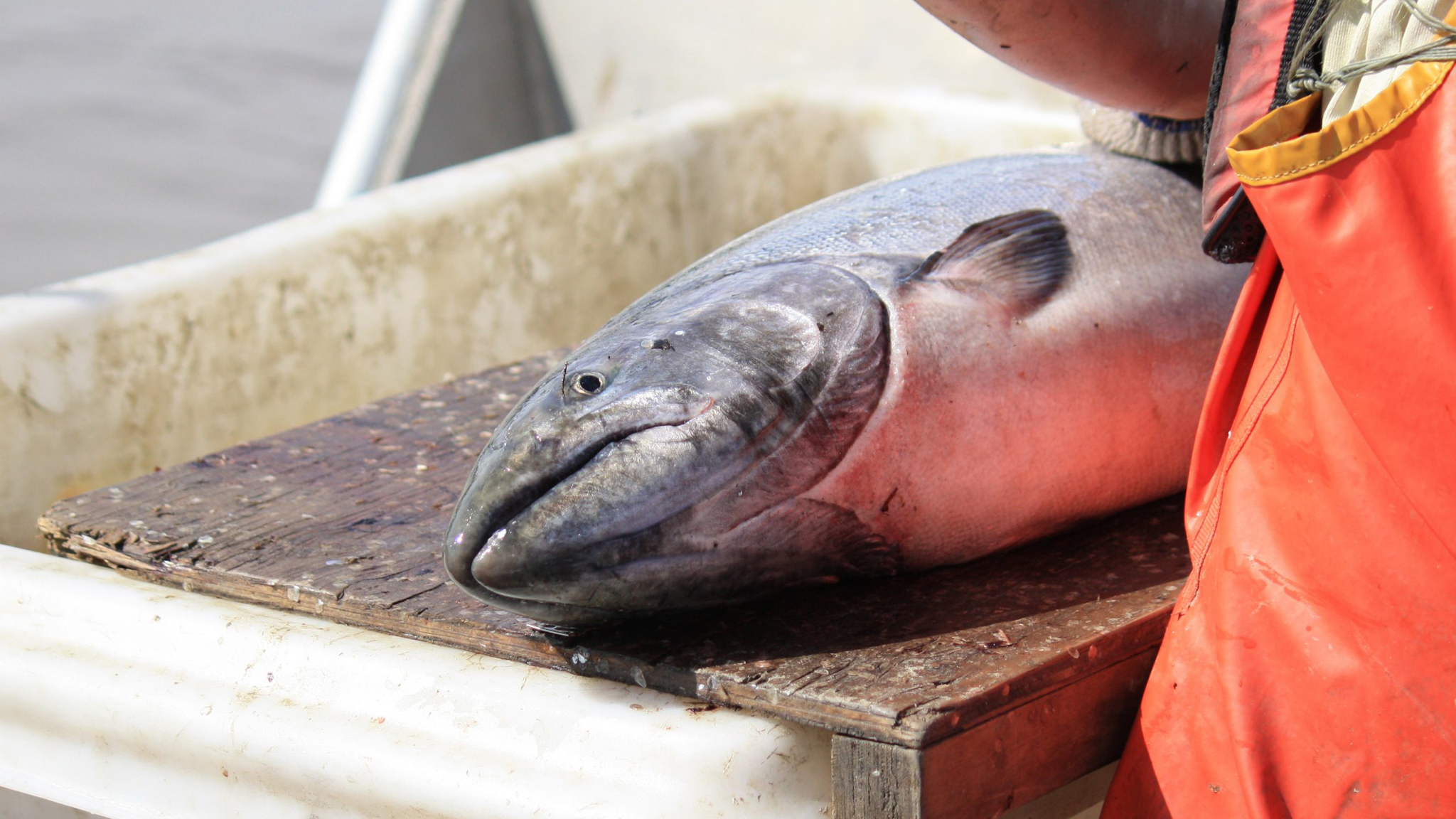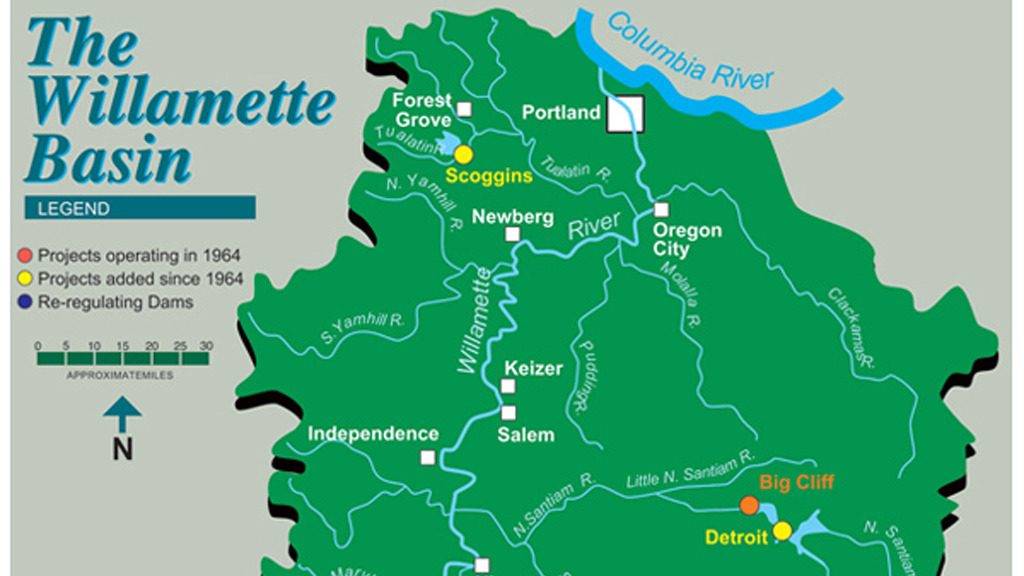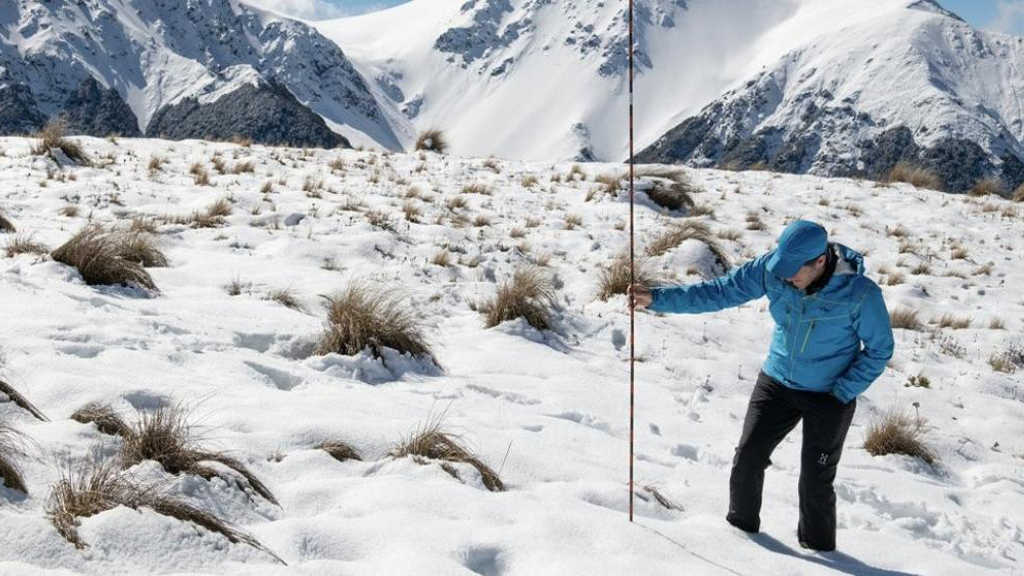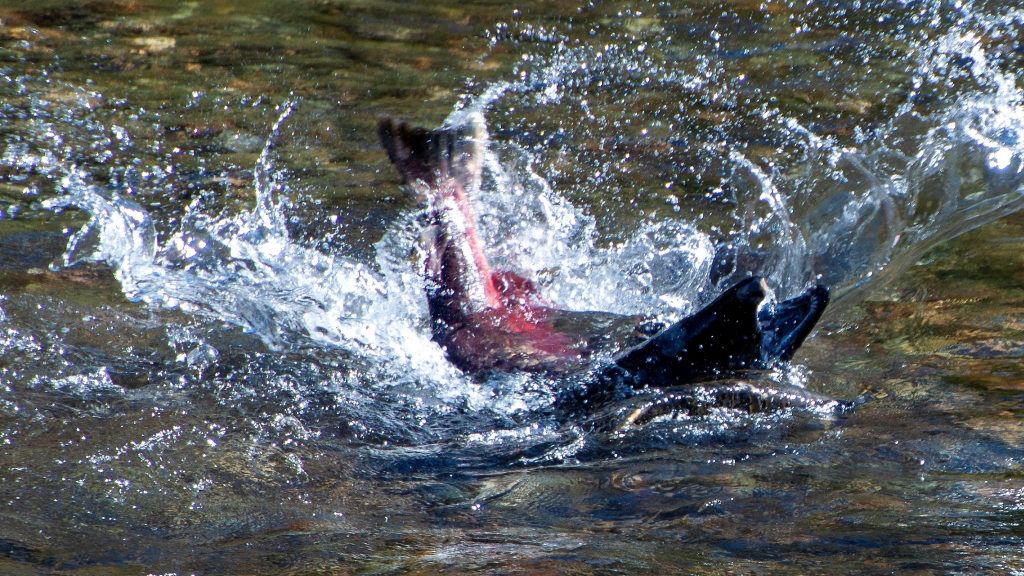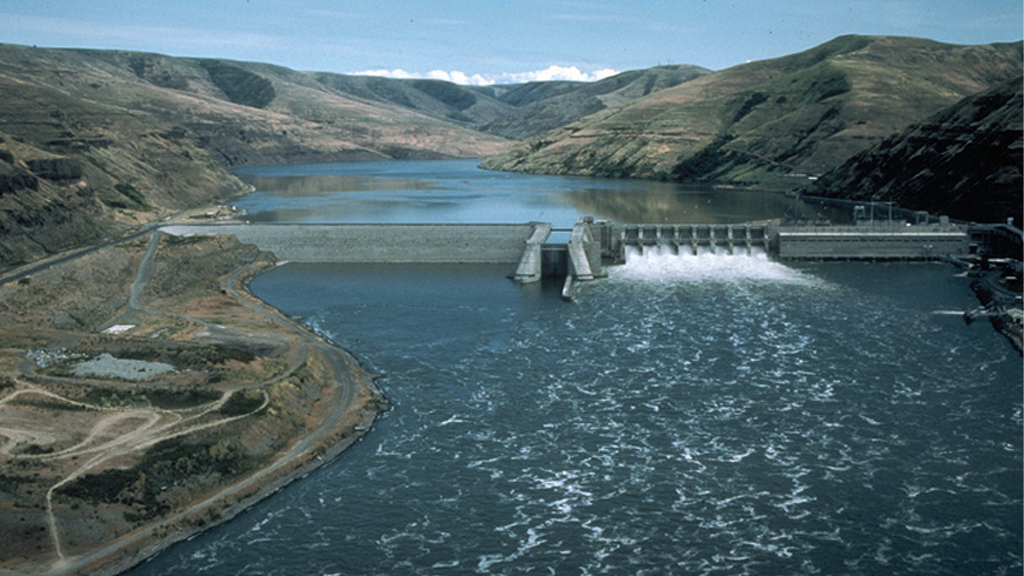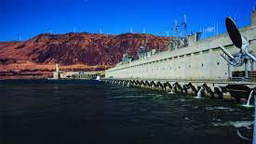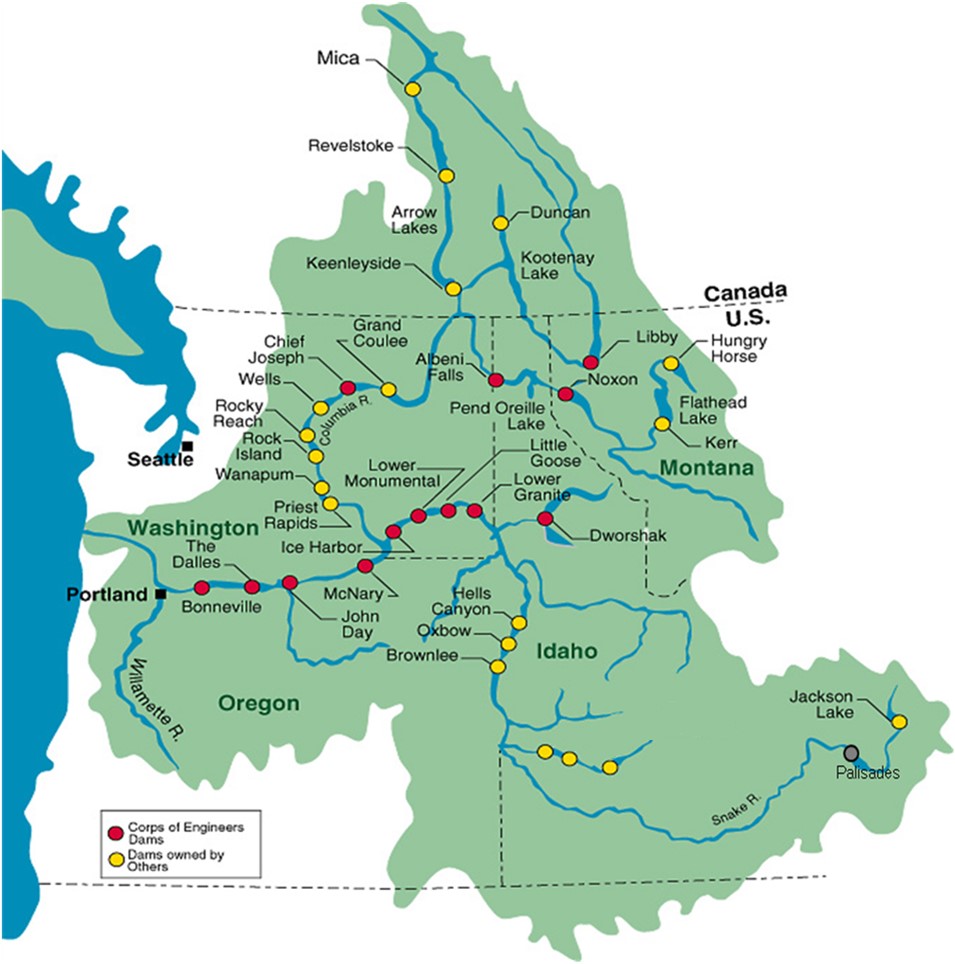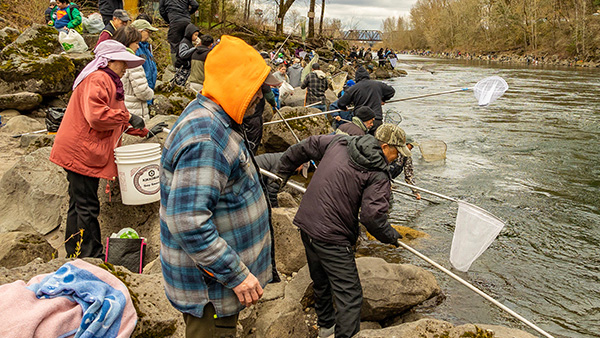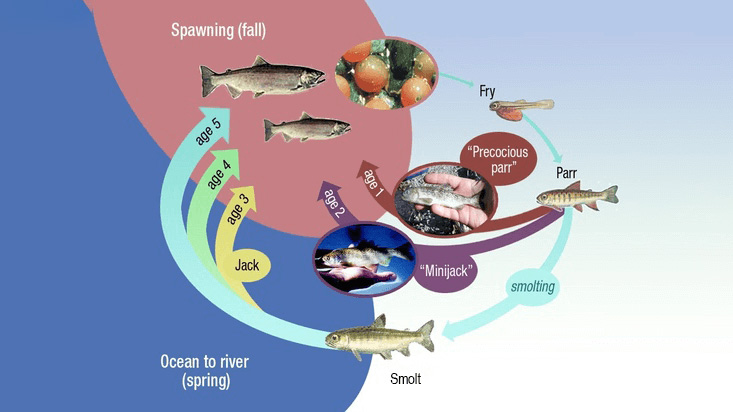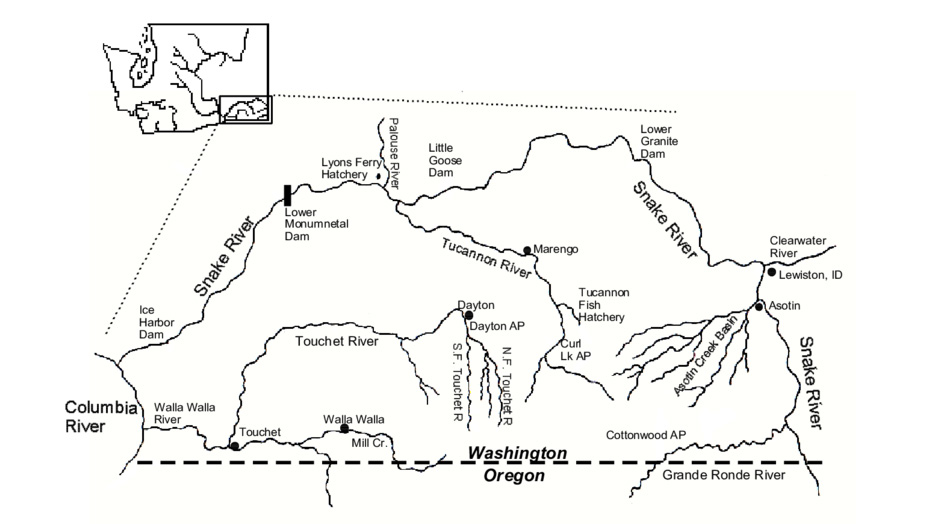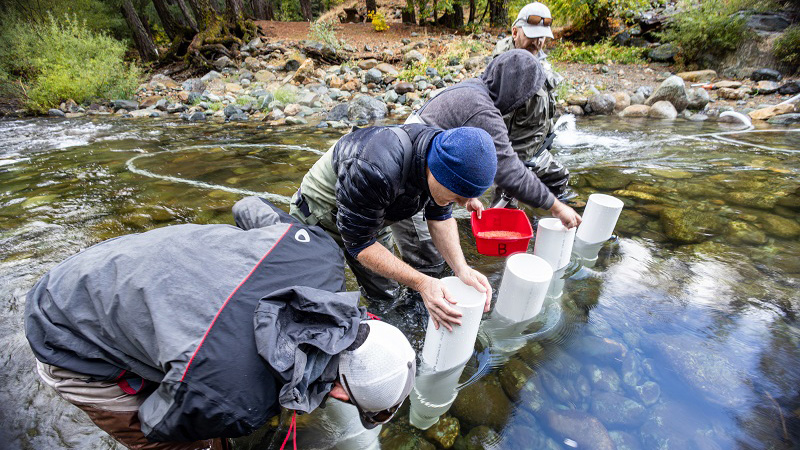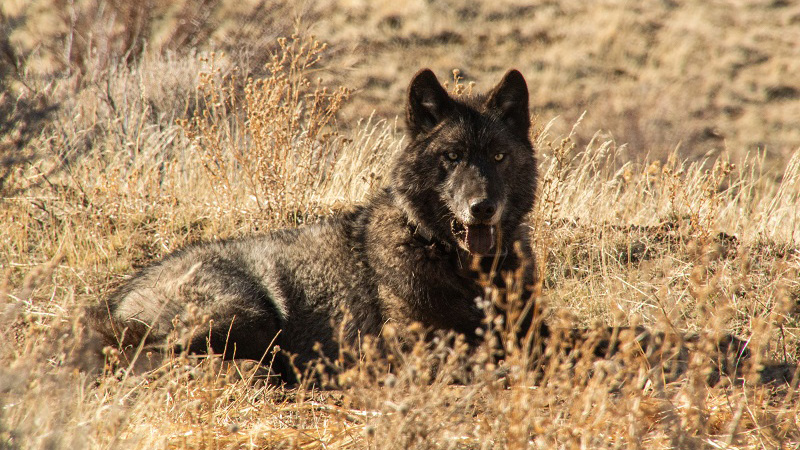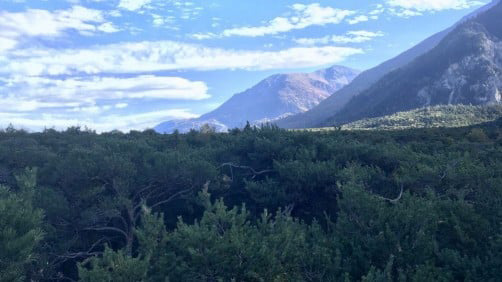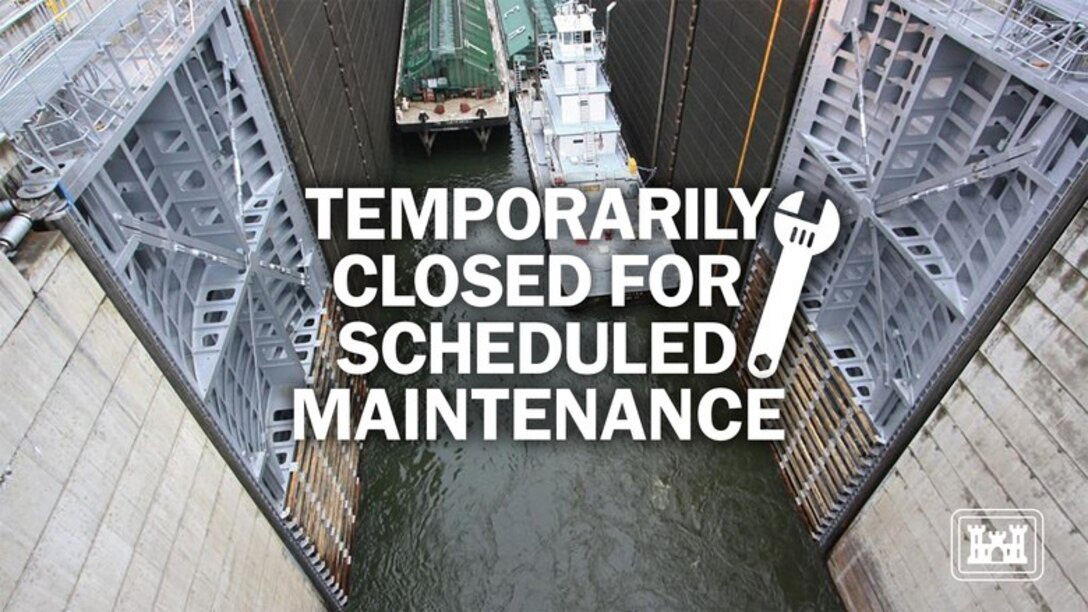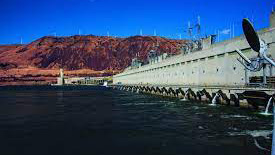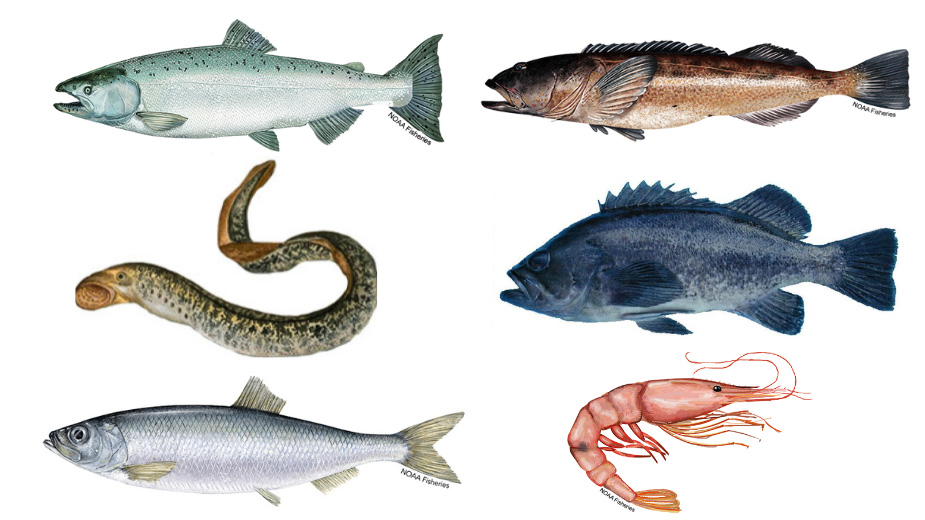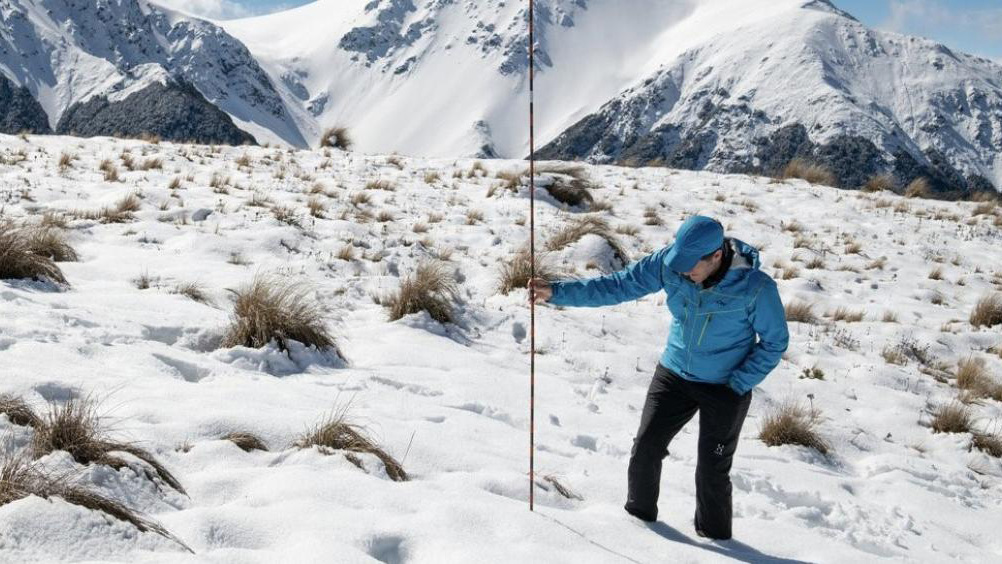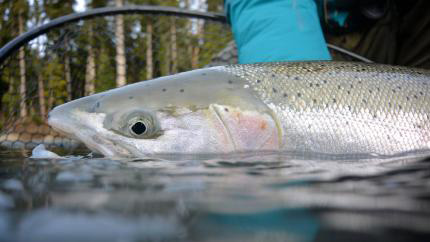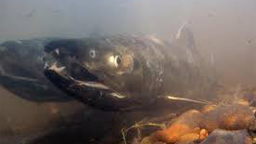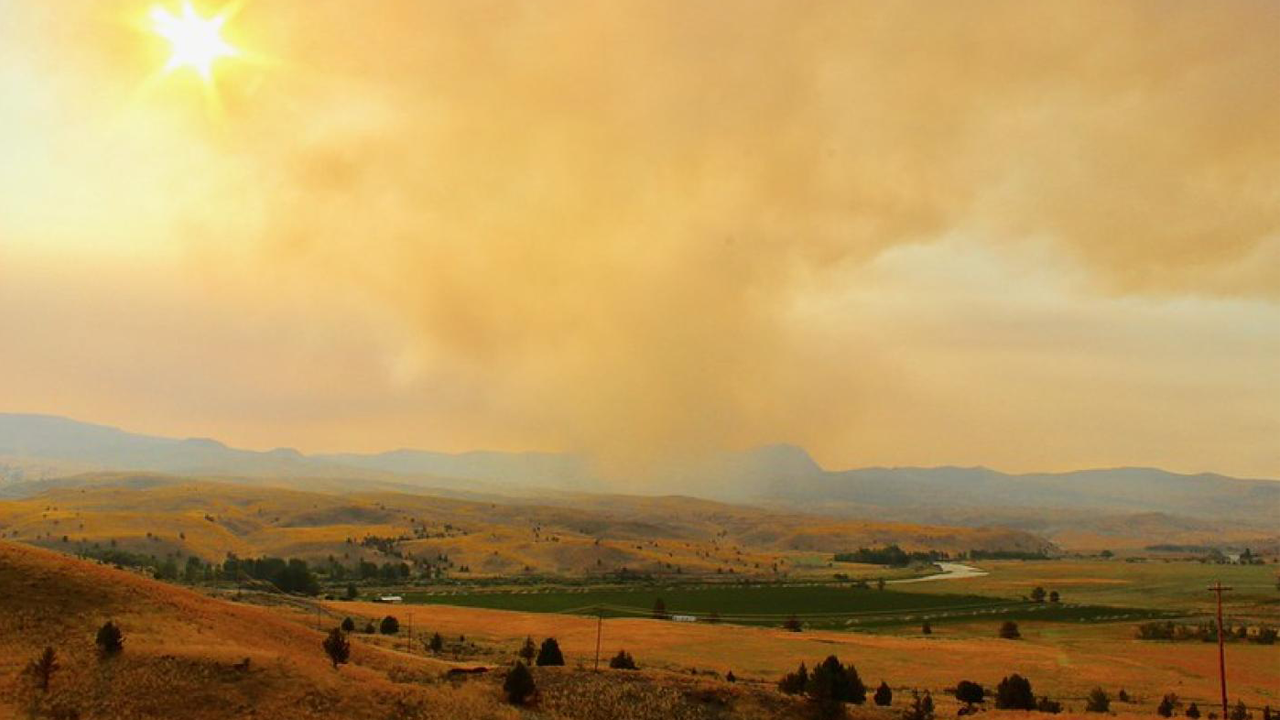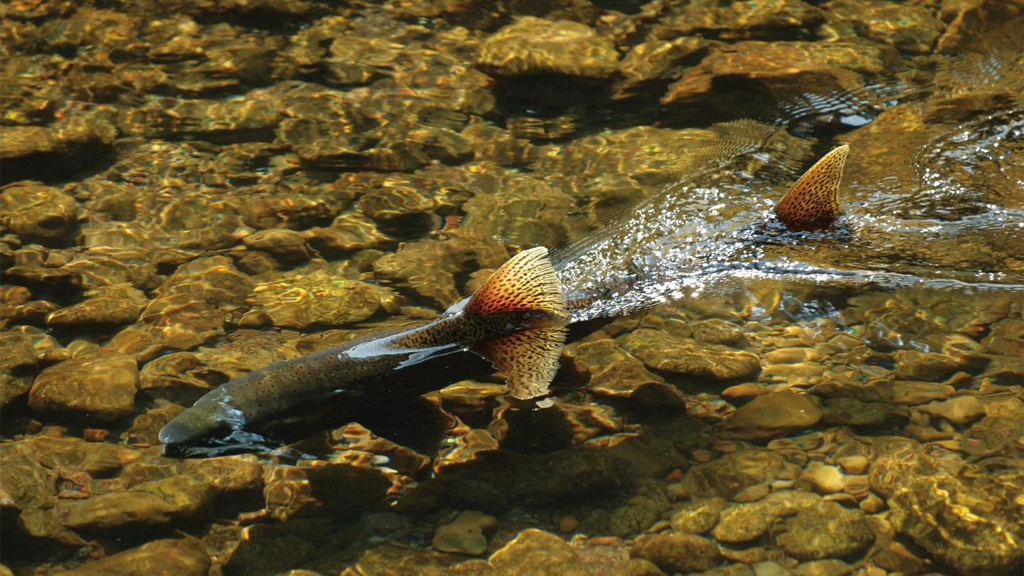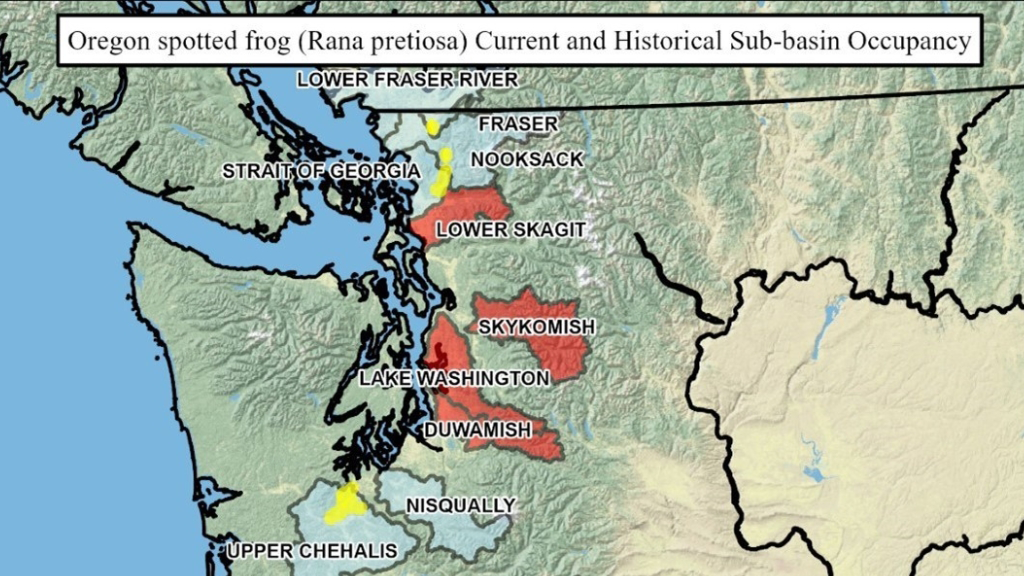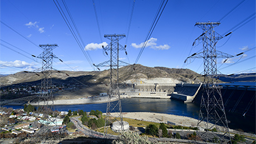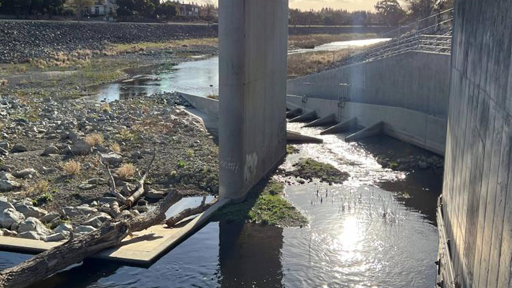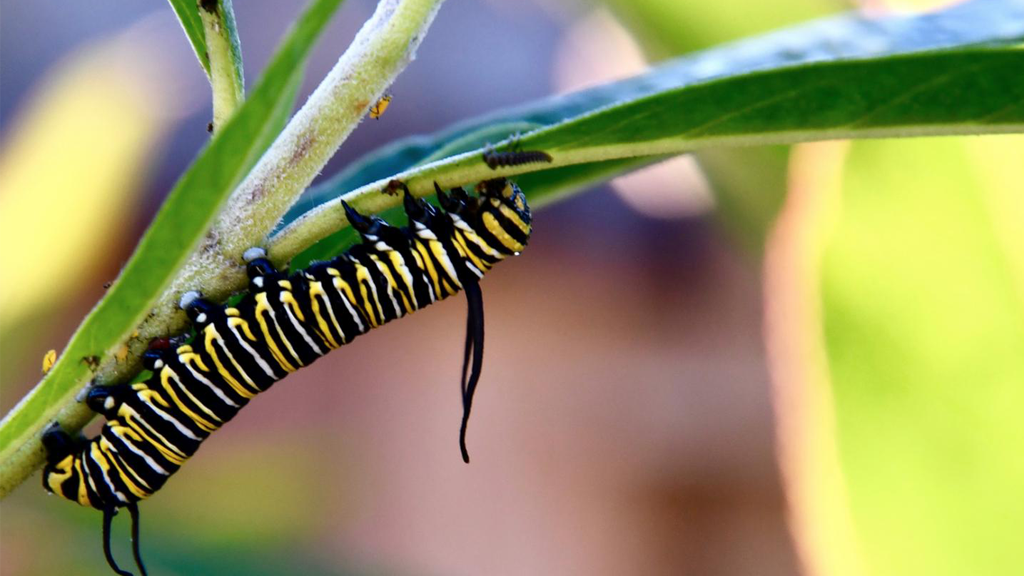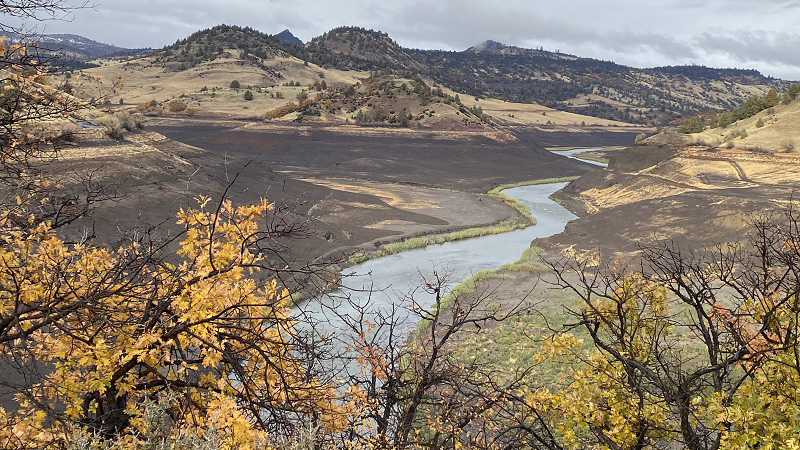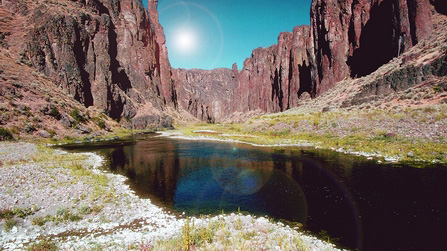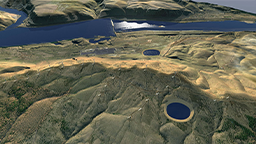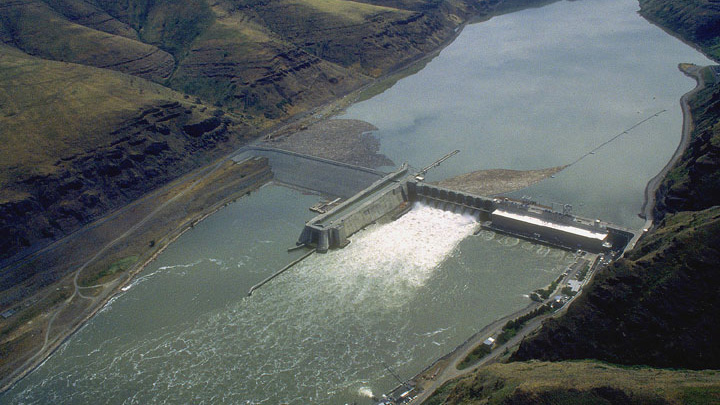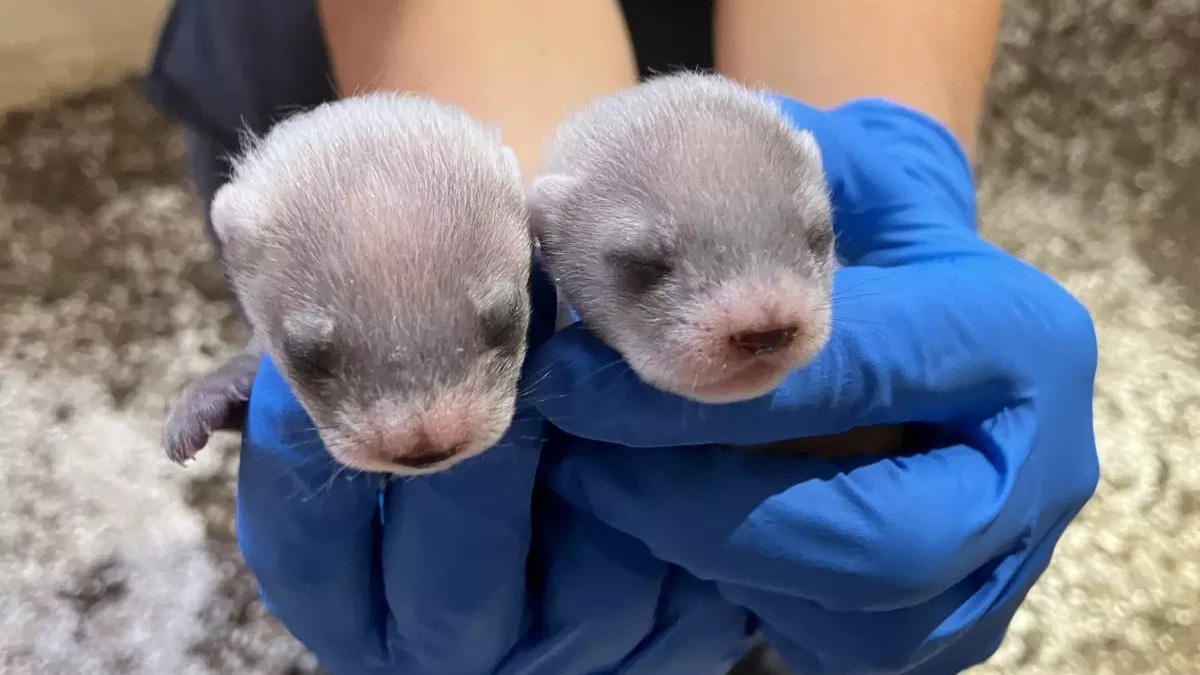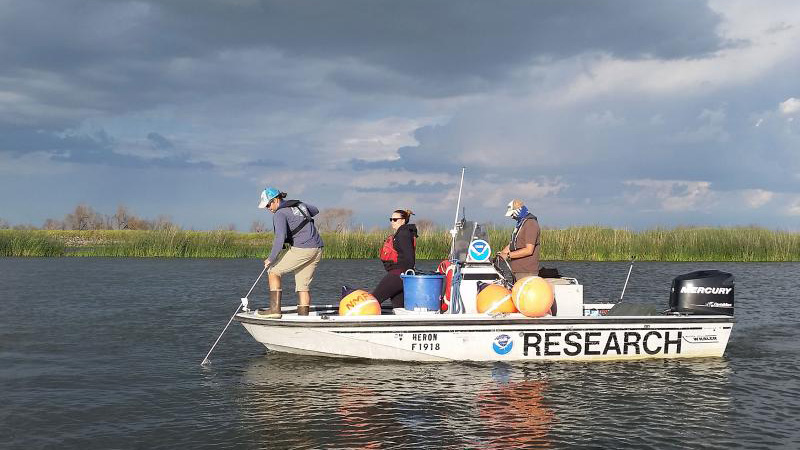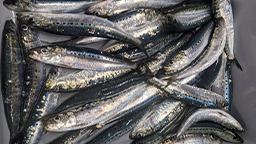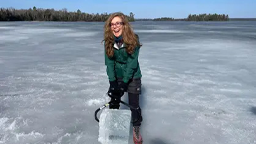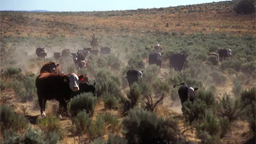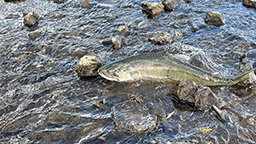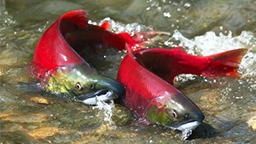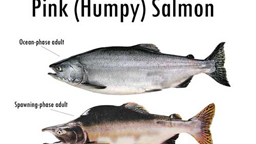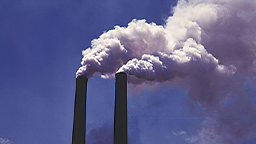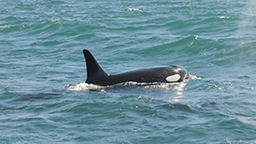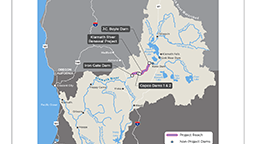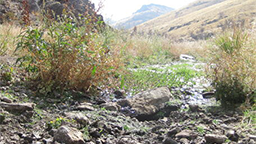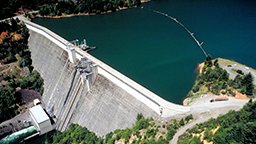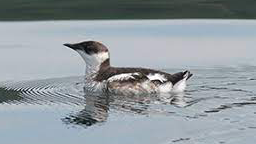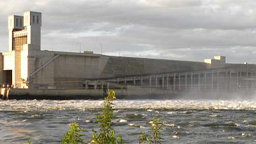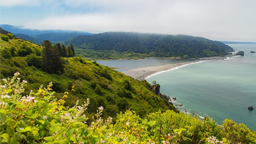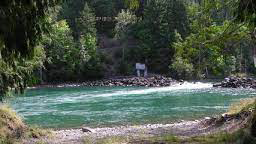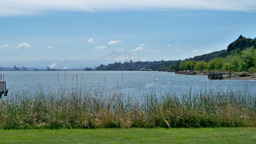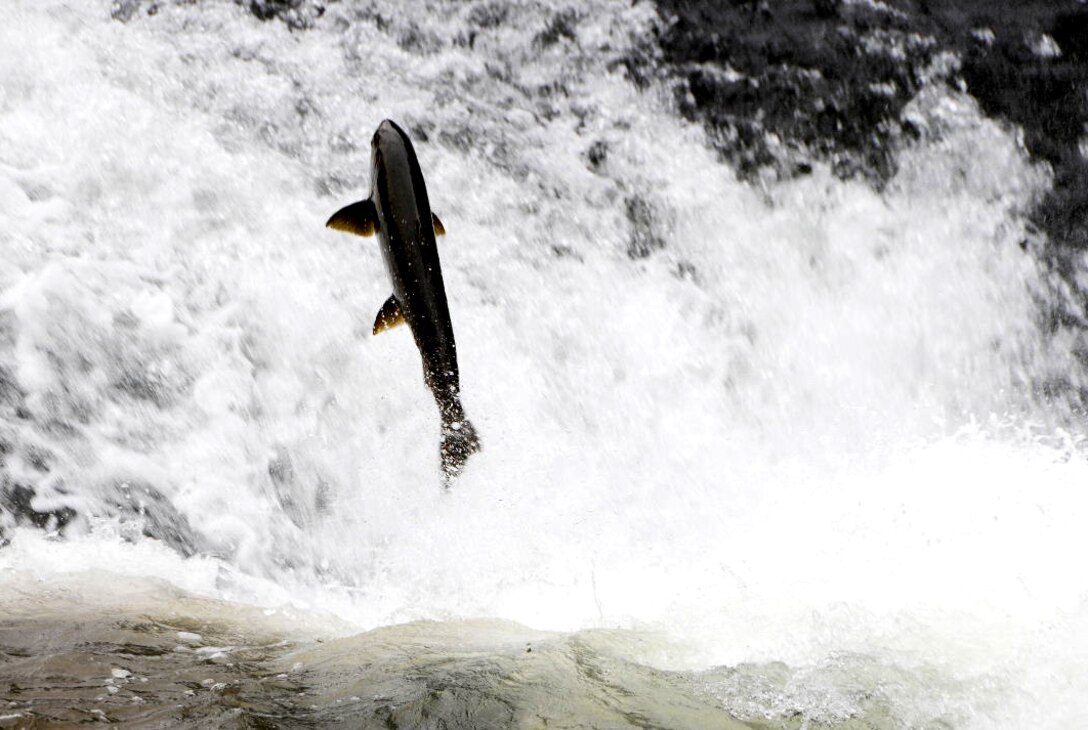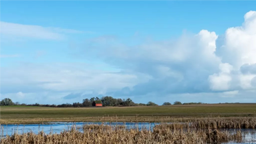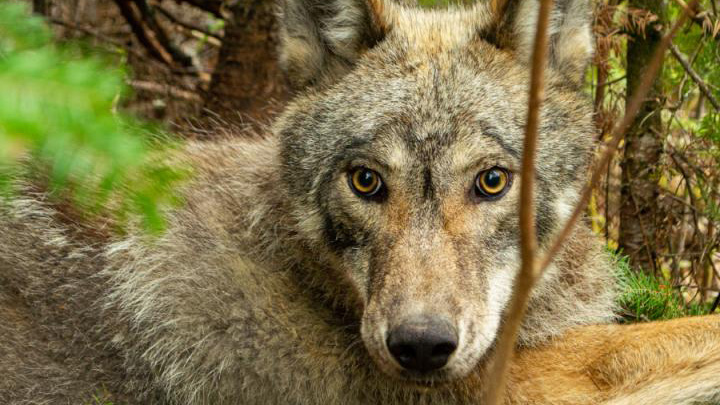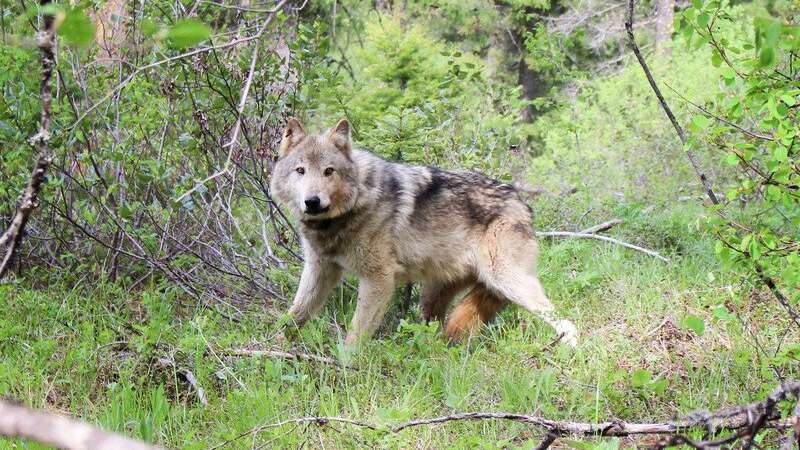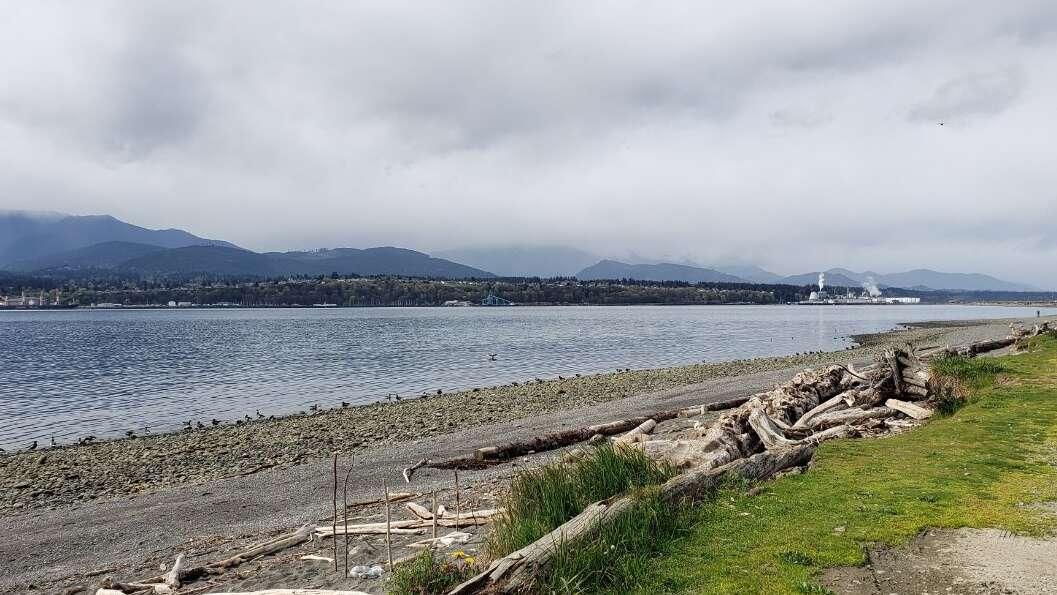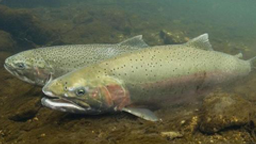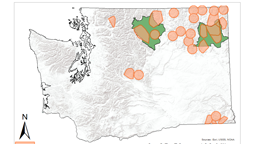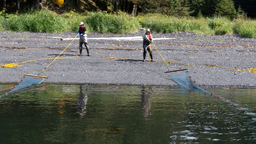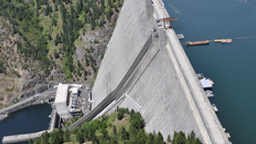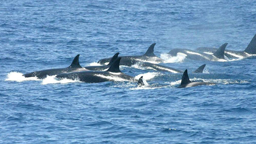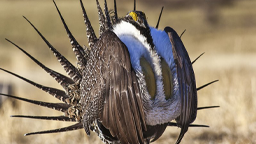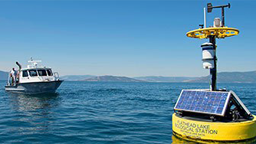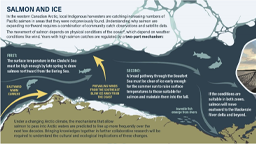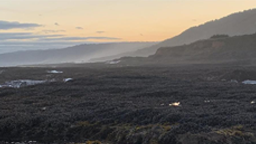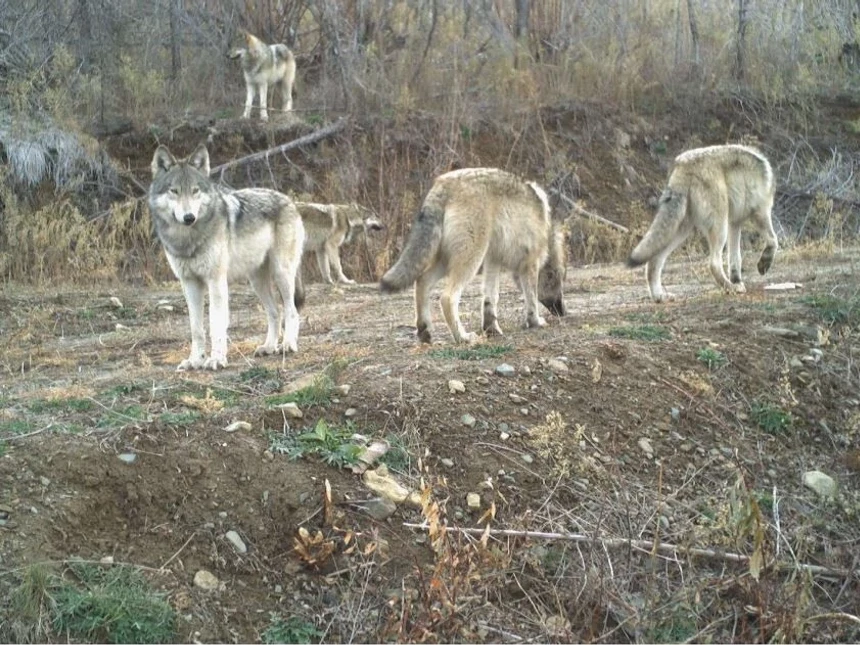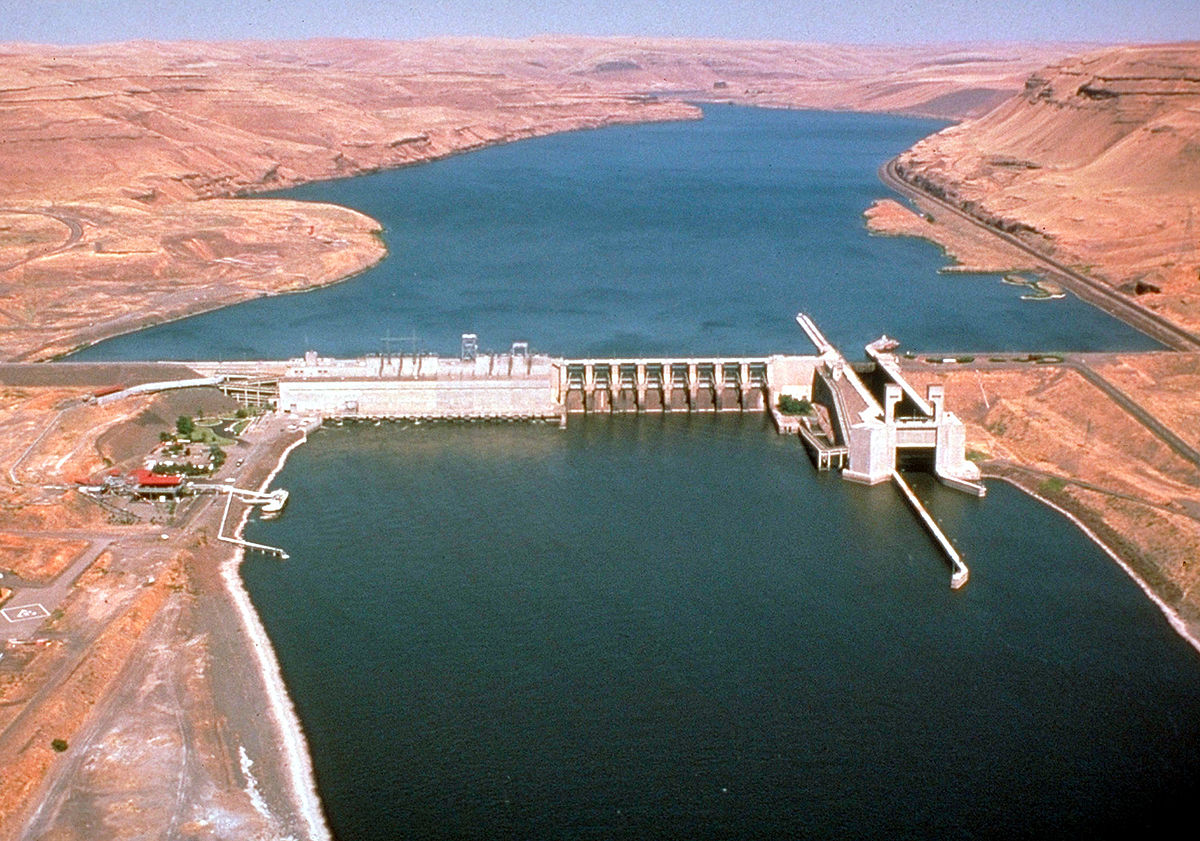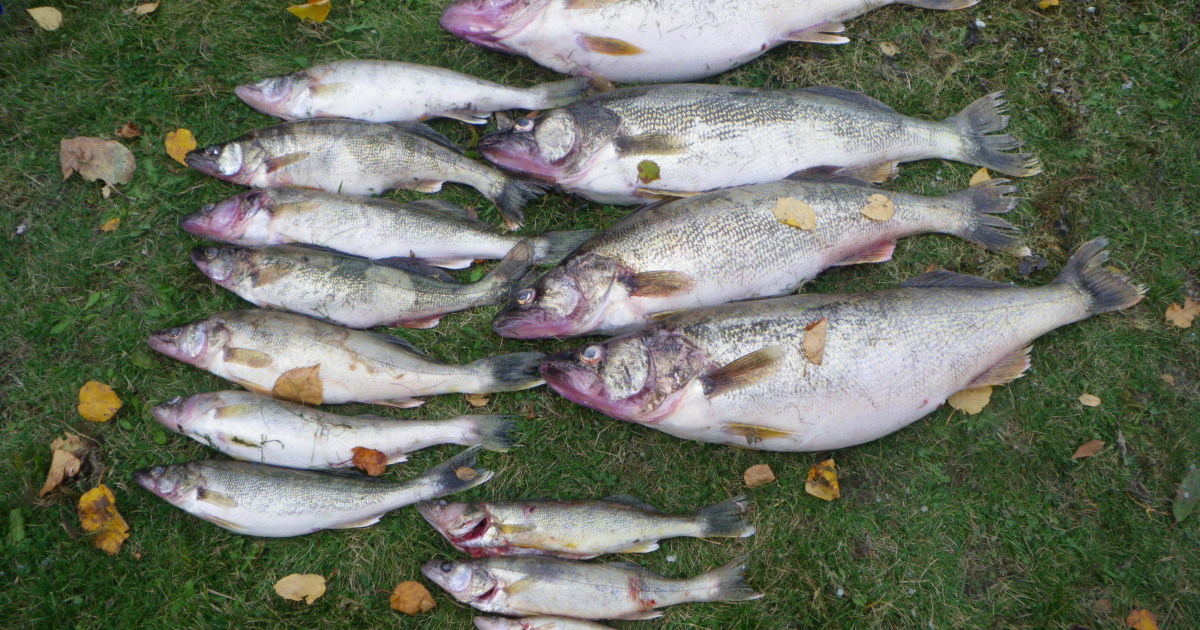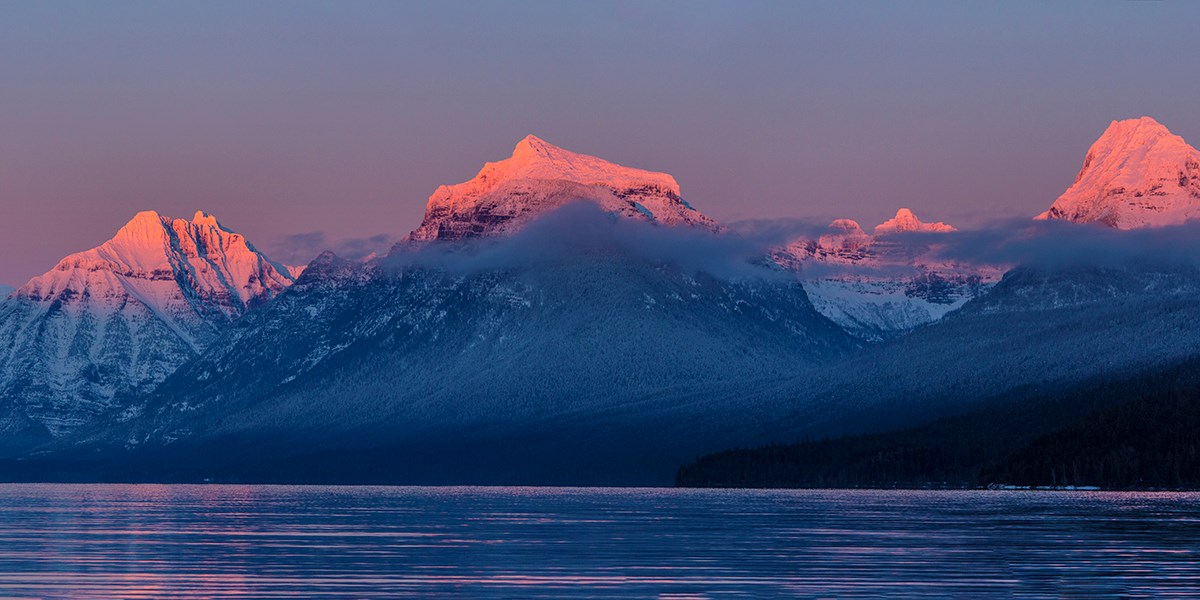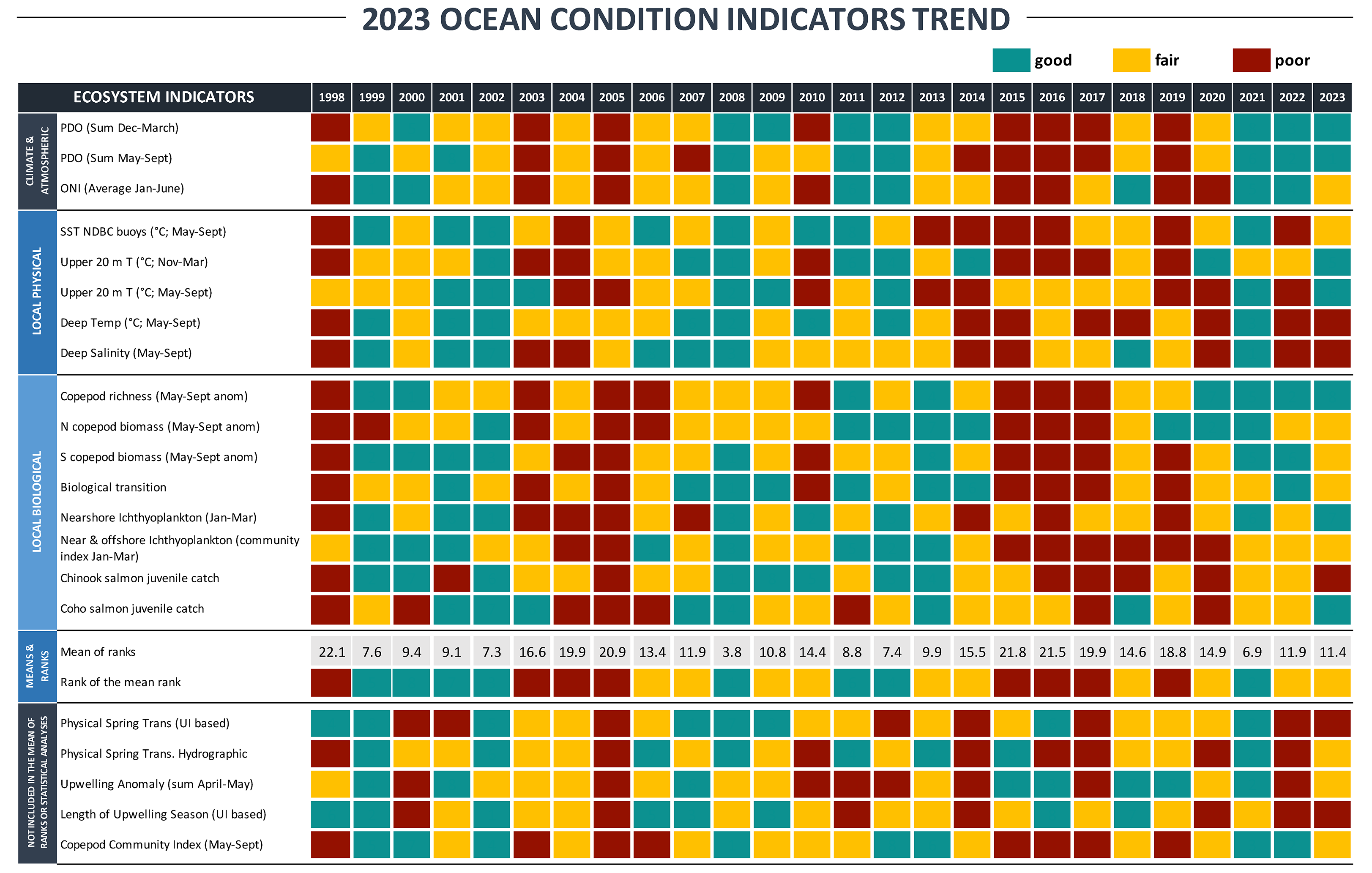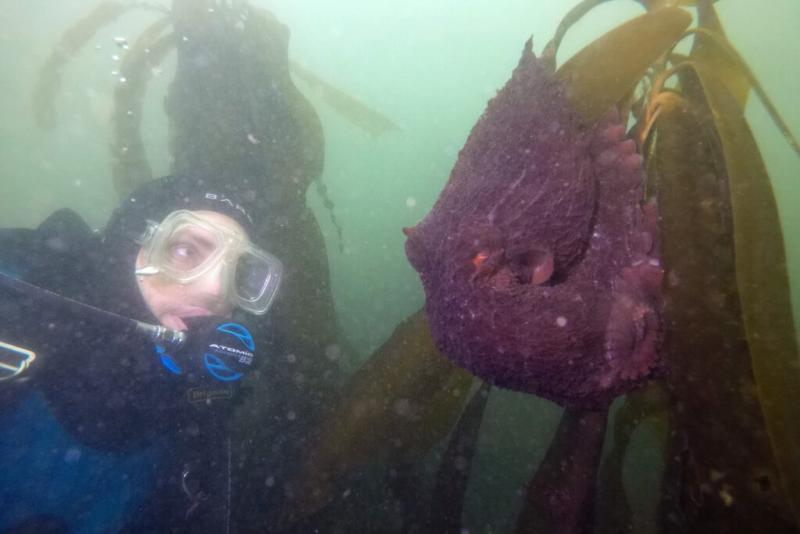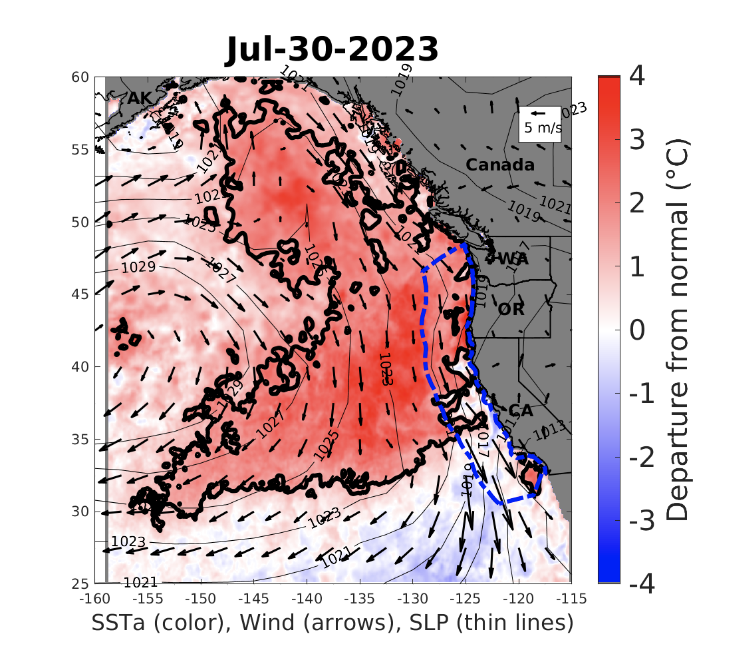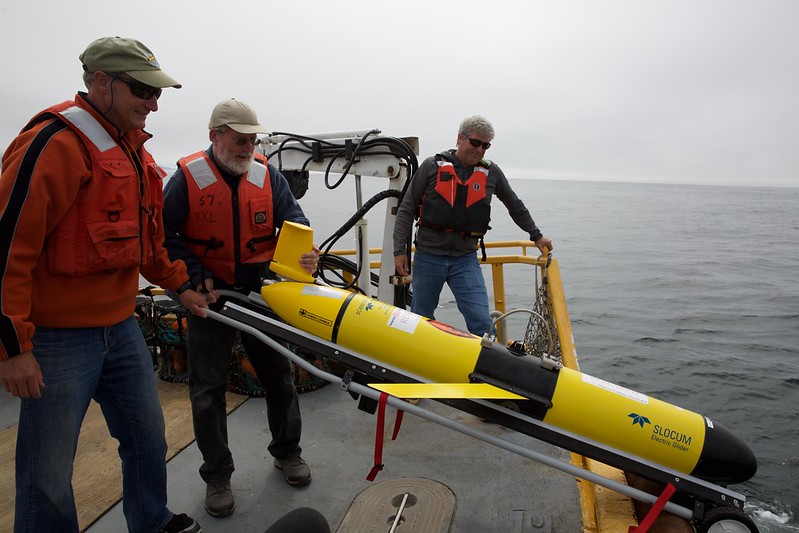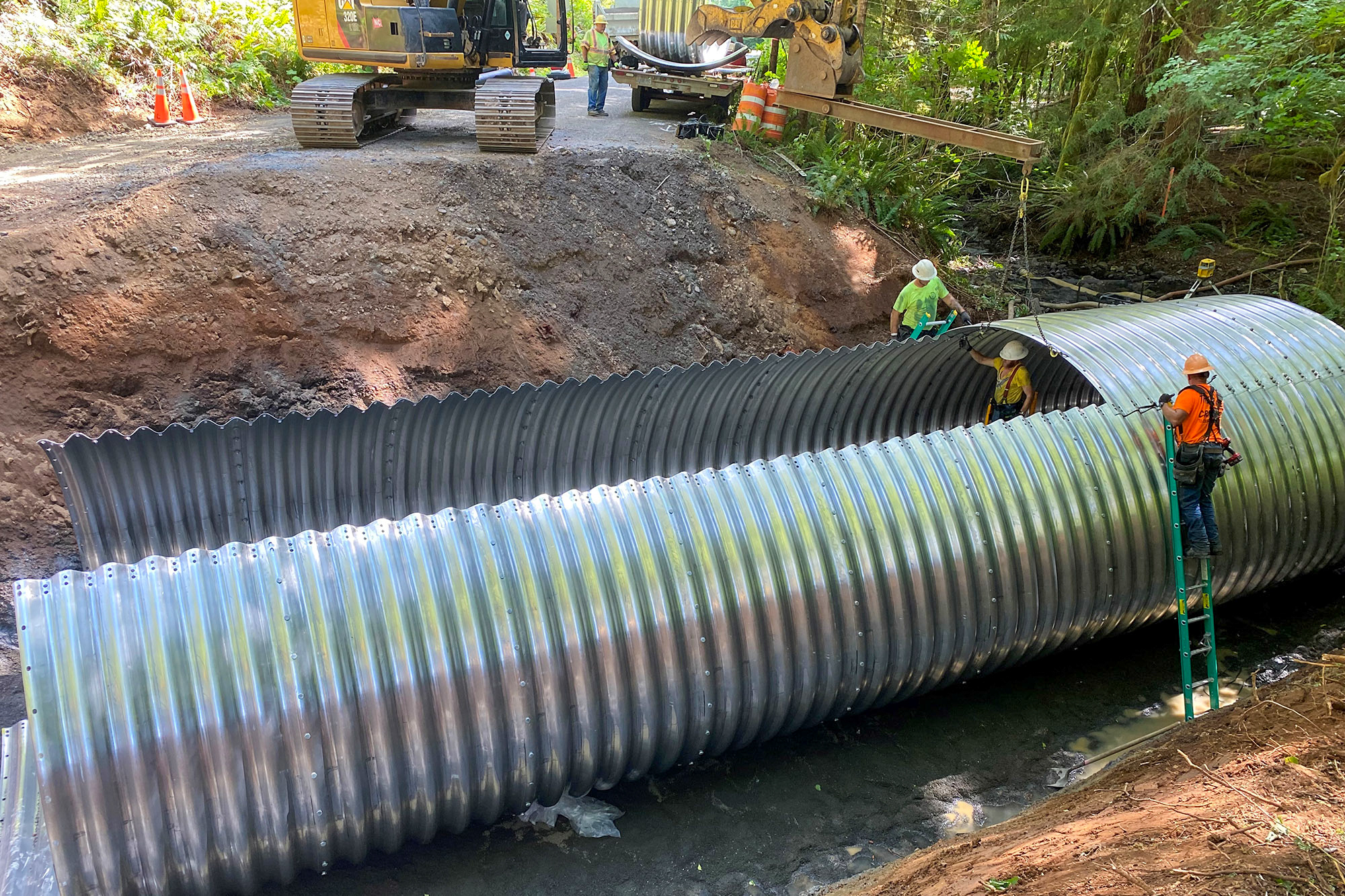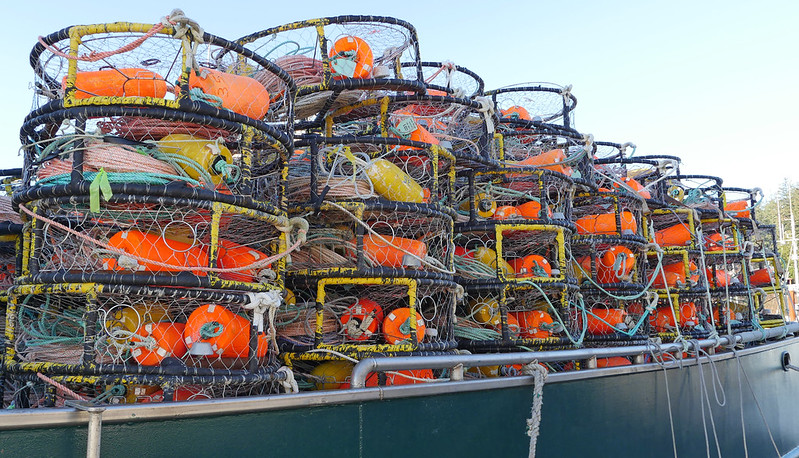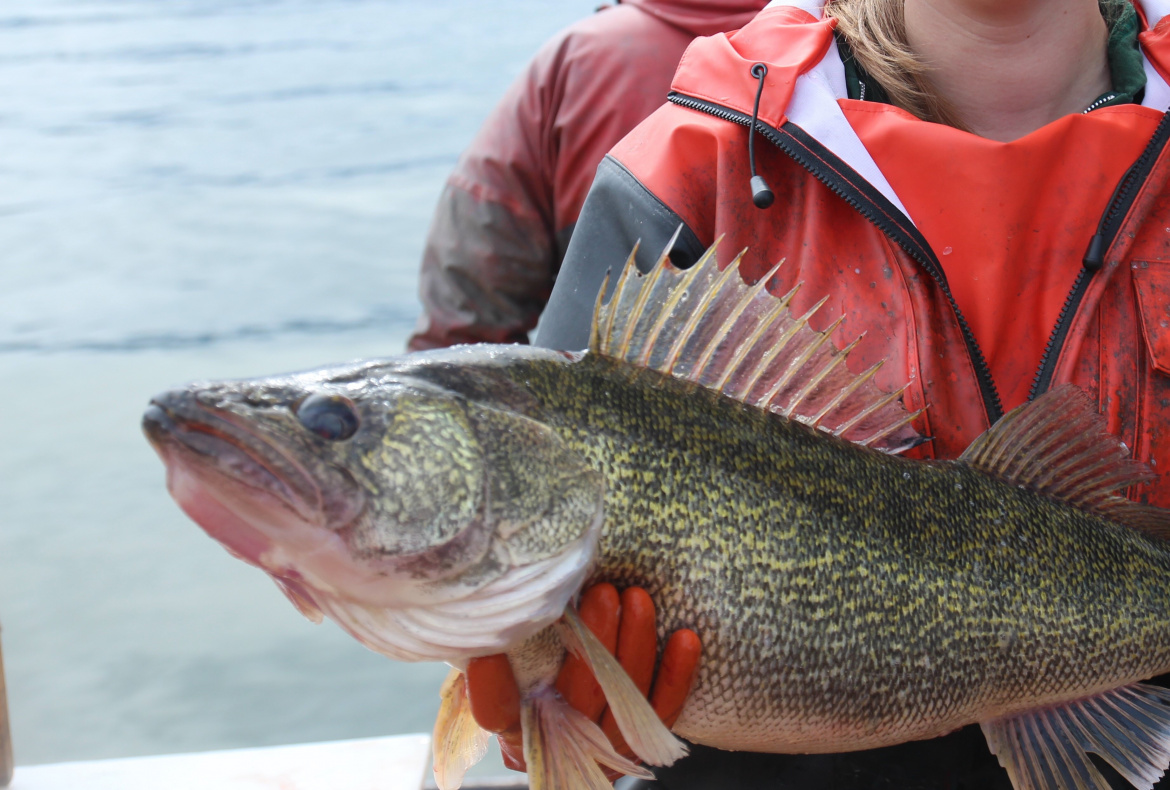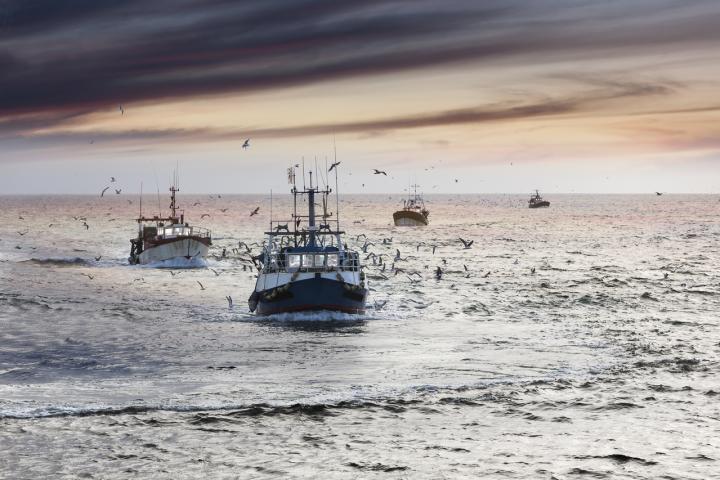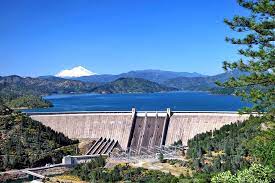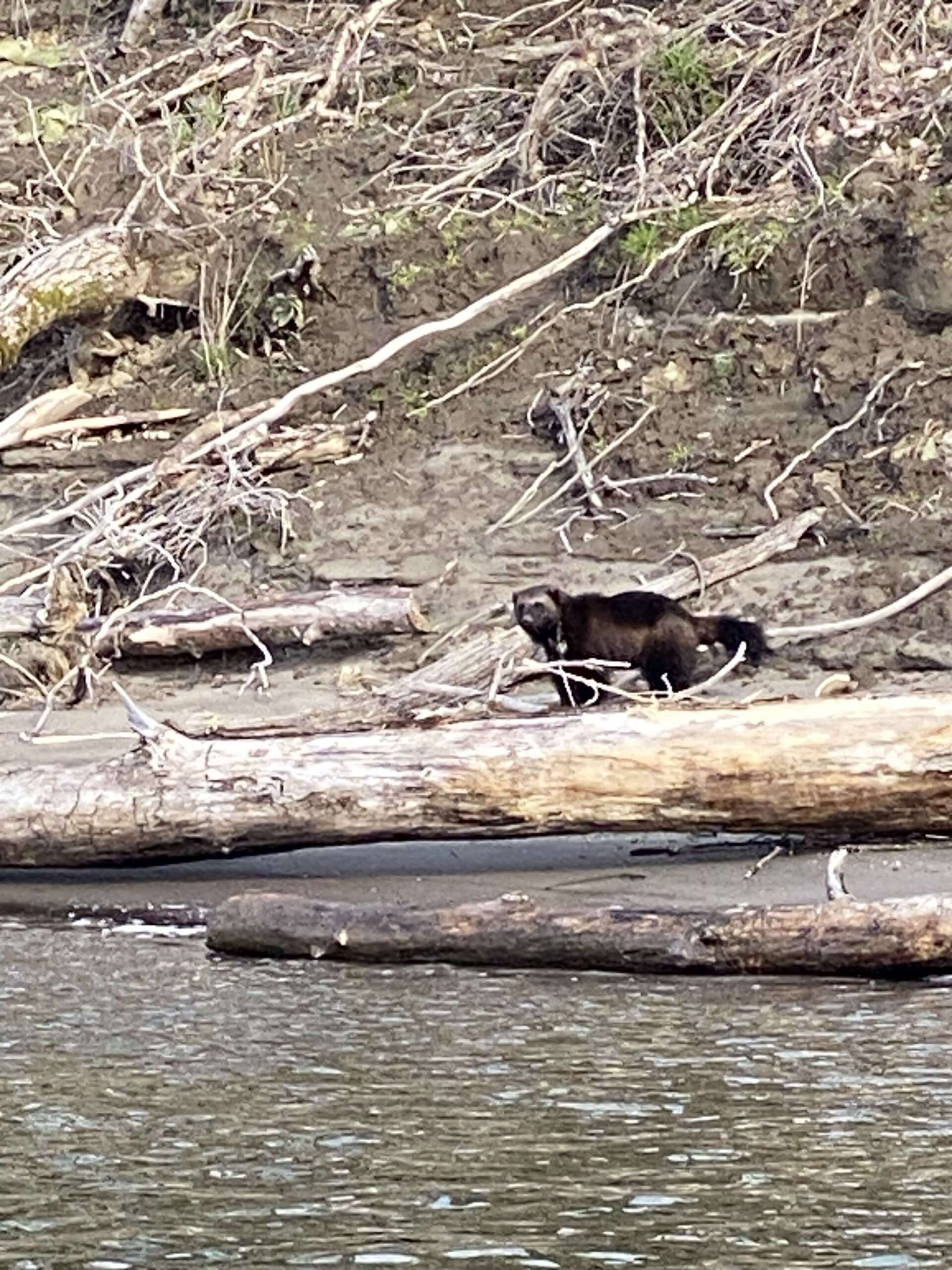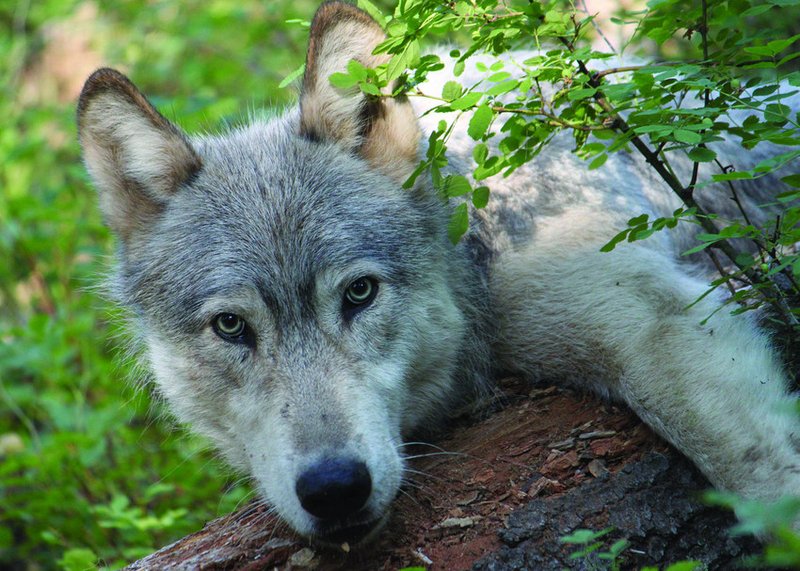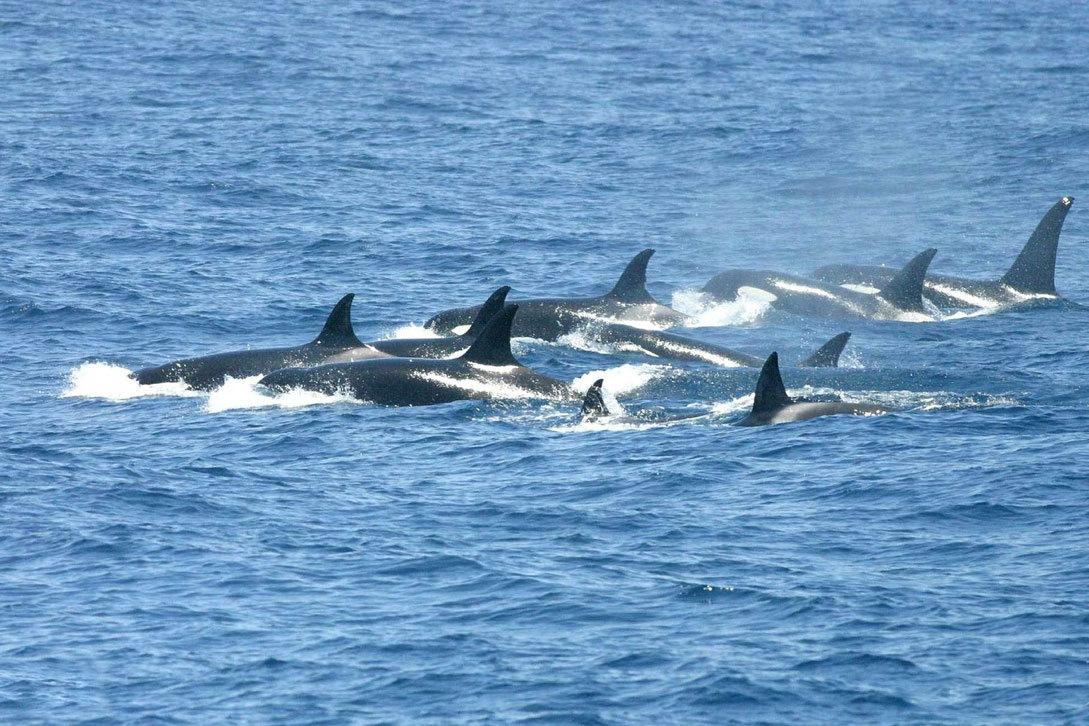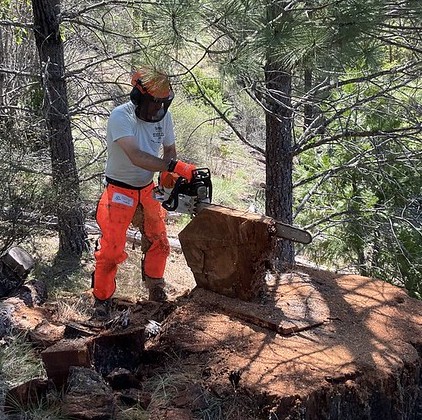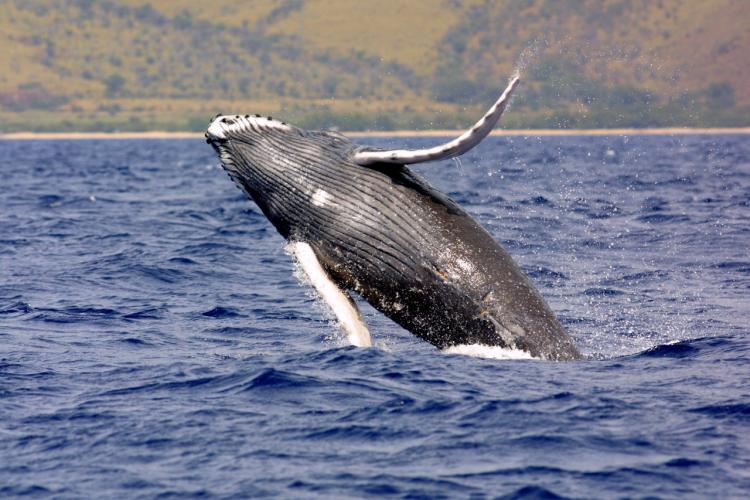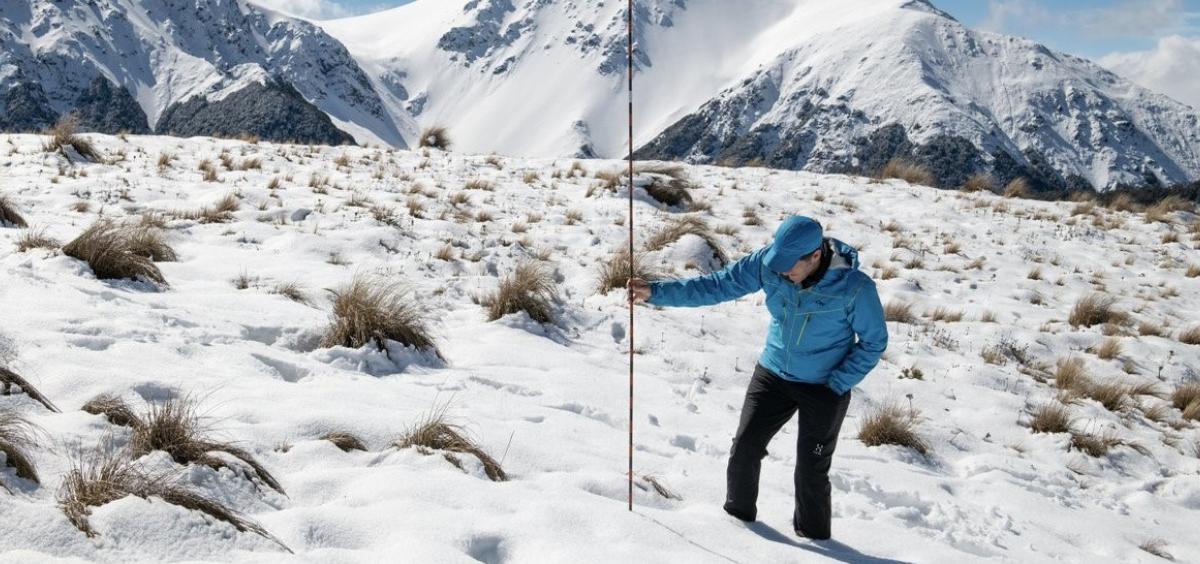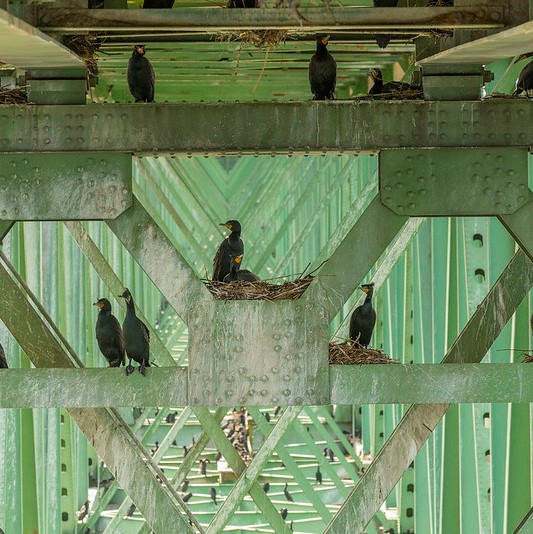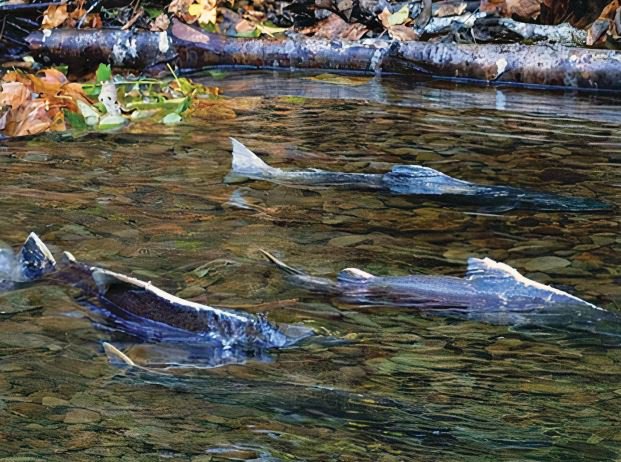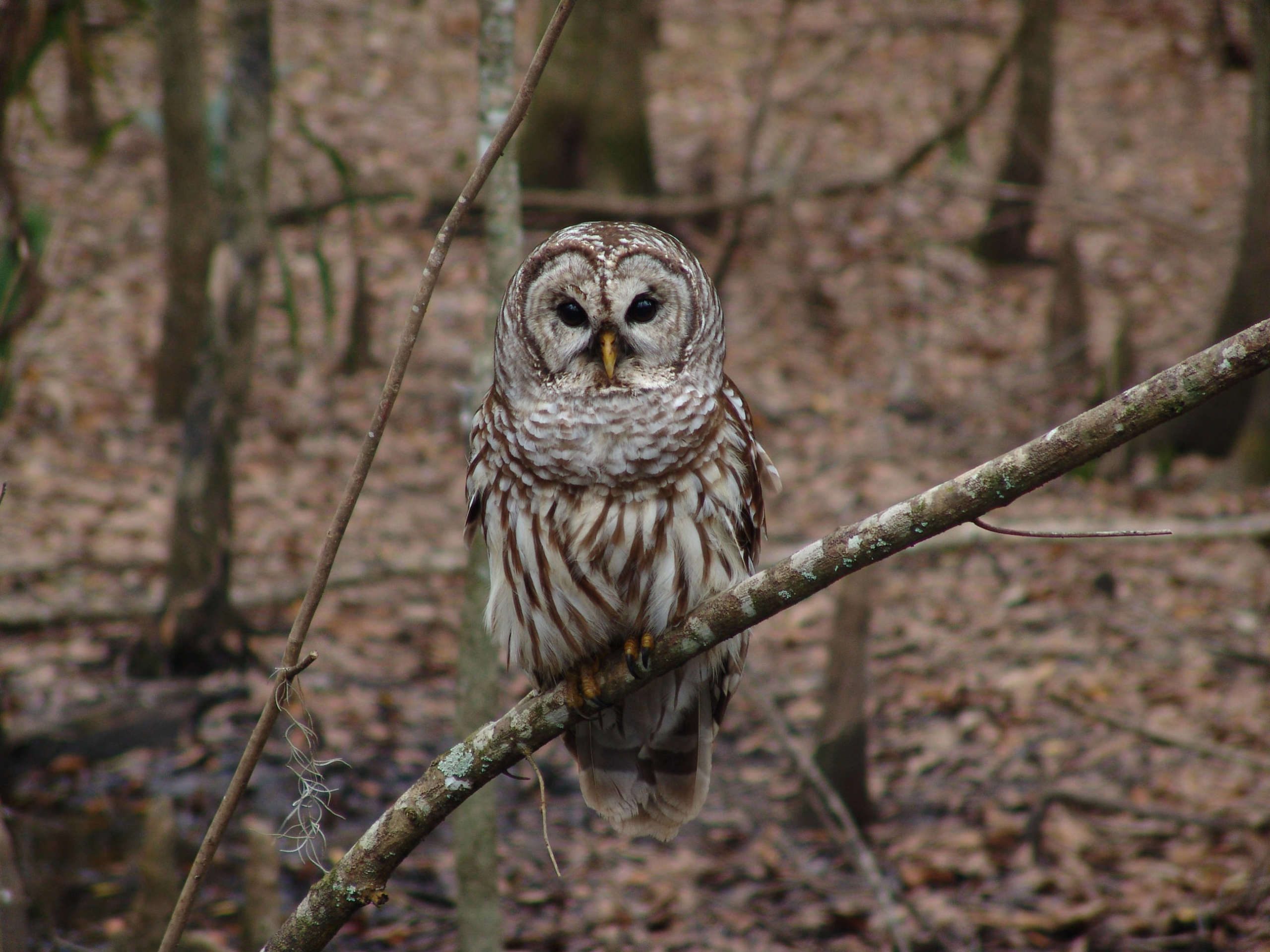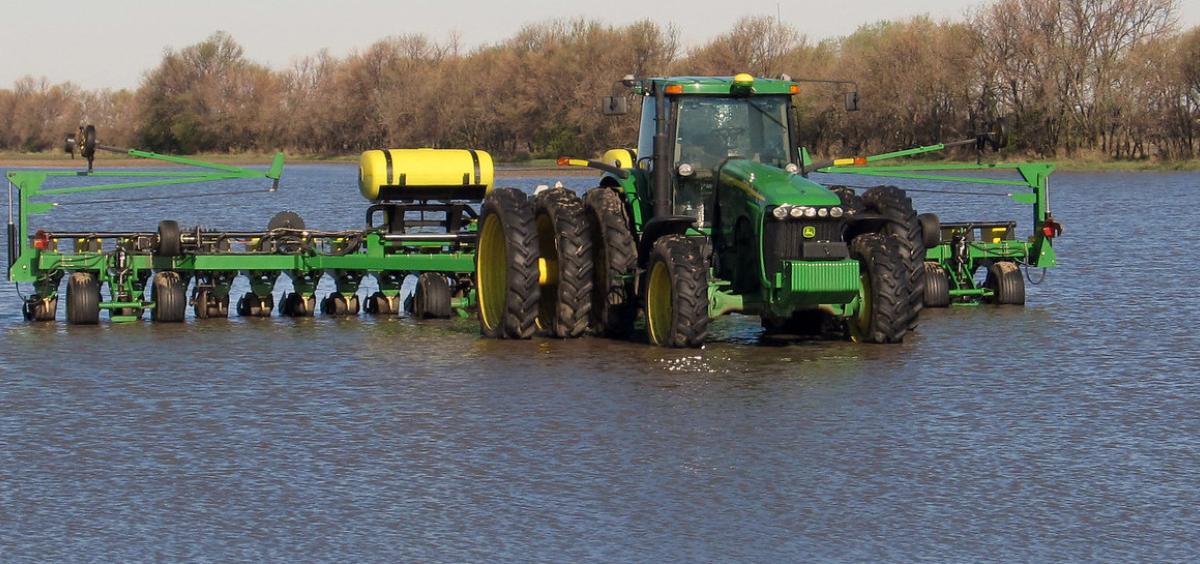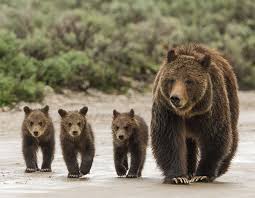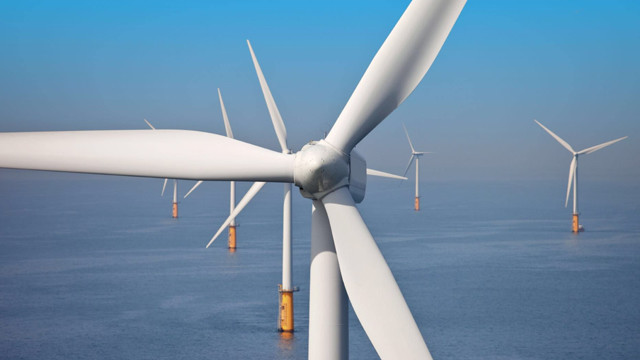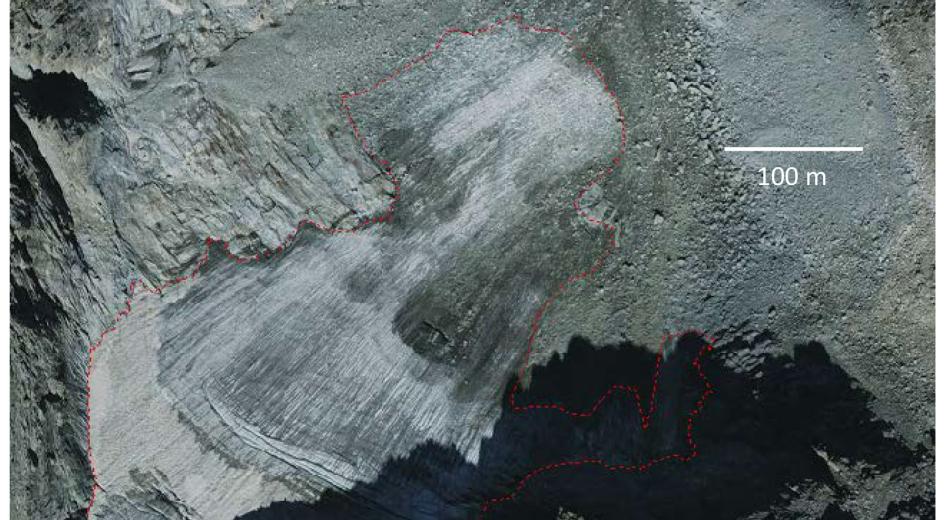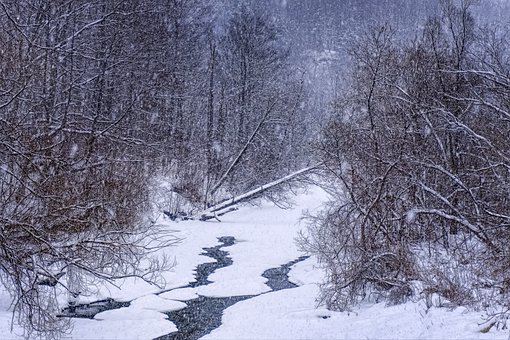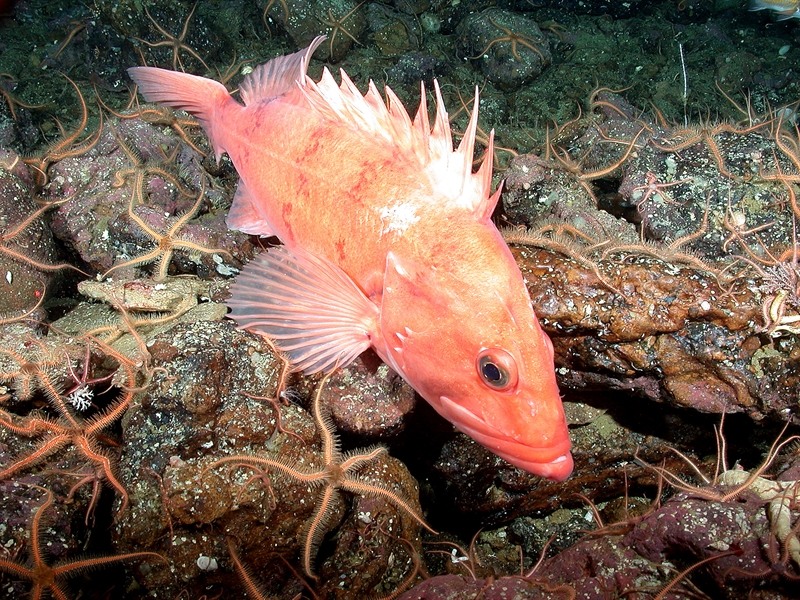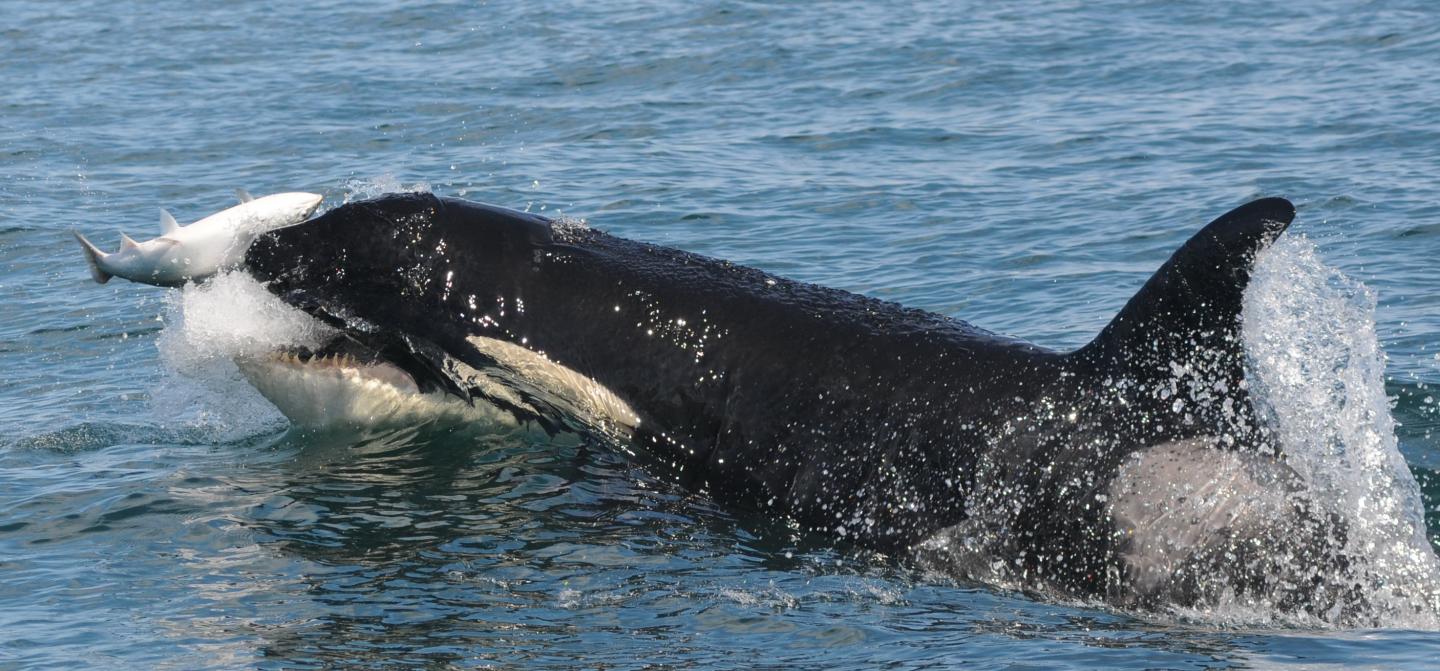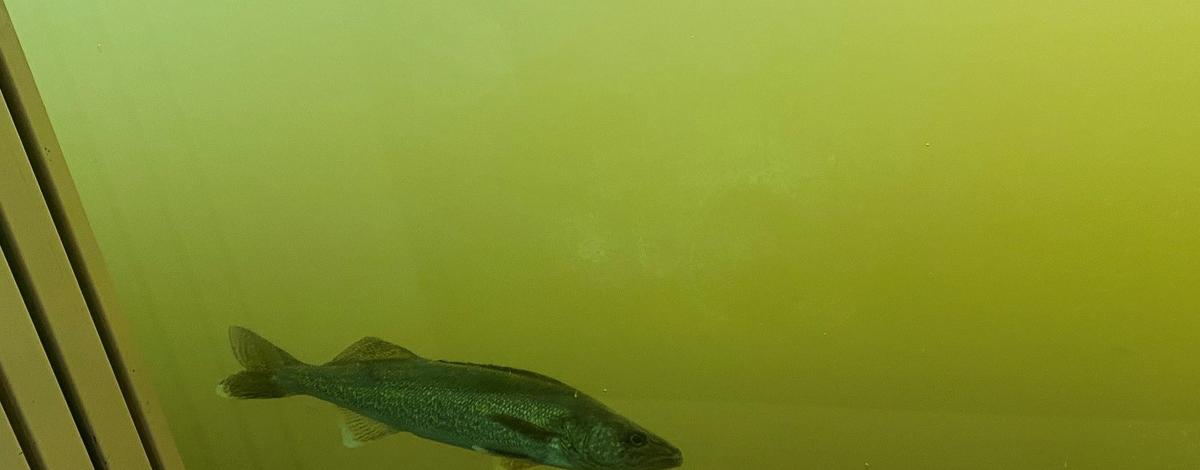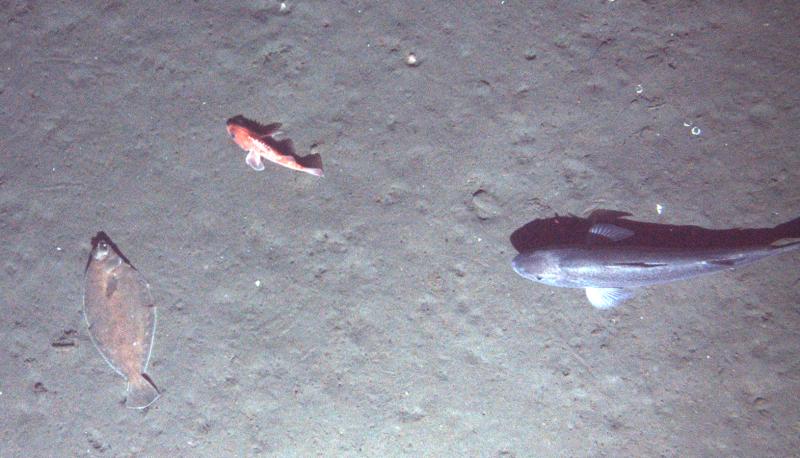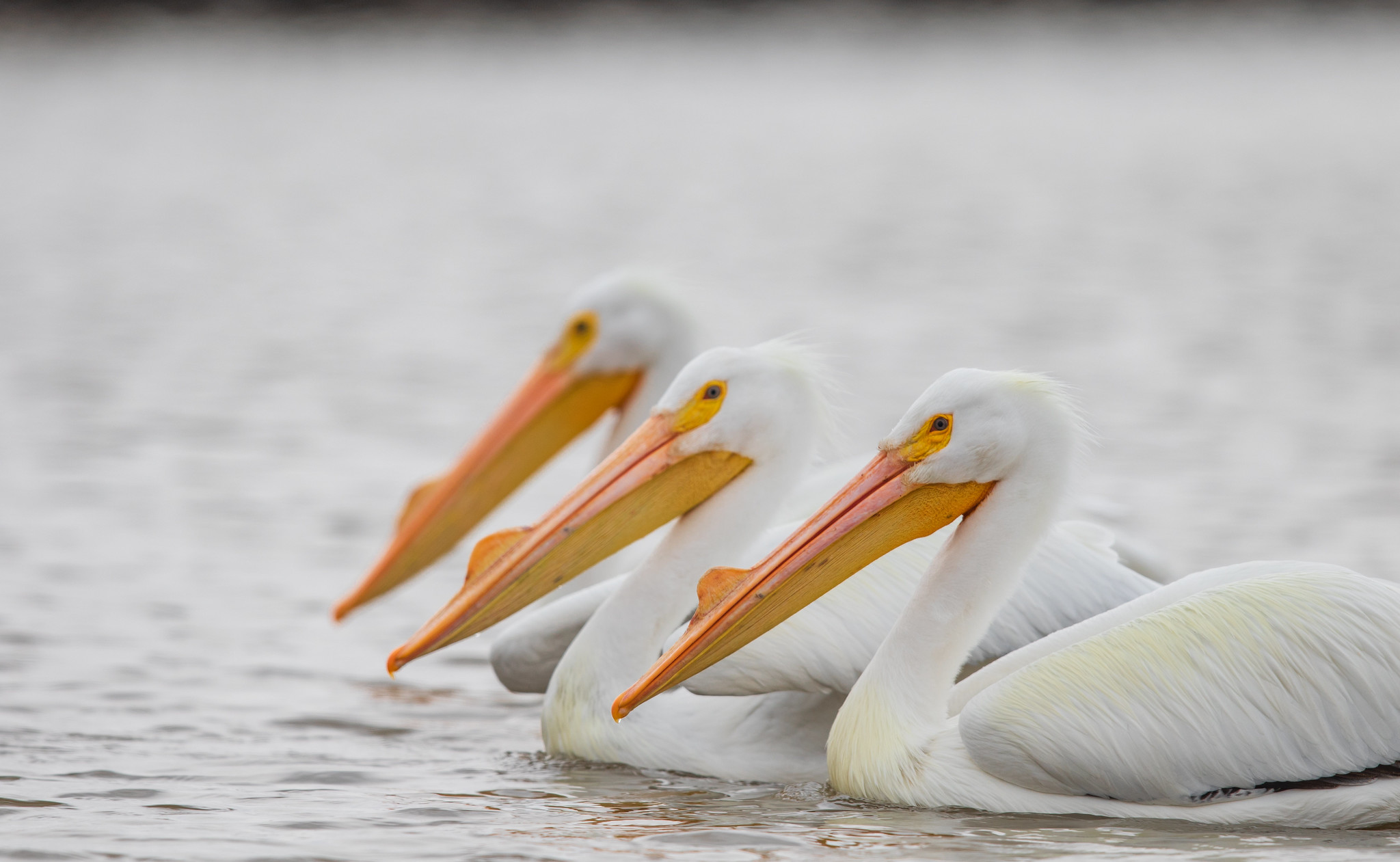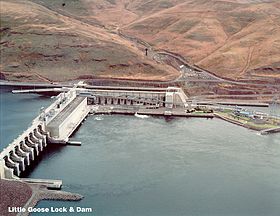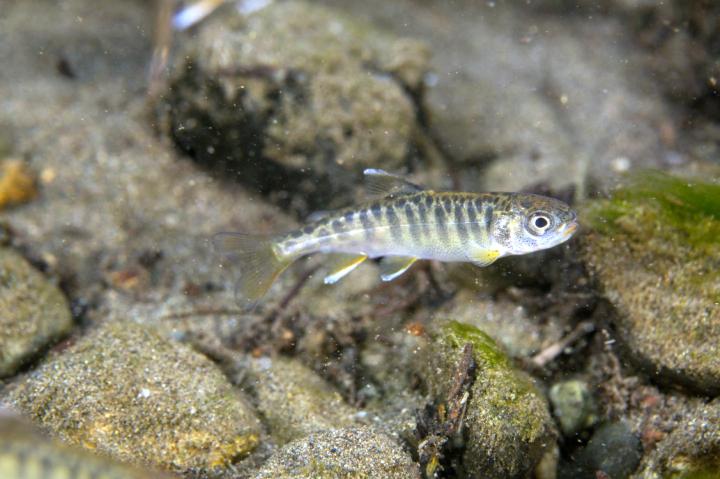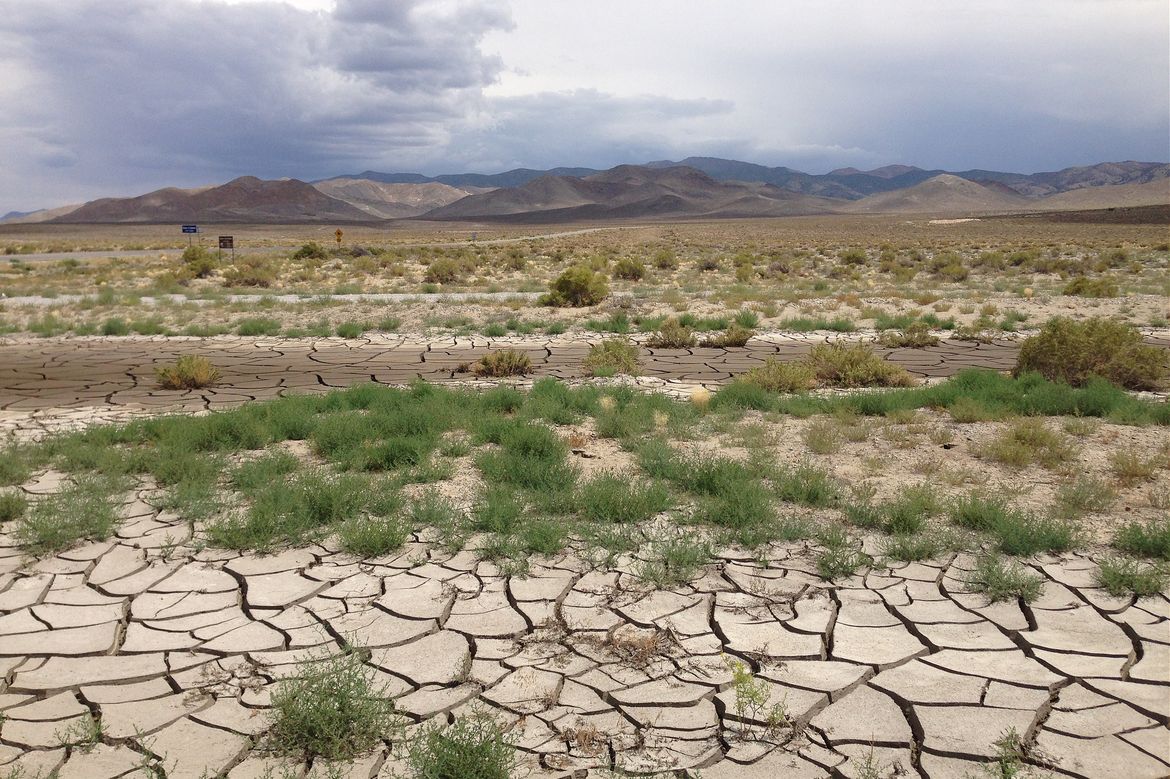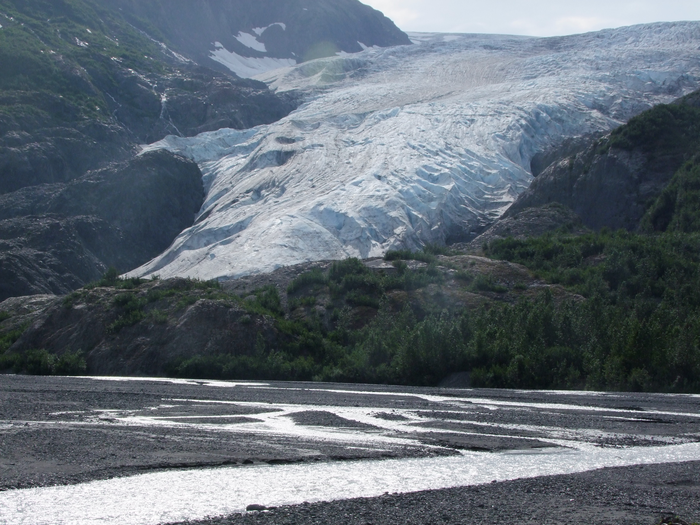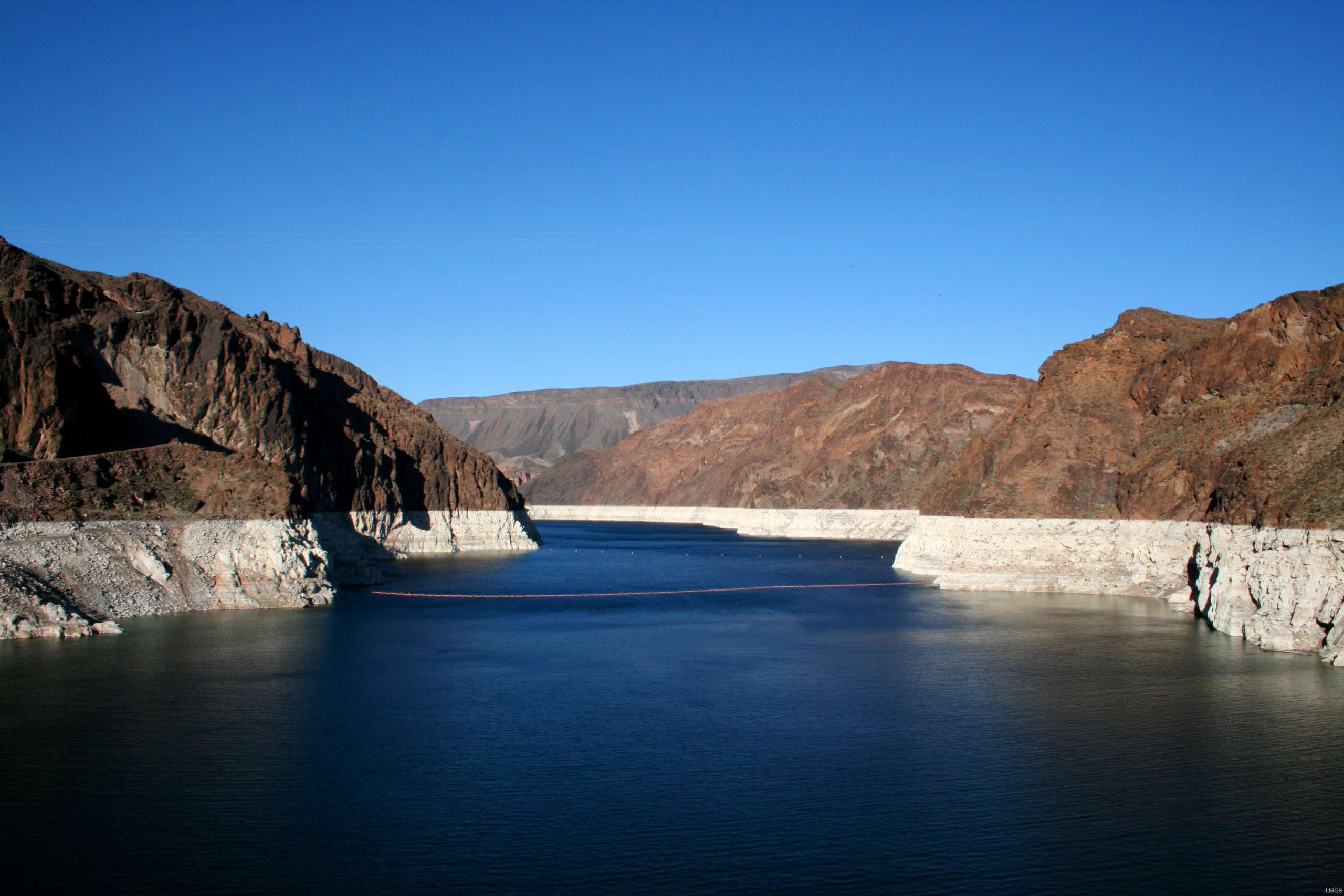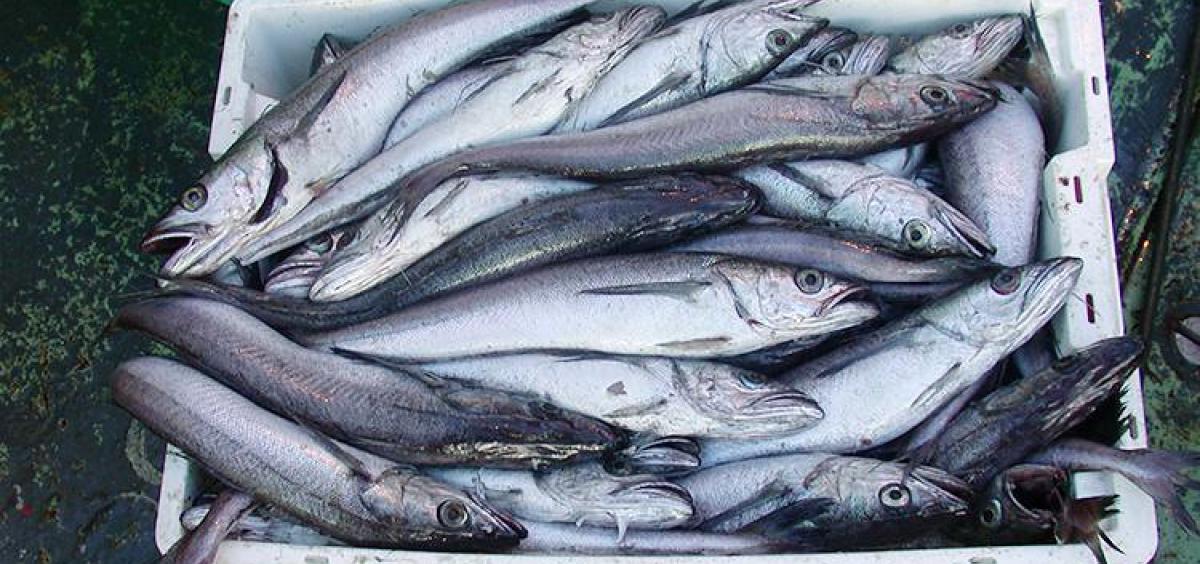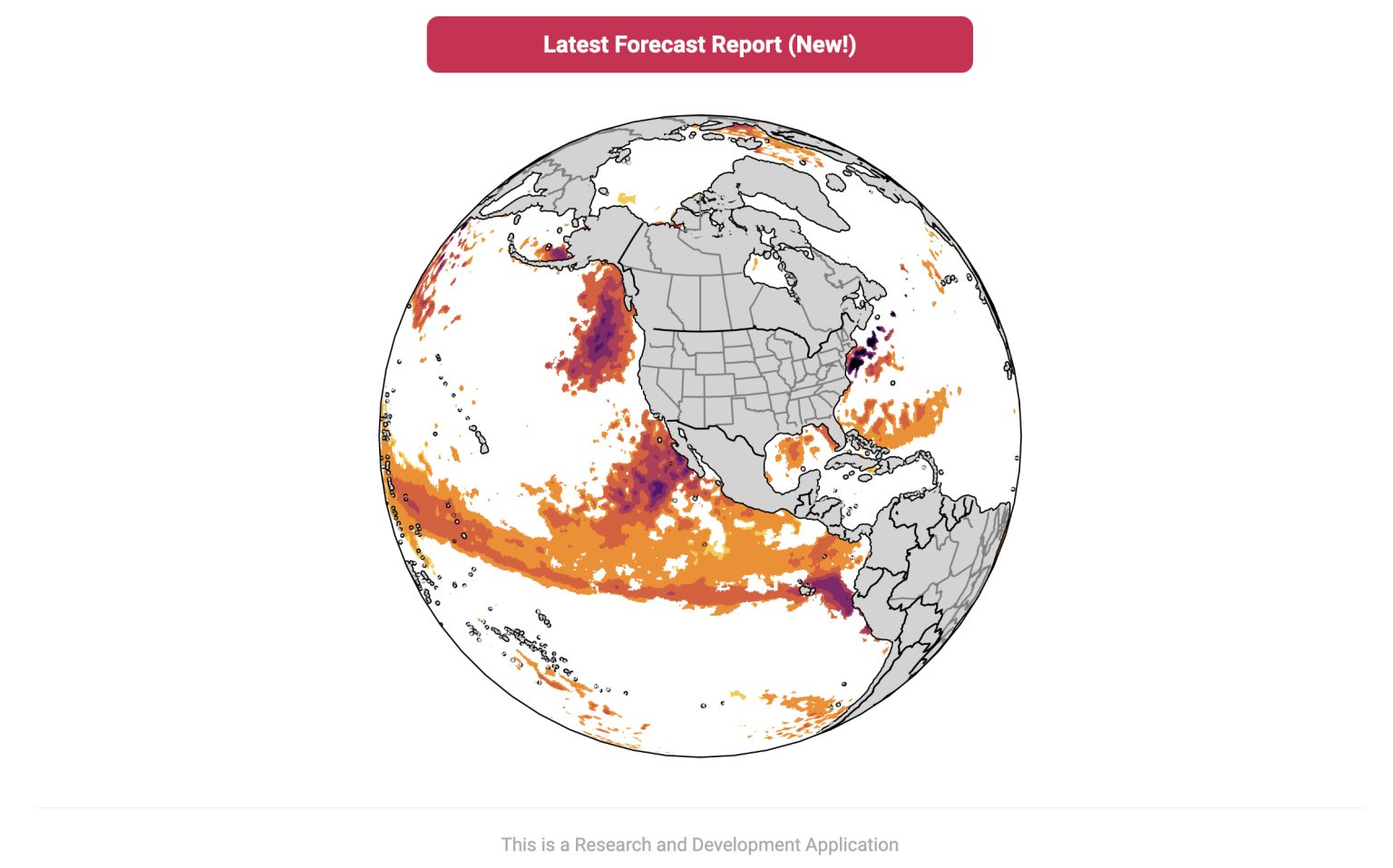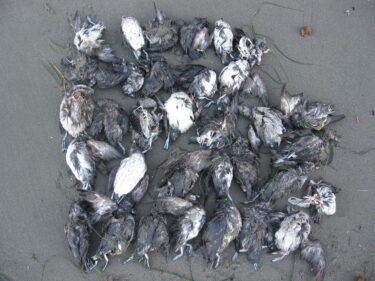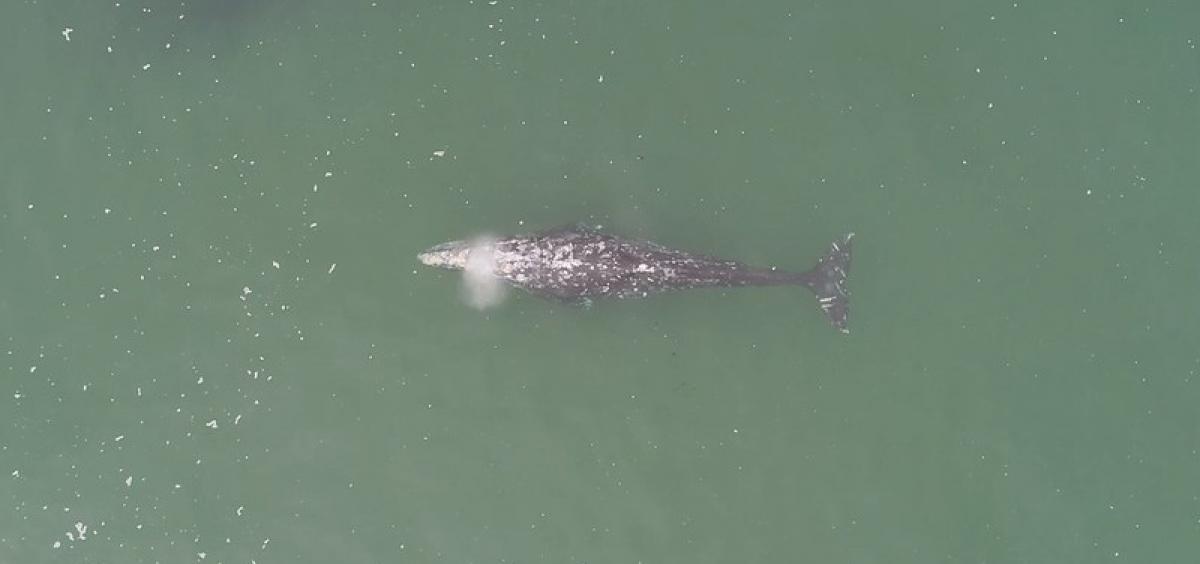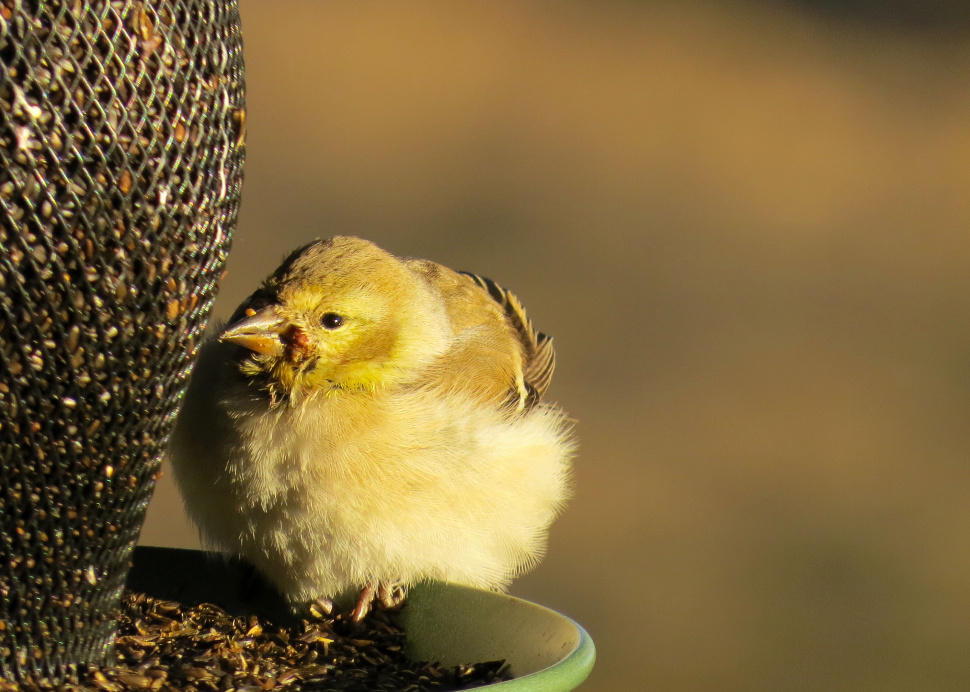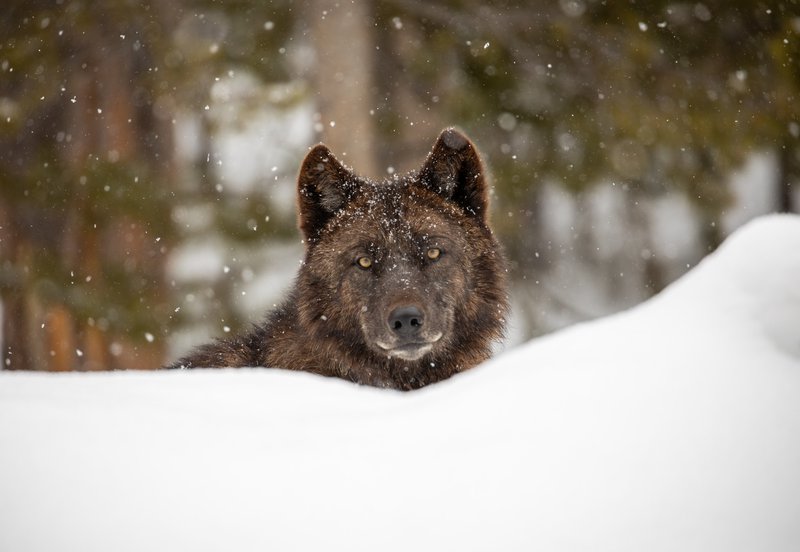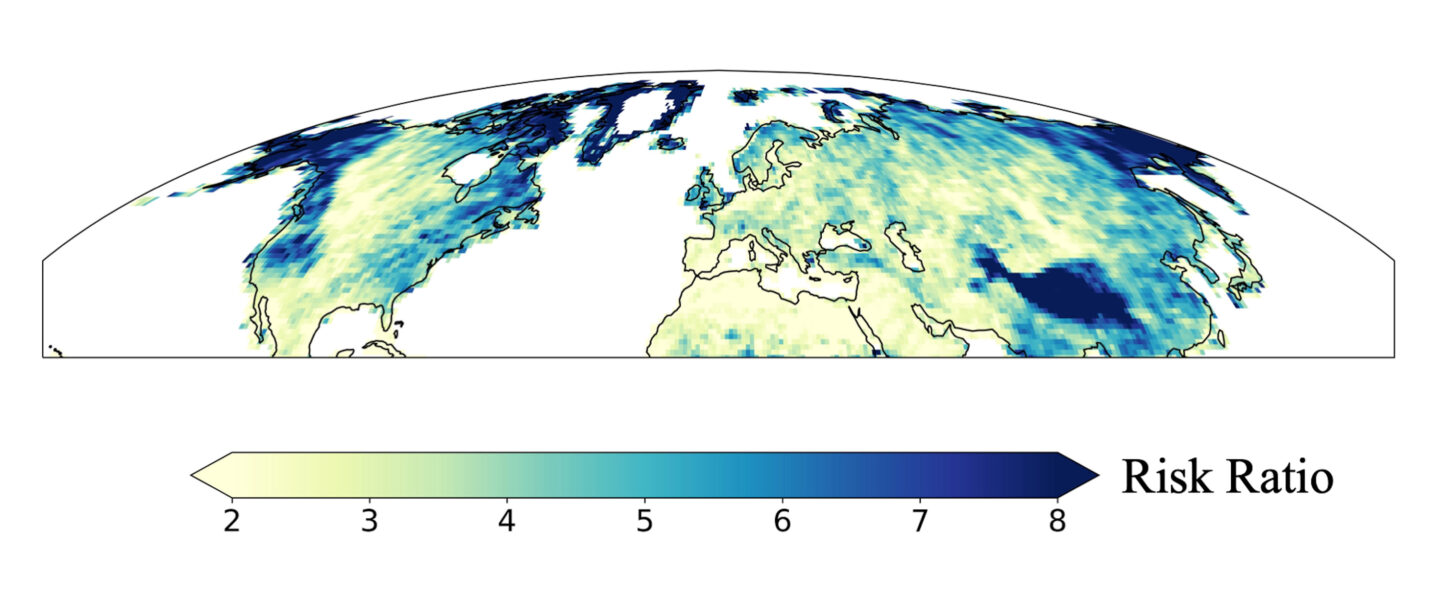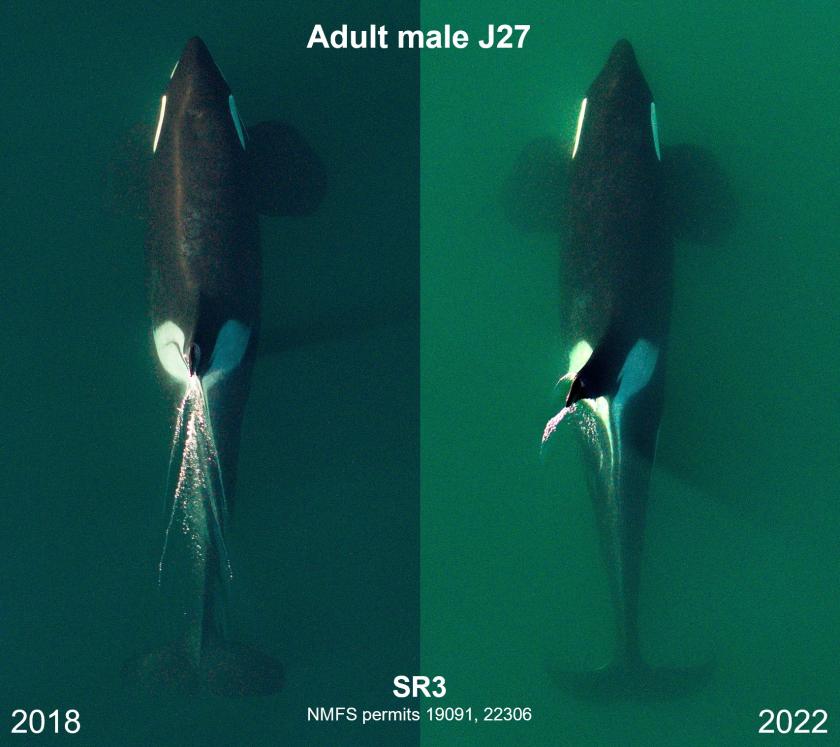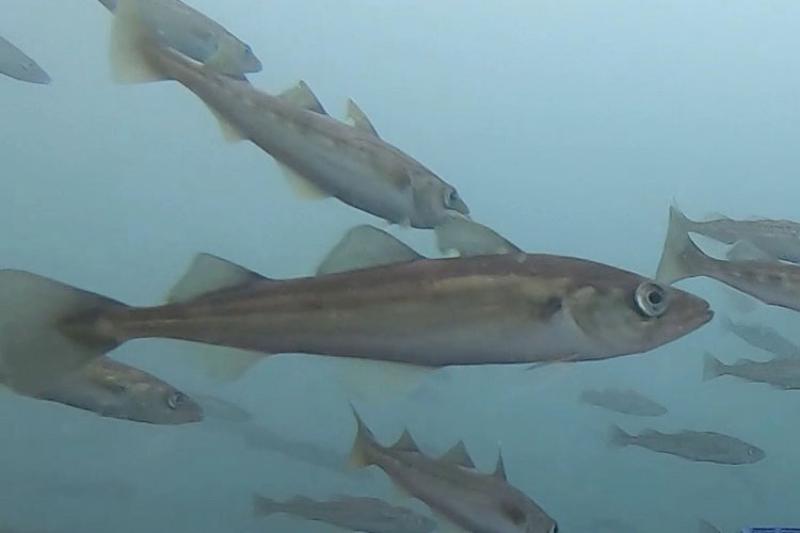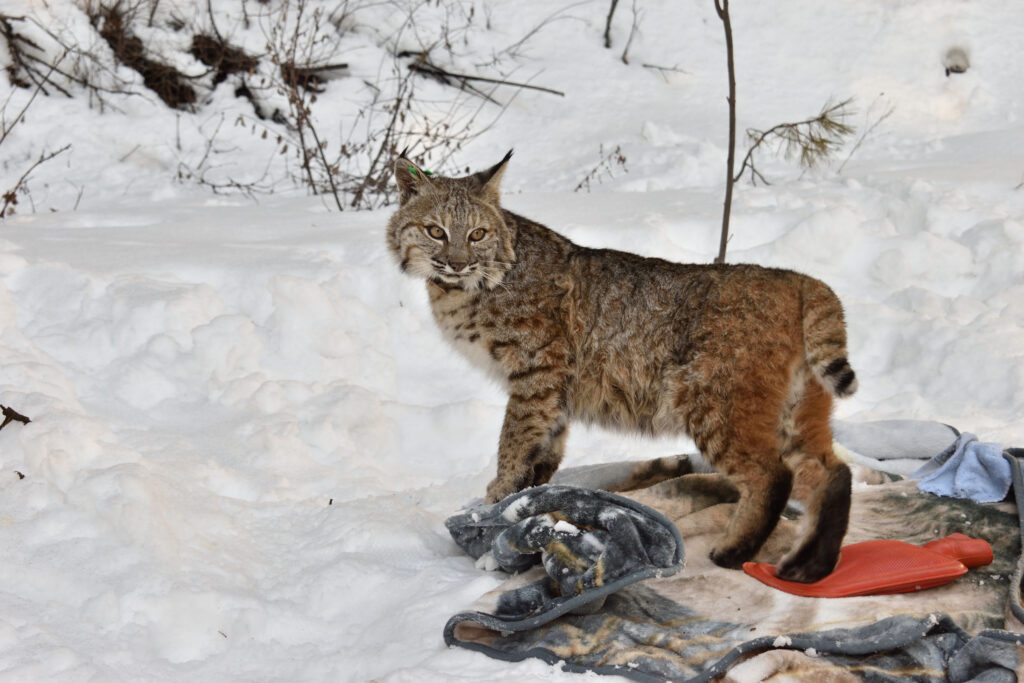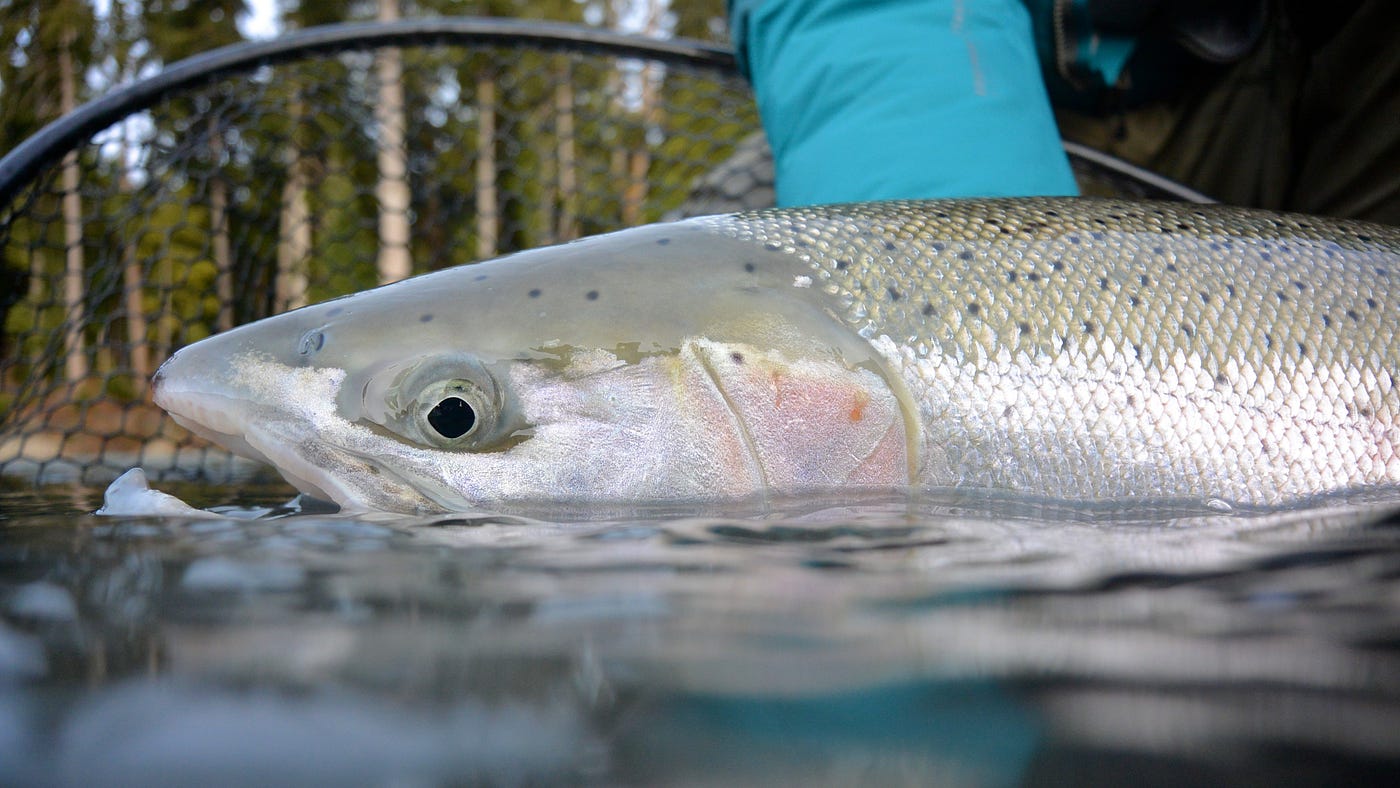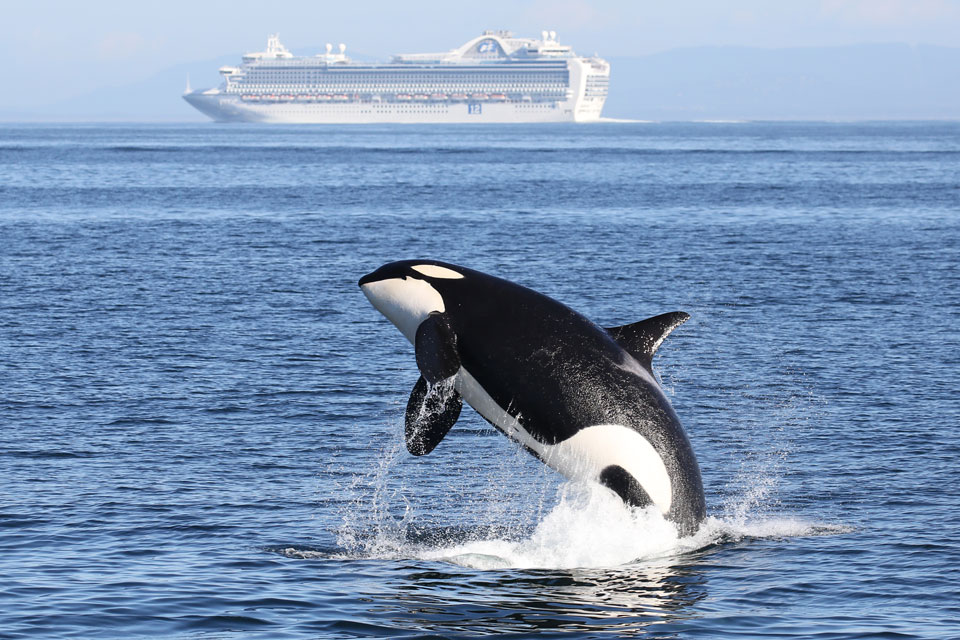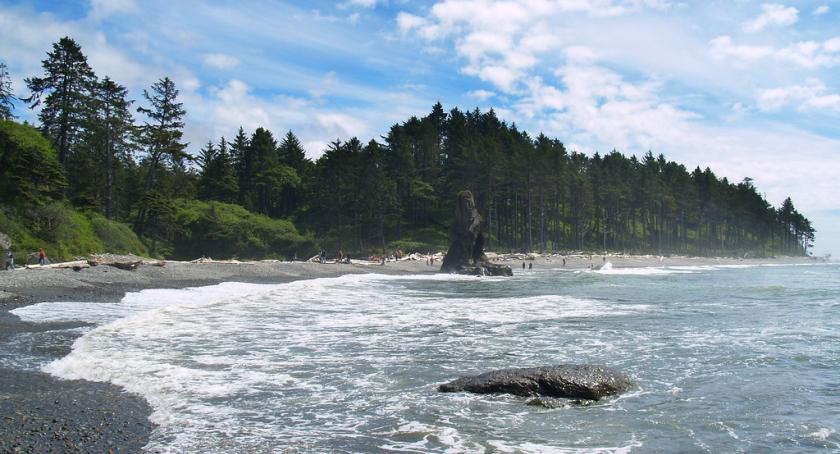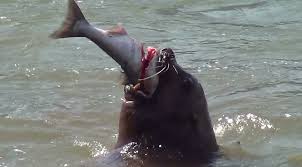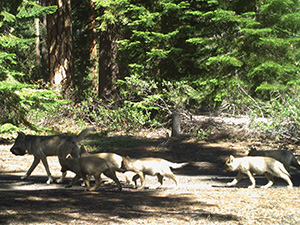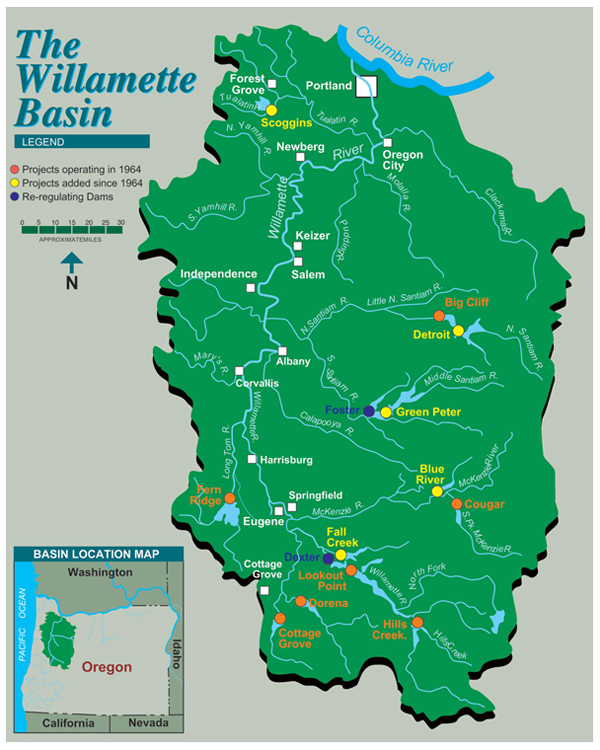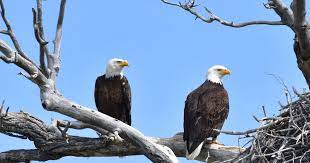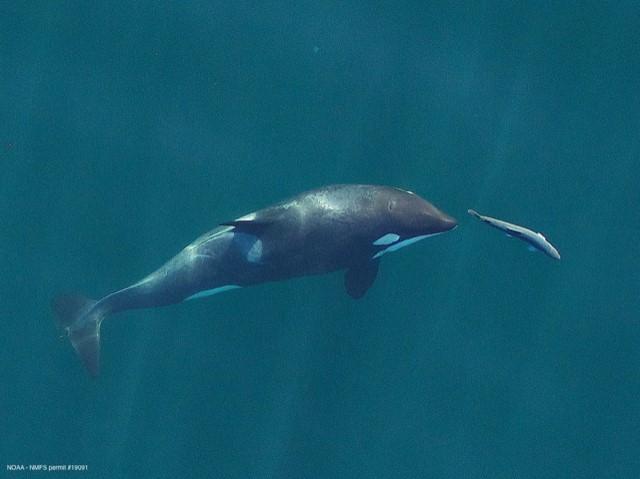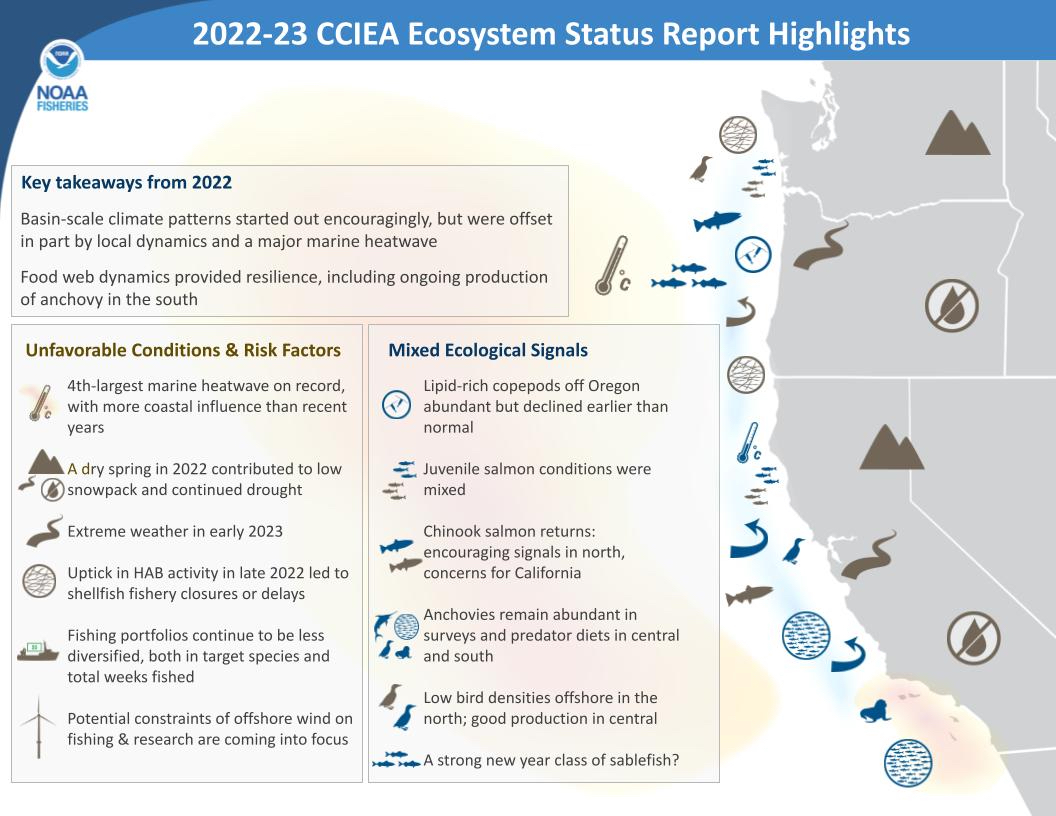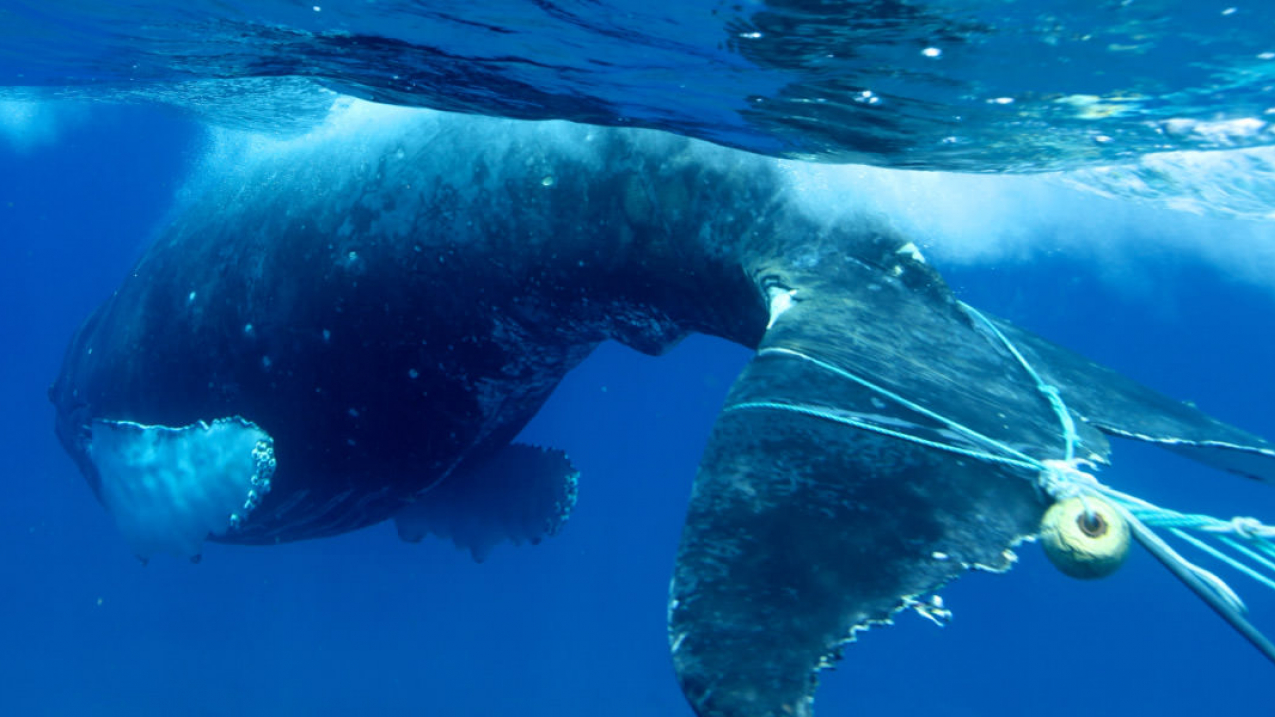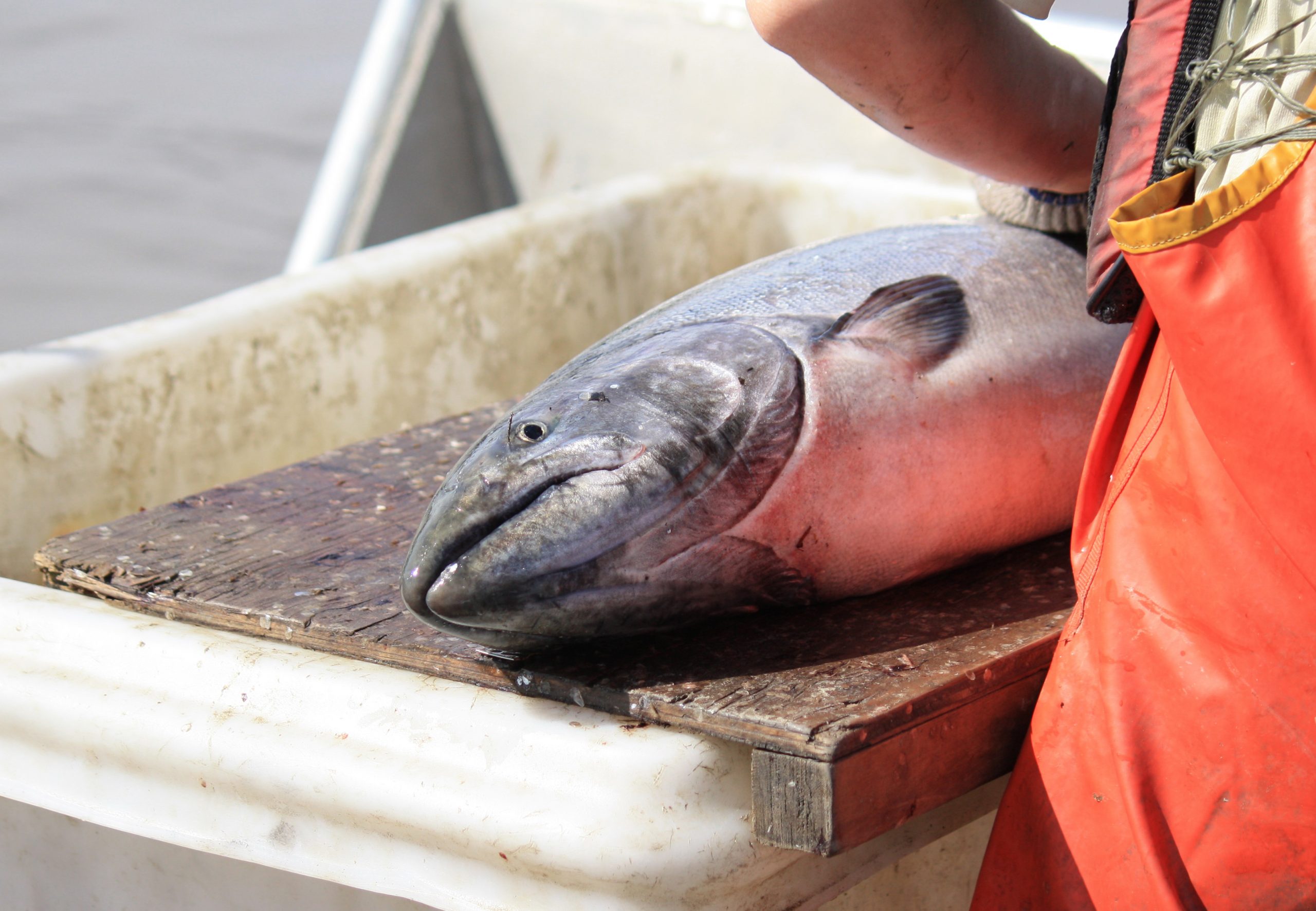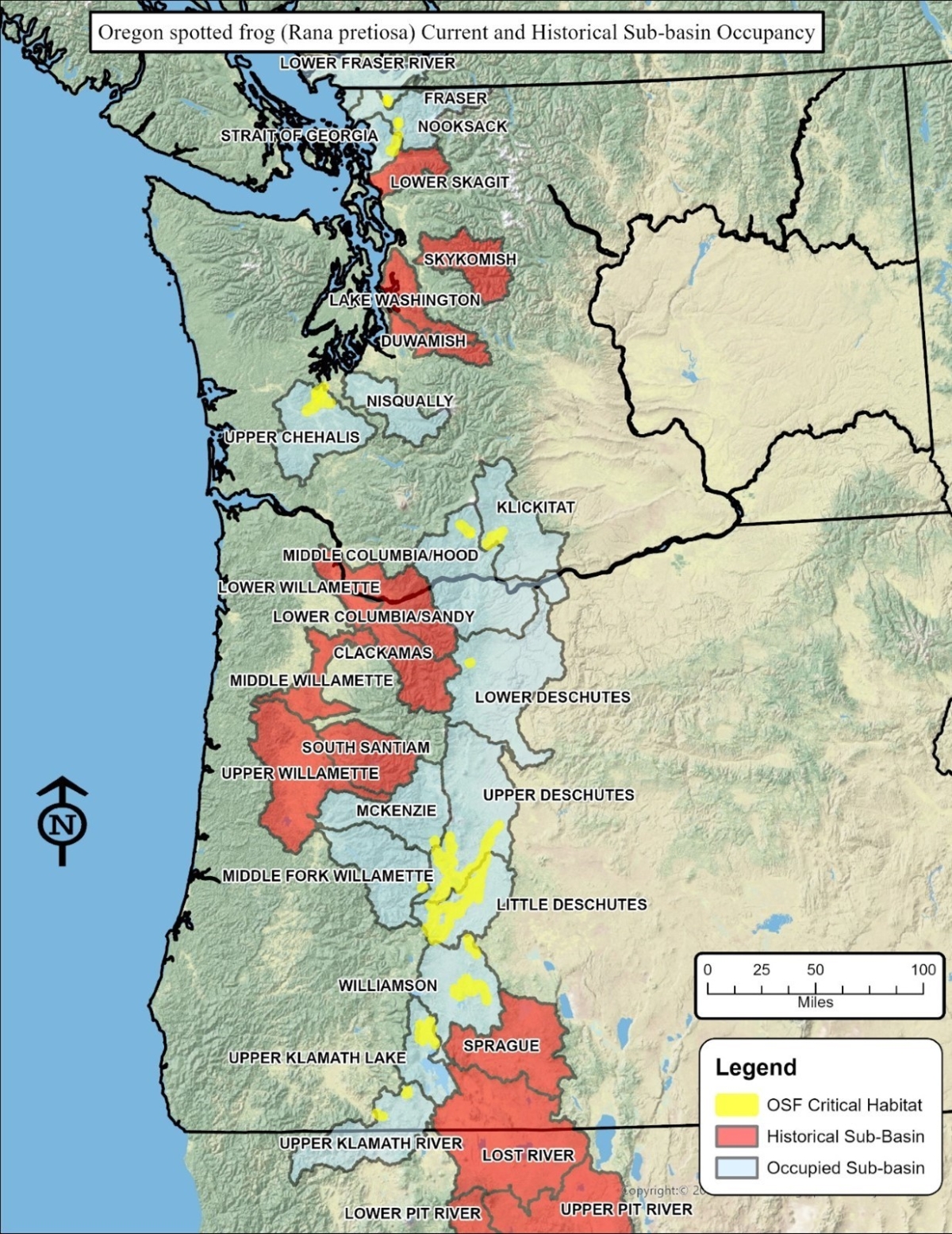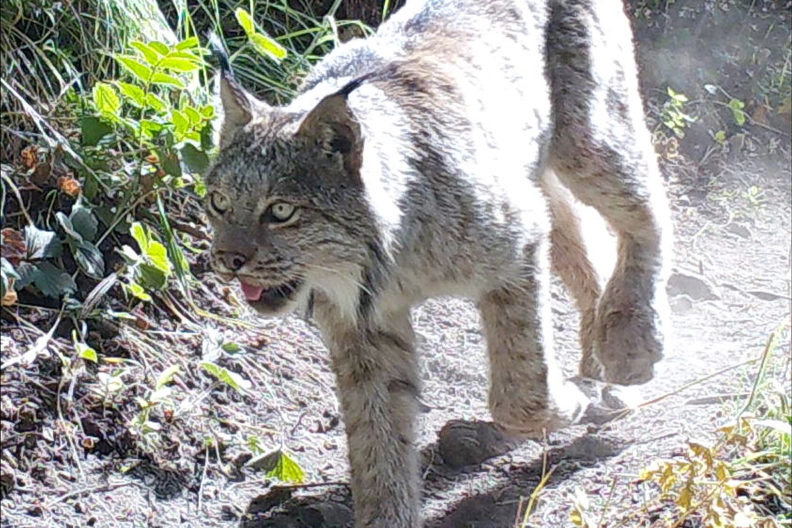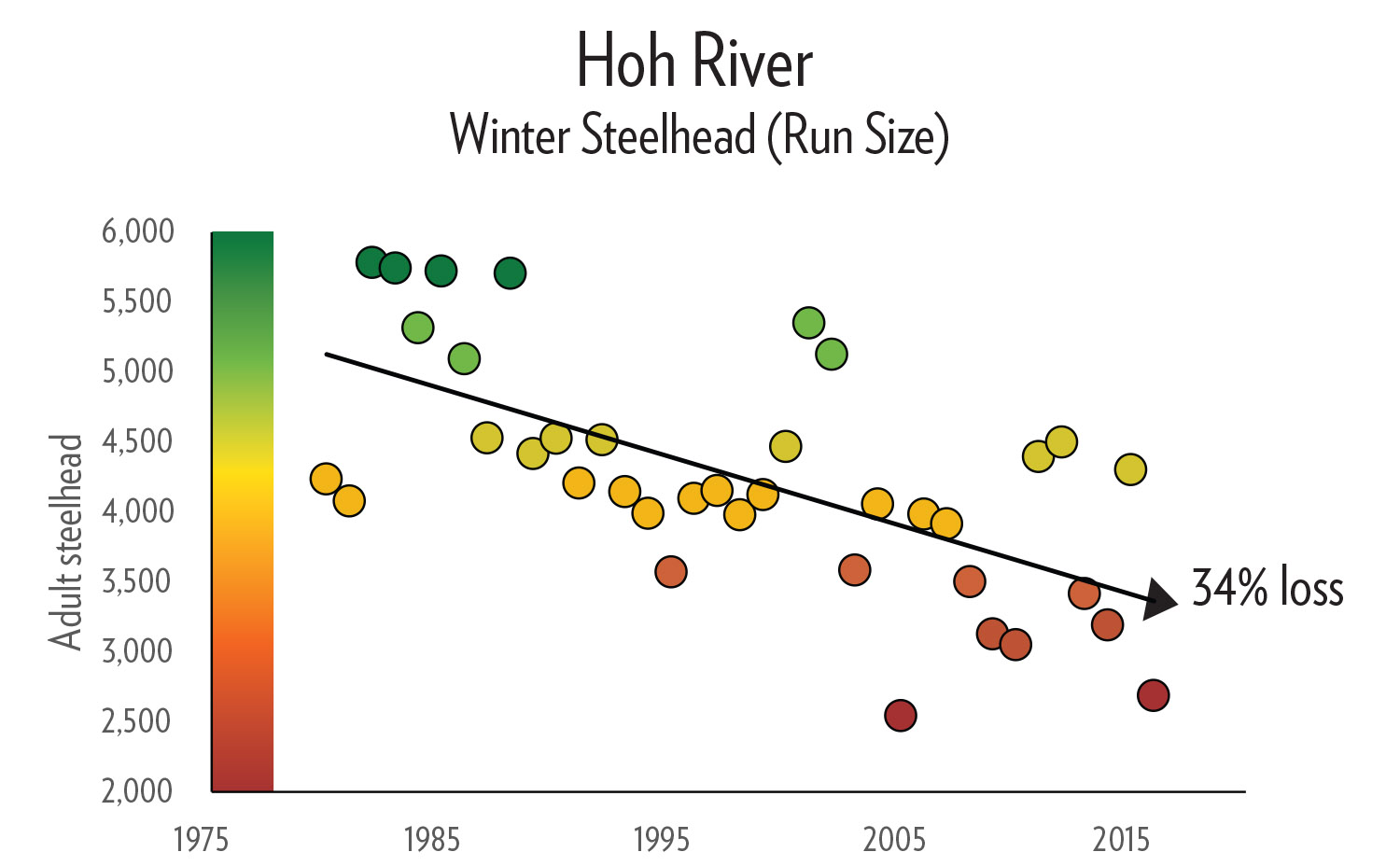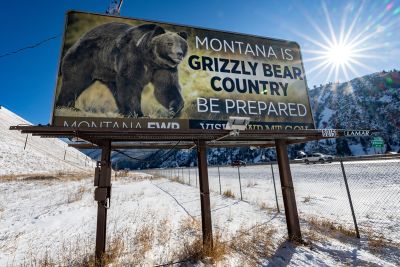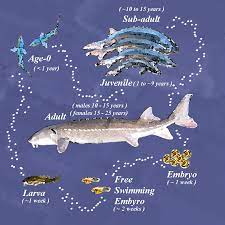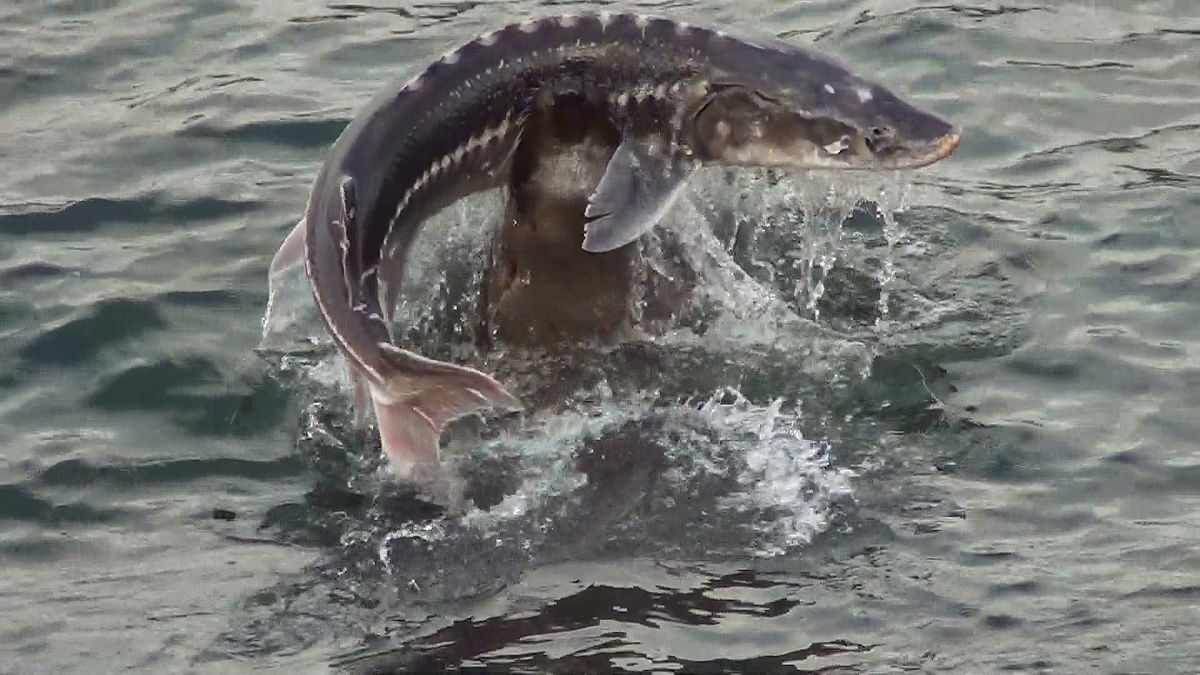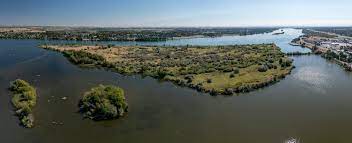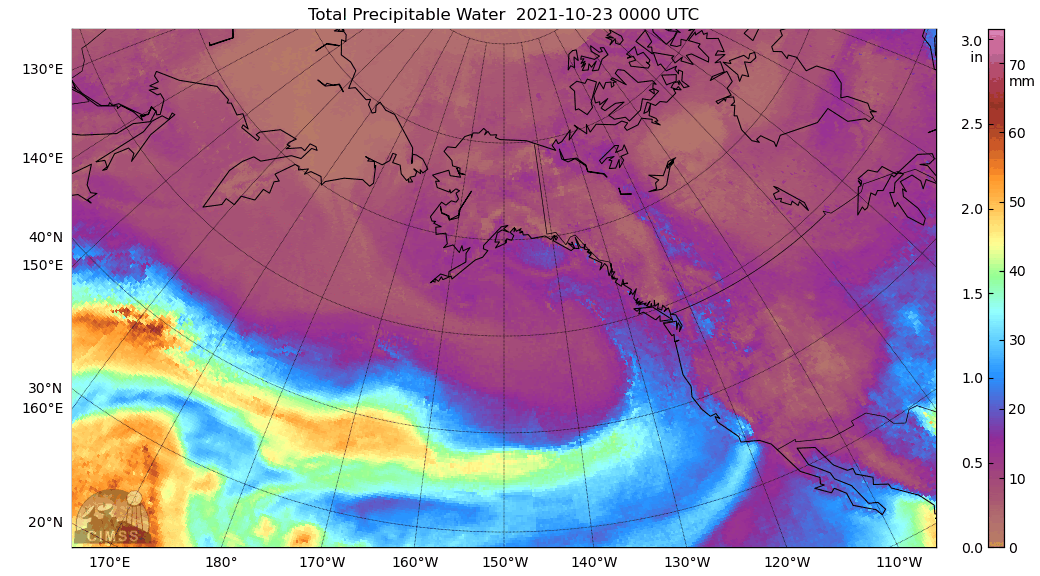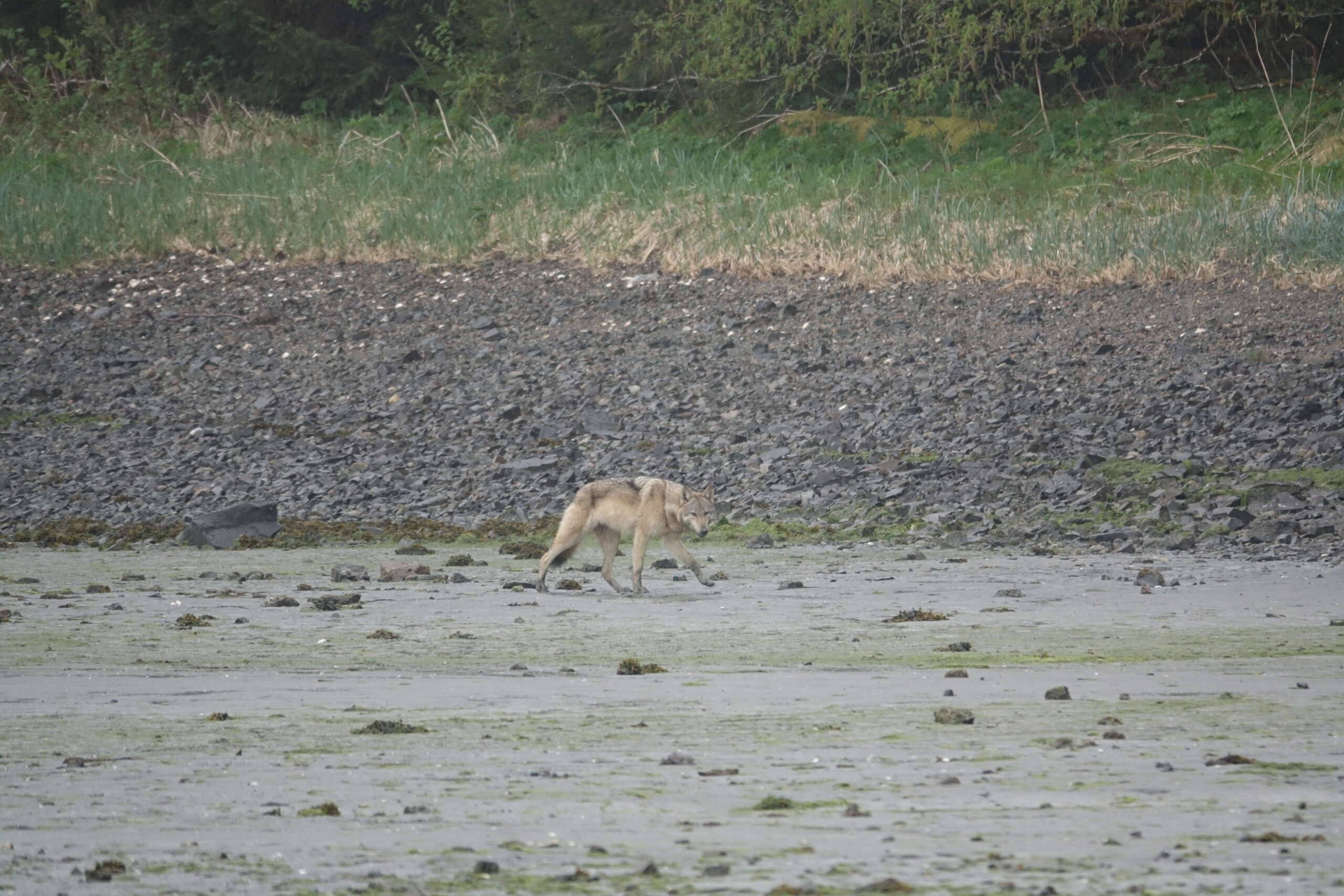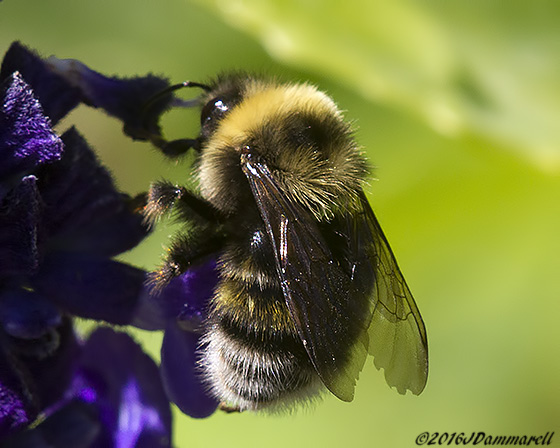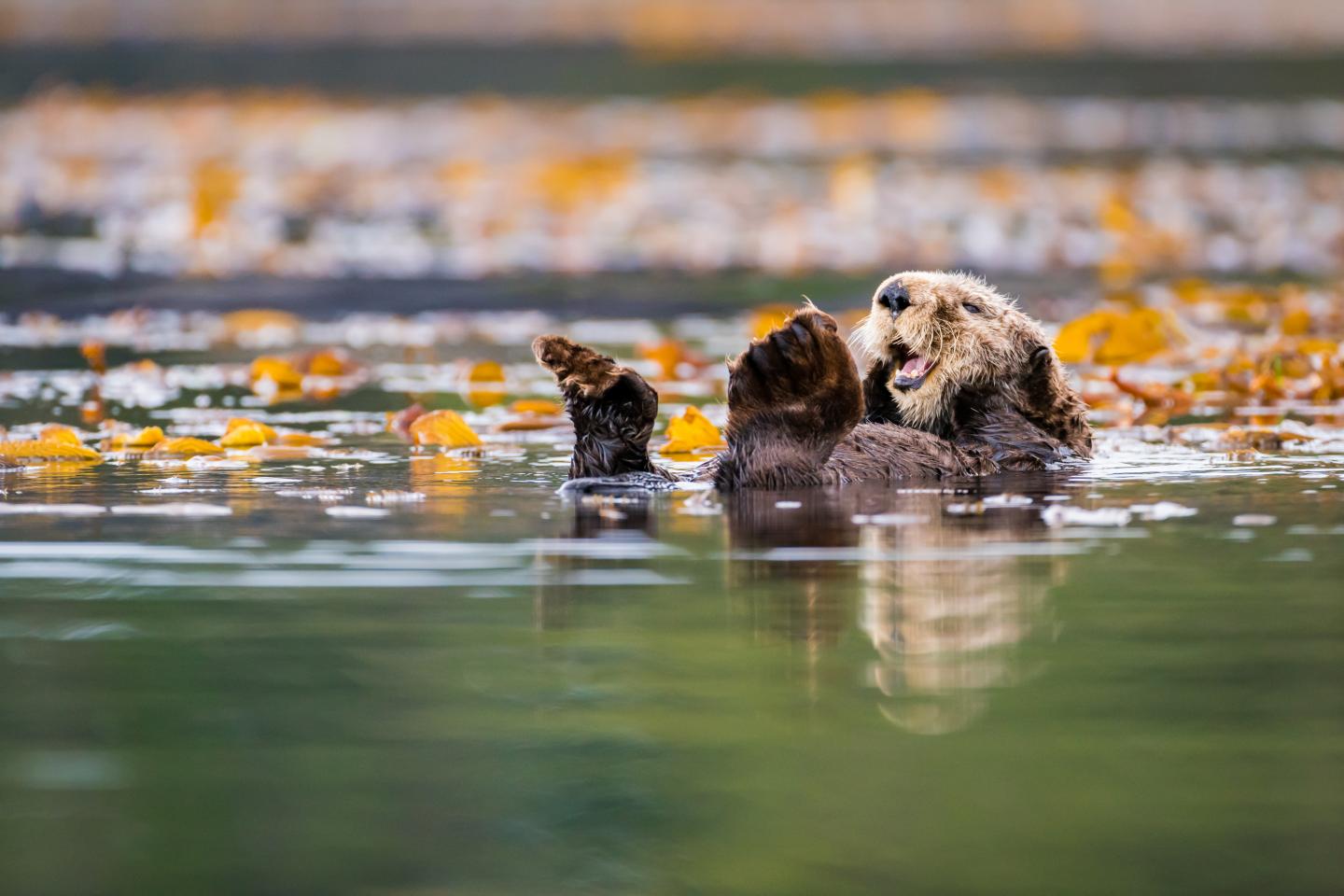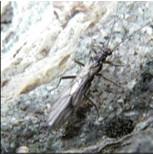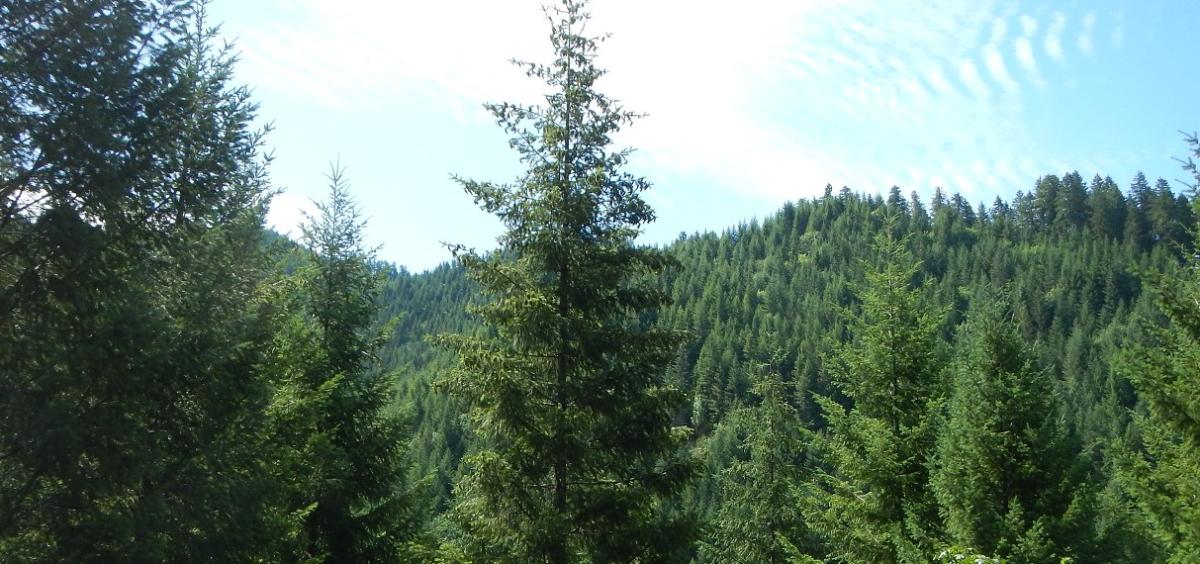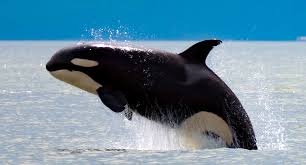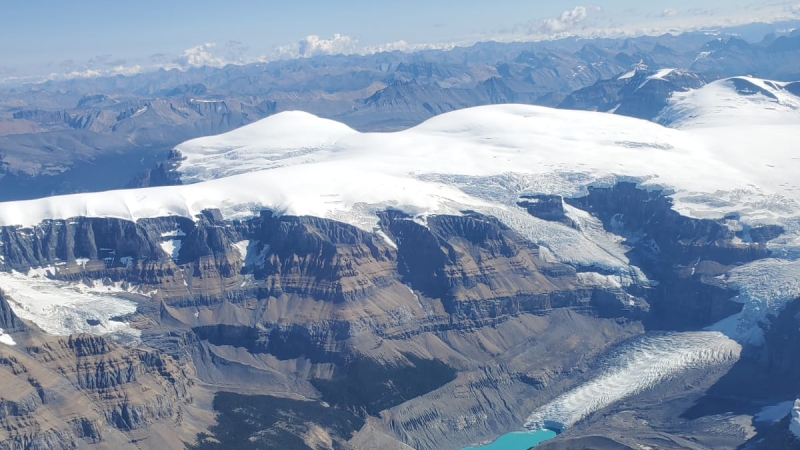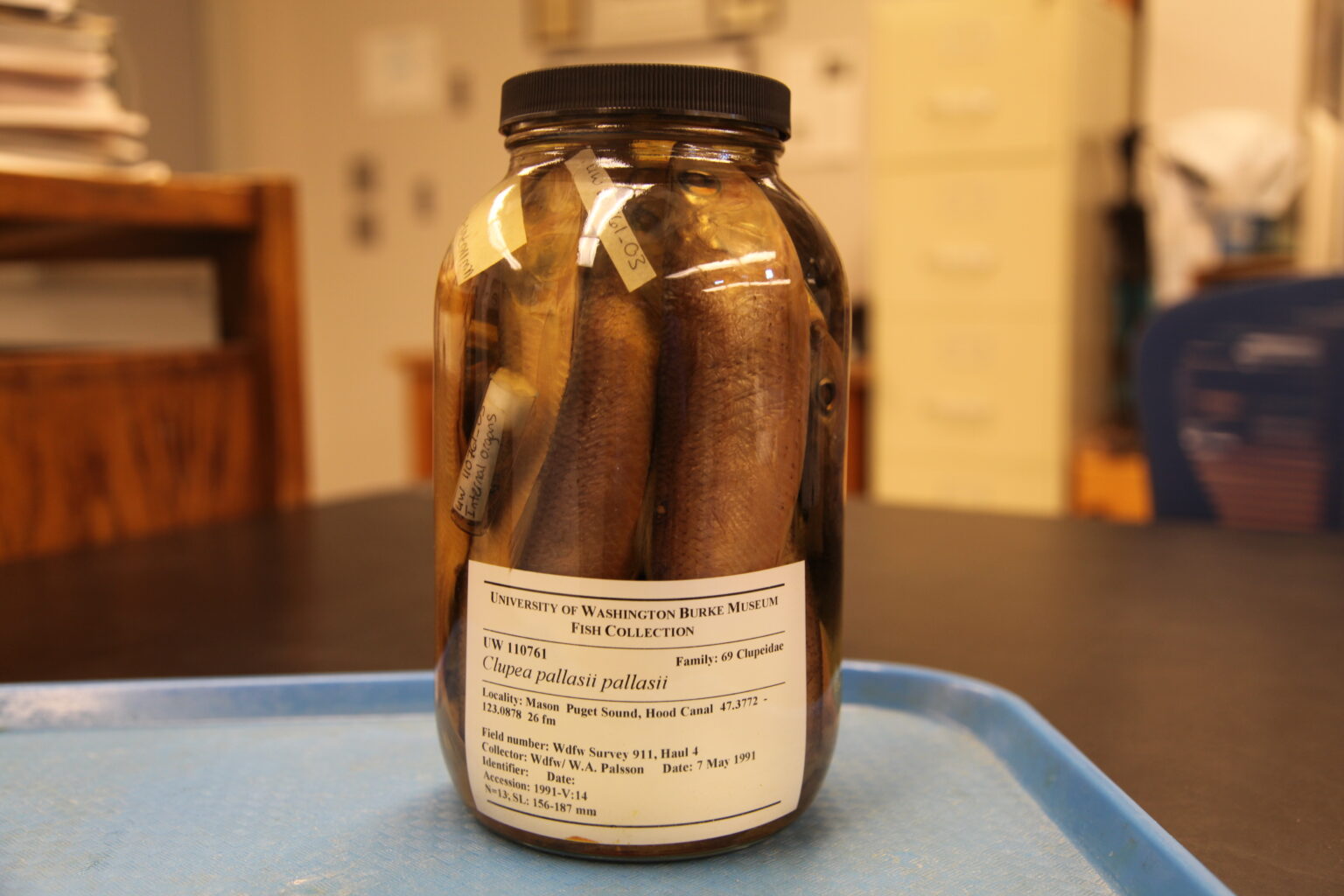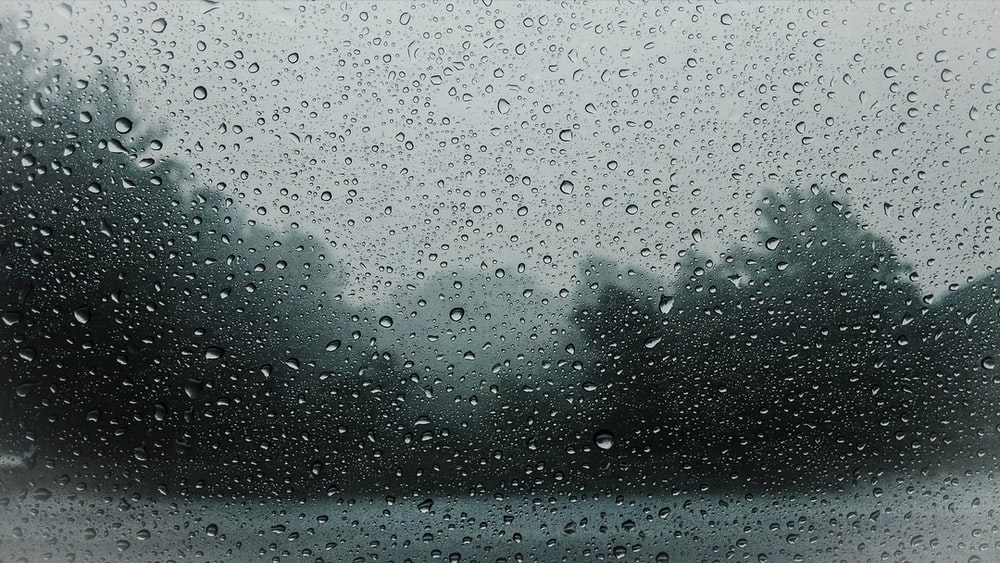Recent Rains Boost 2026 Water Supply Forecast (April-Sept) For Columbia Basin But Overall Snowpack Far Below Normal
January 9th, 2026
Warmer than normal temperatures since the beginning of the water year has left snowpack far below normal.
Naturally Reproduced Juvenile Coho Found In California’s Russian River Upper Basin First Time In 34 Years, Taken To Captive Breeding Program
January 9th, 2026
This summer, several juvenile coho salmon were spotted in the Russian River’s upper basin — a first in more than 30 years.
Over 30 Briefs Filed In Federal Court Opposing Request For More Spill For Fish, Lower Reservoirs At Columbia/Snake River Dams
December 19th, 2025
A proposed preliminary injunction calling for changes to Snake and Columbia river federal dam operations aimed at protecting endangered salmon and steelhead would lower the amount of electricity that could be generated by the dams, costing the region more for electricity, while also resulting in higher releases of carbon dioxide when making up for those losses, according to briefs submitted this week in U.S. District Court.
NOAA Study: Most PNW/California ESA-Listed Salmonid Stocks Show Increased Abundance Over 25 Years But Far From Recovery, De-Listing
December 19th, 2025
Most Pacific Coast salmon and steelhead stocks listed under the federal Endangered Species Act have increased in abundance over a 25-year span, but most still remain far under their recovery goals, according to a recent study by NOAA Fisheries scientists.
NOAA Rejects ESA-Listing For Oregon Coast, Northern California Chinook Salmon; ‘High Overall Abundance, Well-Distributed Spawning Populations’
December 19th, 2025
A 2022 petition to list Oregon Coast and Northern California Coastal Chinook salmon as threatened or endangered under the federal Endangered Species Act was denied by NOAA Fisheries this week.
Views At Congressional Hearing On Columbia River Sea Lion Predation On Salmon Lean Toward More Lethal Removals
December 19th, 2025
Speakers at a congressional hearing to consider the issue of predatory sea lions in the lower Columbia River weighed heavily towards recommending that more of the animals should be lethally removed from the river to protect salmon and steelhead.
Independent Science Board Issues Report On Climate ‘Resilient’ Strategies For Columbia Basin Fish/Wildlife
December 5th, 2025
In its update to a 2007 climate report, a team of scientists noted that the rate and magnitude of changes in temperature and hydrology in the Columbia River basin has amplified over the past two decades and those changes will impact salmon and steelhead.
CDFW Says One Year After Klamath River Dam Removals ‘Salmon Are Everywhere,’ Reoccupying Historic Habitat
November 22nd, 2025
A little more than a year after the removal of four hydroelectric dams on the Klamath River, California Department of Fish and Wildlife scientists are seeing salmon reoccupying just about every corner of their historic habitat.
Contract Awarded To Remove Causeway At Mouth Of Yakima River; Harms Salmon Migration, Increases Predation, Algal Blooms
November 22nd, 2025
The U.S. Army Corps of Engineers Walla Walla District, in partnership with the Washington Department of Fish and Wildlife, the Yakama Nation, the Washington Department of Ecology, and the Mid-Columbia Fisheries Enhancement Group has awarded a $1.2 million construction contract to PIPKIN INC. for the Bateman Island Causeway removal project.
Plaintiffs In Salmon BiOp Case Seek To Dismiss Two-Year Old Idaho Request That Judge Rule Out Dam Breaching As Remedy
November 22nd, 2025
The most recent filings in U.S. District Court in Portland by plaintiffs in the latest challenge to the biological opinion of the federal Columbia/Snake river hydropower system’s impacts on salmon and steelhead does not have to do with impacts by the federal dams, but instead it is a plea to dismiss a nearly two-year old counterclaim by the state of Idaho.
WDFW Study Shows Juvenile Chinook Salmon Face Cocktail Of Chemicals In Urban Waters, Dozens Of Contaminants Found In Fish
November 18th, 2025
A new study led by the Washington Department of Fish and Wildlife’s Toxics Biological Observation System unit explores an unseen threat to the Pacific Northwest’s Chinook salmon — chemical contamination.
More Briefings Filed In Support Of Injunction Calling For Operational Changes At Columbia/Snake Dams To Protect Salmon, Steelhead
November 5th, 2025
The state of Washington and Columbia River tribes are lining up in U.S. District Court to support a request for a preliminary injunction filed Oct. 14 by Earthjustice seeking emergency operational changes at federal Columbia and Snake river dams aimed at protecting endangered salmon and steelhead from harms caused by dam operations.
Hells Canyon White Sturgeon In Decline: Higher Spill, Lower Flows, Invasive Predators, Changes To Food Supply
October 24th, 2025
The population of white sturgeon from Hells Canyon Dam to Lower Granite Dam is in decline, with fewer juvenile sturgeon found in both the 101 miles of free-flowing river and 36 miles of reservoir water. That decline began when the lower Snake River dams were completed, according to information provided by the Idaho Department of Fish and Game at last week’s Northwest Power and Conservation Council meeting.
Corps Preparing For Fall/Winter Reservoir Drawdowns In Willamette River Basin To Aid ESA-Listed Salmon, Steelhead, Required By BiOp
October 8th, 2025
The U.S. Army Corps of Engineers is alerting Willamette Valley residents that it will begin drawing down reservoirs backed up behind some of its 13 dams in the river system, an action designed to aid the downstream migration of salmon and steelhead through the dams, but also one that has increased downstream turbidity that impacts city drinking water.
Video Camera Captures First Image Of Salmon Passing Keno Dam On Upper Klamath River Since Four Dams Downstream Removed Last Year
October 8th, 2025
A video camera captured a Chinook salmon ascending the fish ladder at Keno Dam on the upper Klamath River last week (Sept. 24), the first picture of a salmon ascending the upper bays of the ladder since four hydroelectric dams were removed on the Klamath River last year.
NOAA Scientists Develop New Method To Measure Toxic Tire Chemical In Marine Life, 6PPD-Quinone Can Kill Coho In Hours
October 8th, 2025
Scientists at NOAA’s Northwest Fisheries Science Center helped pioneer the study of an automobile tire toxin found to kill coho salmon when it runs off highways in stormwater and into streams. Now they have found a way to measure the toxin, 6PPD-quinone, directly in marine life, including fish, shellfish and marine mammals.
Two Decades Of Partnerships (Non-Profits, Utilities, Agencies) Help Restore Oregon’s McKenzie River With Connected Flood Plains, Natural Flows
September 26th, 2025
Projects in Oregon’s McKenzie River, a tributary of the Willamette River, are restoring the river from its recent channelized state to a healthy river with connected flood plains and natural flows, a river that is much more conducive to salmon and steelhead rearing, according to a recent presentation at a Northwest Power and Conservation Council meeting.
USFWS Recommends Columbian White-Tailed Deer Be Removed From Federal Endangered Species List
September 14th, 2025
The U.S. Fish and Wildlife Service has completed a five-year status review of the Columbian white-tailed deer and found that it has met the criteria outlined in its recovery plan. As a result, the Service is recommending the deer be removed from the federal Endangered Species List.
Coho Urban Runoff Mortality Syndrome: WSU Research Team Discovers How Tire Chemical 6PPD Kills Coho, Step To Finding Alternative
August 19th, 2025
For years, scientists at Washington State University’s Puyallup Research & Extension Center have been working to untangle a mystery: Why do coho salmon in Puget Sound creeks seem to suffocate after rainstorms — rising to the surface, gaping, and swimming in circles before dying?
Cormorants, Terns, Pelicans, Gulls: Council Gets The Latest Numbers On Managing Avian Salmonid Predation Across Columbia/Snake Basin
August 19th, 2025
Predation by sea birds on salmon and steelhead smolts in some years is responsible for as much as 50 percent of all smolt mortalities during the outmigration to the sea from the Columbia and Snake river basins, according to a presentation this week at a meeting of the Northwest Power and Conservation Council.
First Sockeye Returns To Sawtooth Basin, Since 2015 Average Annual Return To Basin 221 Fish; 164 Trucked This Year From Lower Granite To Hatchery
August 11th, 2025
Idaho’s first endangered sockeye salmon arrived at a Sawtooth Basin fish trap July 23, according to the Idaho Department of Fish and Game.
Dam Drawdowns For Fish: Willamette Valley Cities Declare Clean Water Emergency Over Coming Reservoir Drop
August 11th, 2025
Anticipating extra turbidity and an interruption of the clean drinking water it withdraws from the North Santiam River, the City of Salem declared a state of emergency at its City Council meeting last week. The expected turbidity is due to the U.S. Army Corps of Engineers’ deep drawdown next year of its reservoir backed up behind Detroit Dam to aid juvenile salmon and steelhead passage, particularly for salmon and steelhead listed as threatened under the federal Endangered Species Act.
Groups File Lawsuit Contending Steelhead Net Pen Aquaculture In Upper Columbia Polluting River, Violating Clean Water Permits
August 11th, 2025
Two environmental groups are suing to halt what they say is pollution released from three commercial net pen aquaculture facilities that produce steelhead located on the Columbia River in Eastern Washington. The groups say Pacific SeaFood Aquaculture LLC has been violating its Clean Water Act permits since 2020 and has been harming wild fish and the river’s ecosystem, home to anadromous fish species listed under the federal Endangered Species Act.
How Much Habitat Restoration Needed To Produce ‘Biological Meaningful Results’? Scientists Review 40 Years Of Projects Under Council Program
July 26th, 2025
In a review of 40 years of habitat restoration projects, a panel of fisheries scientists concluded that projects that remove barriers to salmon and steelhead, augment stream flows and add wood to give streams structure would likely achieve what they set out to do within a short period of time.
‘Sleeping Giant Awakening’: Ocean Warming Causing Higher Concentrations Of Algal Toxins In Arctic Food Webs
July 25th, 2025
Rising toxins found in bowhead whales, harvested for subsistence purposes by Alaska Native communities, reveal ocean warming is causing higher concentrations of algal toxins in Arctic food webs, according to new research published in the journal Nature.
The Problem Is Now: New WSU Research Shows Groundwater Declines In ‘Columbia Plateau Regional Aquifer System’
July 25th, 2025
Groundwater is declining across Eastern Washington’s complex, interconnected aquifer system, as people draw on it for irrigation, drinking and other uses at a pace that threatens its sustainability, according to a new study by a Washington State University researcher.
Oregon State Researchers Show How 1995 Yellowstone Wolf Reintroduction Prompting Aspen Tree Recovery; Increased Bison New Constraint
July 25th, 2025
Yellowstone National Park is celebrating an ecological milestone along with a key anniversary this summer, Oregon State University researchers report.
Relocated Oregon Wolves Part Of Colorado Reintroduction; Three New Packs, New Pups Confirmed
July 25th, 2025
Colorado Parks and Wildlife has confirmed three new wolf families — the One Ear, King Mountain and Three Creeks packs. They join the already established Copper Creek pack, which also welcomed new pups. While the total number of pups is still to be determined there are a minimum of four pups in the King Mountain pack.
Army Corps, Bureau Of Reclamation Withdraw Efforts To Complete Supplemental EIS On Hydro Impacts To Salmon, Steelhead
July 18th, 2025
Federal agencies this week backed away from their efforts to prepare a supplemental environmental impact statement for Columbia River basin dam operations and their impact on salmon and steelhead, citing a June 12 Presidential Memorandum as their justification.
Anchovy Boom In Ocean Leading To Thiamine Deficiencies In Pacific Salmon, Fish Swimming Upside Down
July 18th, 2025
A vitamin deficiency likely killed as many as half of newly hatched fry of endangered winter-run Chinook salmon in the Sacramento River in 2020 and 2021. These new findings were published in the Proceedings of the National Academy of Sciences.
With NOAA Funding, Cowlitz Indian Tribe Removes Dam In Washougal River Basin, Restoring Fish Passage, Habitat
July 18th, 2025
NOAA Fisheries’ Office of Habitat Conservation awarded the Tribe $3.3 million to remove the 55-foot-tall, 425-foot-long Kwoneesum Dam on Wildboy Creek. The dam, which was removed in 2024, blocked upstream salmon and steelhead migration on the creek for almost 60 years.
Montana Releases 2024 Wolf Report Showing Slight Decline In Numbers, 297 Harvested
July 18th, 2025
Montana’s wolf population has remained relatively stable in the past few years with only slight declines in the statewide population estimates, according to the 2024 Montana Fish, Wildlife & Parks annual wolf report.
California Report Documents 10 Years of Wolf Recovery, 7 Packs, 50-70 Wolves
July 18th, 2025
A century after wolves were wiped out in California, the animals have mounted a promising comeback in the state, with a small population that has grown to at least 50 wolves.
NOAA Launches New Ocean Modeling System For West Coast, Alaska, Predicts Future Ocean Changes
July 18th, 2025
NOAA has developed a new high-resolution ocean model to understand and predict West Coast ocean changes.
Will Marbled Murrelet Go Extinct In Washington? WDFW Seeks Comment On Draft Status Review
July 18th, 2025
The Washington Department of Fish and Wildlife is seeking public input on a draft periodic status review for the marbled murrelet, which includes a recommendation to keep the bird on the state endangered species list.
Second Pacific Lamprey Restoration Plan: Funding, Staffing, Progress ‘Unacceptably’ Slow, ‘We Are Frustrated’
June 30th, 2025
Four Columbia River basin treaty tribes recently completed their second restoration plan for “imperiled” Pacific lamprey in the basin fifteen years after the first such plan in which the Tribes had urged aggressive action in order to recover the culturally significant fish.
NOAA: Gray Whale Population Migrating Along West Coast Continues To Decline, Lowest Since 1970s
June 30th, 2025
The eastern North Pacific population of gray whales that migrates along the West Coast of the United States has continued to decline, with reproduction remaining very low. Two new Technical Memorandums from NOAA Fisheries’ Southwest Fisheries Science Center report the estimated population size and calf productivity in 2025.
Rapid Melt, Expanding Drought Has Columbia Basin Water Supply At Dalles Dam (April-August) At Only 79 Percent Of Normal
June 14th, 2025
Due to lower-than-normal precipitation in May and an early snowmelt in the Northwest, there will be less water available for salmon and steelhead this summer in the Columbia and Snake river basins as water supply forecasts are continuing their downward slide.
Trump Rescinds Biden’s Executive Order Aimed At Restoring Columbia Basin Salmon, Steelhead Runs
June 13th, 2025
The Trump administration issued a memorandum this week that disrupts Columbia River basin salmon and steelhead recovery by rescinding a 2023 agreement that included the federal government, two states and four Columbia River tribes and funded that effort with nearly $1 billion.
Washington Salmon Recovery Report: Of 14 Salmon/Steelhead Species ESA-Listed Since 1990s, Eight Still Face Extinction
June 6th, 2025
Six of fourteen salmon and steelhead species in the state of Washington that are listed under the federal Endangered Species Act are showing modest improvement. However, according to the 2024 State of Salmon report by the Washington Governor’s Salmon Recovery Office, eight species are still struggling and face extinction.
Flow Augmentation From Montana’s Libby Dam For ESA-Listed Kootenai River White Sturgeon Begins
June 6th, 2025
Higher flows from Libby Dam designed to encourage endangered white sturgeon to move up into spawning areas on the Kootenai River downstream in Idaho and British Columbia began last week, the U.S. Army Corps of Engineers announced.
Lawsuit Seeks Quicker Action On NOAA Pending Determination Whether Alaska Chinook Salmon Warrant ESA-Listing
May 23rd, 2025
The Wild Fish Conservancy filed a lawsuit this month in U.S. District Court in Washington D.C. in an effort to speed up NOAA Fisheries’ review of the Washington-based conservation group’s proposal to list Chinook salmon in Alaska under the federal Endangered Species Act.
Corps Seeks Public Comments On Supplemental EIS For Willamette River Basin Dams, Wants Views On Ending Hydropower
May 23rd, 2025
Public comments are open until June 6 on whether and how the U.S. Army Corps of Engineers should implement a deeper fall drawdown at its Detroit Reservoir as well as whether the agency should permanently end hydropower production at eight dams in Oregon’s Willamette River basin.
Columbia Basin Snowmelt, Runoff In Most Areas Early, Rapid; Water Supply Forecasts May-September Dropping
May 14th, 2025
Due to a drier and warmer than normal April, the water supply forecasts for May-September for the Columbia and Snake river basins have dropped, according to NOAA’s Northwest River Forecast Center’s last water supply briefing of the season held online this month.
Spring Runoff Older Than You Think: Hydrologists Show Mountain Streamflow Old Snowmelt On Years-Long Underground Journey
May 14th, 2025
Growing communities and extensive agriculture throughout the Western United States rely on meltwater that spills out of snow-capped mountains every spring. The models for predicting the amount of this streamflow available each year have long assumed that a small fraction of snowmelt each year enters shallow soil, with the remainder rapidly exiting in rivers and creeks.
Administration’s Proposed Rule Would Alter Definition Of ‘Take’ For ESA Species, Critics Fear Less Habitat Protections
May 5th, 2025
President Donald Trump, in an April proposed rule, has directed the Secretary of Commerce, NOAA Fisheries and the U.S. Fish and Wildlife Service to rescind the long-standing definition of “harm” to species covered by the federal Endangered Species Act. The existing definition of harm as the ESA is currently written, the Administration says, is contrary to the “best meaning” of the term “take.”
Spring Spill To Aid Salmon, Steelhead Passage Now Going Full Blast At Eight Columbia/Snake River Dams
April 21st, 2025
Spring spill at Columbia/Snake River dams to aid juvenile salmon and steelhead in their migration through the hydro projects and out to the ocean is in full motion with all of the lower eight dams on the two rivers initiating full spill by April 10.
Some Melting In March But Columbia Basin Water Supply Forecast Improves, 90 Percent Of Average At Dalles Dam (April-Sept)
April 12th, 2025
Warmer temperatures with some snowmelt and near- or wetter-than-normal precipitation in much of the Columbia River basin in March led to some early runoff but overall resulted in higher April-Sept. water supply forecasts and a better outlook for stream flows in the basin that will aid juvenile and adult salmon and steelhead migrations this summer, according to a NOAA water supply briefing last week.
Corps/BOR Scoping Meetings On Changes To Columbia River Salmon/Steelhead EIS To Be Rescheduled
April 12th, 2025
Scoping meetings to explore possible changes to the 2020 Columbia River salmon/steelhead environmental impact statement have been delayed again.
Trump Administration Pauses Columbia River Treaty Negotiations As It Reviews International Engagements
March 31st, 2025
The U.S. has paused negotiations with British Columbia on a modernized Columbia River Treaty that was nearly complete after both the U.S. and Canada reached an Agreement in Principle in 2024.
Columbia River Smelt Return High Enough For A Few Hours Of Dipnetting On Sandy River
March 31st, 2025
Recreational harvest of eulachon smelt on Oregon’s Sandy River took place Thursday, March 27 from noon to 7 p.m.
Egg-To-Fry Survival Of Chinook Salmon Studied In Several Columbia Basin Rivers, Provides Predictive Models For Researchers
March 15th, 2025
A recent study brings to light the dangers of a little-known life stage in which spring Chinook salmon in the Columbia River basin generally incur high mortality – incubation in the gravel.
ESA-Listed Tucannon Spring Chinook Close To Extinction; ‘Safety Net Offsite Strategy’ A Last Ditch Effort To Save Them
March 15th, 2025
Tribal and Washington fishery managers are doubling down on recovering threatened spring Chinook salmon in the Tucannon River in Eastern Washington by raising juveniles originating from the river at a hatchery 300 miles downstream.
Work Continues To Improve Lamprey Passage At Columbia/Snake Dams, Corp Completing Changes To Bonneville Dam Fish Ladder
March 15th, 2025
The U.S. Army Corps of Engineers is in the process of revamping the dam’s northern-most fish ladder near the Washington shore at a cost of some $8 million. According to the Corps, the project is changing out a portion of the fish ladder, which spans 800 feet from top to bottom, that was originally a serpentine passage of concrete walls, called baffles, with a newer baffle design more friendly to lamprey.
Oregon Study Shows Bird Flu Markers In Wastewater Comes Can Come From Wild Birds, Doesn’t Necessarily Mean Human, Poultry Or Dairy Cases
March 15th, 2025
New research shows that wild birds can account for much of the avian influenza virus evidence found in wastewater in Oregon, suggesting wastewater detections of the virus do not automatically signal human, poultry or dairy cattle cases of bird flu.
Hydraulic Egg Injection: Pilot Project Uses Man-Made Salmon Redds To Bring Back Salmon In California River
March 15th, 2025
Salmon are swimming again in California’s North Yuba River for the first time in close to a century. The fish are part of an innovative pilot project to study the feasibility of returning spring-run Chinook salmon to their historical spawning and rearing habitat in the mountains of Sierra County.
California Wolf Report Show Stable Population With 7 Packs, About 50 Wolves
March 15th, 2025
The California Department of Fish and Wildlife reports that the state currently has seven known wolf families amid changing pack dynamics and areas of new wolf activity. California now has around 50 known wolves, according to the state wolf coordinator — up from around 49 at the end of 2023. That modest increase comes despite 30 pups known to have been born in spring 2024. The report indicates that the nine packs confirmed at the end of September 2024 have declined to seven. The Beckwourth pack no longer exists and another pack, the Antelope pack, merged with the Beyem Seyo …
Study Reveals Older Trees Retain Memory Of Past Water Conditions; As Climate Warms, Mature Trees May Struggle
March 15th, 2025
As climate change accelerates, mature forests may struggle to survive. A recent study reveals that older trees retain a ‘memory’ of past water conditions, making it harder for them to adapt to drier environments.
Columbia-Snake River Navigation System Closed For Two Weeks For Annual Lock Maintenance
March 15th, 2025
The Columbia-Snake River System, a critical trade corridor supporting $24 billion in commerce annually, will pause operations for two weeks beginning March 9, as the U.S. Army Corps of Engineers, Portland District, conducts its annual navigation lock maintenance.
Washington State Gathers Info For Implementation Of TMDL Plan To Address High Water Temperatures In Columbia, Lower Snake Rivers
March 15th, 2025
The Washington Department of Ecology is hosting a public meeting March 17 to discuss how it will implement a long-awaited Total Maximum Daily Load plan for temperature in the Columbia and lower Snake rivers. The two rivers are included in Washington’s 303(d) list of impaired bodies of water due to their persistent high water temperatures that pose a threat to salmon and steelhead. The fish rely on the rivers for migration and spawning and some of the populations are listed under the federal Endangered Species Act. The temperature TMDL had been developed by the U.S. Environmental Protection Agency by court …
Corps Still Determining How To Implement Changes At Willamette Valley Dams With Funding Still Uncertain
February 25th, 2025
The U.S. Army Corps of Engineers is still determining “how to proceed” in implementing actions directed by the 2024 Water Resources Development Act and a new jeopardy biological opinion for its 13 Willamette River projects completed by NOAA Fisheries Dec. 26. The Corps says that it still needs funds from Congress that it could get through the annual federal budget that is working its way through the U.S. House of Representatives and Senate, but that the efforts are also complicated by the change in administration at the federal government. “We are working with our headquarters (U.S. Army Corps of Engineers … Continue reading
Lawsuit Challenges Proposed Massive Gold Mine On Idaho’s South Fork Salmon River
February 25th, 2025
Local and national conservation groups have sued the U.S. Forest Service to challenge its approval of the Stibnite Gold Project, an open-pit cyanide leach gold mine in Idaho’s Salmon River Mountains. The groups say the mine would jeopardize public health and clean water, harm threatened plants and animals, and permanently scar thousands of acres of public land in the headwaters of the South Fork Salmon River.
Climate Change Adaptation: California Using Diversified Salmon Hatchery Releases, Innovative ‘Parental Based Tagging’
February 25th, 2025
In a collaborative effort to increase the sustainability of California's salmon populations, the California Department of Fish and Wildlife has partnered with the Department of Water Resources, as well as ocean and inland fishing groups to continue a pilot project aimed at diversifying salmon hatchery release strategies.
Less Water, Dry Weather Hitting Bonneville Power’s Bottom Line, First Quarter Review Forecasting Revenue Loss
February 25th, 2025
Higher power purchase expenses due to low stream flows and dry winter weather have resulted in the Bonneville Power Administration forecasting agency net revenues of negative $44 million, $114 million below the agency target of $70 million.
PSU Study Provides Evidence Microplastics Widespread In Edible Tissues Of The Fish People Eat On West Coast
February 7th, 2025
The tiny particles that shed from clothing, packaging and other plastic products are winding up in the fish that people eat, according to a new study from Portland State researchers, highlighting a need for technologies and strategies to reduce microfiber pollution entering the environment.
Though Doesn’t Feel Like It Right Now, Columbia Basin Water Supply Forecast For April-September Still Dropping
February 7th, 2025
A drier than normal January is contributing to February’s lower Columbia River basin water supply forecasts for the months ahead.
Conservation Groups File Lawsuit Calling For NOAA Fisheries To Speed Up ESA Listing Of Olympic Peninsula Summer, Winter Steelhead
February 7th, 2025
Western Washington’s Olympic Peninsula summer and winter steelhead were found by NOAA Fisheries in November 2024 to be at moderate risk of extinction, but the federal agency has yet to list the fish as threatened or endangered under the federal Endangered Species Act, according to a new complaint filed Jan. 17 in federal court by The Conservation Angler and the Wild Fish Conservancy.
Columbia River Basin Snowpack A Mixed Bag So Far, Water Supply Forecast At Dalles Dam (April-August) Now 89 Percent Of Normal
January 20th, 2025
Although the snowpack in the western and southern portions of the Columbia River basin are higher than normal, other areas to the north and to the east are near- to lower-than-normal, and, as a result, January water supplies at key dams are being reported as below or slightly below normal.
Agencies’ Draft ‘Lower Snake River Water Supply Replacement Study’ Out For Review, Four Reservoirs Irrigate Over 55,000 Acres
January 19th, 2025
A federal agency and a state agency have jointly completed a study on the impacts that breaching the four lower Snake River dams would have on water supplies and irrigation.
Chum Salmon Pass Bonneville Dam In Record Numbers, Operations Under Way To Ensure Redds Remain Watered Downstream
January 10th, 2025
A record number of threatened chum salmon passed Bonneville Dam late in 2024, with over 1,100 of the salmon passing the dam on their way upstream, the largest passage by chum at the dam since 1954. These are in addition to the chum that spawn annually downstream near the dam’s tailrace and are the subjects of an effort to restore the Columbia River run that at one time was near 1 million fish.
Latest Oregon Climate Assessment: Precipitation Below Average 18 Of Last 24 Years, Snowfall To Decrease By 50 Percent By 2100
January 10th, 2025
Oregon is becoming warmer and more prone to drought and will see less snow due to climate change, but people and businesses are also adapting to the challenges of a warming planet, the latest Oregon Climate Assessment indicates.
Agencies Taking Another Look At 2020 EIS Detailing Impacts Of Columbia/Snake River Federal Hydrosystem On Imperiled Salmonids
December 22nd, 2024
Citing new information and changed circumstances, two federal agencies are reopening this week their 2020 final environmental impact study for operations at 14 Columbia/Snake river federal hydroelectric dams and are now seeking public input. The final EIS guides the dams’ impacts on salmon and steelhead listed under the federal Endangered Species Act.
Council Shows Total Salmon/Steelhead Return Numbers To Columbia River Through The Years Short Of Goal; ESA-Listed Fish Continue To Struggle
December 22nd, 2024
The average number of salmon and steelhead returning to the Columbia River each year has remained mostly constant over the last twenty years. While today’s returns of the fish have improved dramatically since the 1990s at a time when many of the species were being listed under the federal Endangered Species Act, today’s combined returns are still only half of the 2025 goal of 5 million fish set by the Northwest Power and Conservation Council.
USFWS Releases Final Recovery Plan For Oregon Spotted Frog, Inhabits Small Portions Of Habitat From Canada To Southern Oregon
December 22nd, 2024
The U.S. Fish and Wildlife Service has published a final recovery plan for the Oregon spotted frog, a threatened species living in the Pacific Northwest. The plan provides a road map to help recover the frog so it can thrive and ultimately be delisted from the Endangered Species Act.
USFWS Proposes To List Suckley’s Cuckoo Bumble Bee As Endangered; Once Broadly Distributed In West, Last Sighting In 2016
December 22nd, 2024
The U.S. Fish and Wildlife Service is opening a 60-day public comment period on a proposed rule to list Suckley’s cuckoo bumble bee as endangered under the Endangered Species Act. This determination also serves as the 12-month finding on a petition to list the bee.
Agencies Explain How New Columbia River Treaty ‘Agreement In Principle’ Will Alter Flood Control Operations; Less Pre-Planned Storage In Canada
December 15th, 2024
Canada will store several million-acre-feet of water that can be used in 2025 and for the next 20 years to help prevent floods in the Columbia River basin downstream in the United States, according to a virtual briefing earlier this month by federal dam operators on the Columbia River Treaty Agreement in Principle’s flood risk management protections.
NOAA Status Review Of Four Northern California/Southern Oregon Salmon/Steelhead Species Says All Should Remain ESA-Listed
December 15th, 2024
NOAA Fisheries has completed 5-year status reviews of the recovery progress and prospects of four salmon and steelhead species in Northern California and Southern Oregon and found that all four should remain threatened under the Endangered Species Act.
USFWS Proposes ESA-Listing For Monarch Butterfly, Western Population Down 95 Percent Since 1980s
December 15th, 2024
The U.S. Fish and Wildlife Service is proposing protection for one of the nation’s most beloved species — the monarch butterfly — and is encouraging the public to be part of its recovery.
Historic Dam Removal: ESA-Listed Coho Return To Upper Klamath Basin First Time In 60 Years, CDFW Releases 270,000 Hatchery Fall Chinook Yearlings
December 9th, 2024
The California Department of Fish and Wildlife has seen the first returns of threatened coho salmon to the upper Klamath River Basin in more than 60 years following historic dam removal completed last month.
Washington State Industrial Sites Have New Requirements To Protect Water Quality; Must Sample For PFAS, Tire Chemicals Lethal To Salmon
December 9th, 2024
Washington's Industrial Stormwater General Permit, which covers nearly 1,200 facilities, has new requirements to ensure cleaner stormwater is flowing into local waterways, and is less harmful to salmon.
USFW Releases Final Recovery Plan, Proposed Critical Habitat Revisions For Canada Lynx, Listed Under ESA 24 Years Ago
December 9th, 2024
The U.S. Fish and Wildlife Service says it is taking two significant steps to support the conservation and recovery of the threatened Canada lynx population in the lower 48 states.
Group Seeks ESA Protections For Two Snails In Southeast Oregon’s Owyhee River
December 9th, 2024
The Center for Biological Diversity has filed petitions with the U.S. Fish and Wildlife Service seeking Endangered Species Act protections for the Owyhee hot springsnail and Owyhee upland pyrg.
2024 Survival Rate Of Migrating Juvenile Salmon In Columbia/Snake Rivers? Hard To Say With Yet Another Year Of Low Detection, Tagging Rates
November 26th, 2024
Increased spill levels at Snake and Columbia river dams, along with lower water flow in the rivers, hampered the ability of scientists to tag and detect juvenile salmon and steelhead as they migrated downstream in 2024.
Yakama Nation Tells FERC If Pumped Storage Project Approved Near John Day Dam, Mitigation Cost No Less Than $40 Million Required
November 25th, 2024
In a letter to the Federal Energy Regulatory Commission, the Confederated Tribes and Bands of the Yakama Nation suggest that if a pumped storage project near the Columbia River’s John Day Dam moves forward, the Yakama Nation should receive no less than $40 million in mitigation for damage to tribal resources. The money would be used for the preservation and management of sacred and sensitive properties to the Yakama Nation.
Corps/Washington State Sign Agreement To Study Impacts Of Snake River Dam Breaching To Transportation, Recreation
November 18th, 2024
An agreement to study transportation and recreational services that would need mitigation if the four lower Snake River dams were breached to recover the river’s threatened salmon and steelhead was signed early last week by the U.S. Army Corps of Engineers and Washington’s Department of Transportation.
Groundbreaking Research: First Time Cloned Endangered Species (Black-Footed Ferret) Produces Offspring
November 18th, 2024
The U.S. Fish and Wildlife Service and conservation partners have announced a groundbreaking achievement in endangered species research: the first-ever birth of black-footed ferrets produced by a cloned endangered animal.
NOAA Awards $9.2 Million To Academic Cooperative Institutes For Pacific Salmon Recovery Science
November 18th, 2024
NOAA Fisheries has awarded more than $9.2 million in grants funded by the Inflation Reduction Act to academic partners that will help recover threatened and endangered Pacific salmon.
Warming Climate To Bring Changes To Columbia River Flow Management; Less Snow, More Rain, Higher Winter-Spring Flows, Low Summer Flows
November 1st, 2024
Climate change is expected to alter Columbia River basin streamflows in the coming years with higher water and more rain but less snowpack in winter, and more drought and lower water in the summer, which could result in less water for summer spill.
For First Time Scientists Find Japanese Sardines In California Current, Marine Heatwaves May Have Opened Corridor Across North Pacific
November 1st, 2024
When research scientist Gary Longo first saw the results of his genomic analysis of sardines, he thought he must have mixed up his samples.
How Do Lakes Contribute To Water Cycle In Warming World? Study Says Implications For Freezing Later, Melting Earlier
November 1st, 2024
The world’s freshwater lakes are freezing over for shorter periods of time due to climate change. This shift has major implications for human safety, as well as water quality, biodiversity, and global nutrient cycles, according to a new analysis from an international team of researchers.
Oregon Researchers To Study Whether Feeding Seaweed To Cattle Grazing In Sagebrush Ecosystems Reduces Methane Emissions
November 1st, 2024
Oregon State University researchers have received a $1 million grant to study the impact of adding seaweed to the diets of beef cattle as a way to reduce greenhouse gas emissions.
First Salmon Since 1912 Spotted In Oregon’s Klamath Basin Months After Dam Removal
October 18th, 2024
On October 16, a fall-run Chinook salmon was identified by Oregon Department Fish and Wildlife fish biologists in a tributary to the Klamath River above the former J.C. Boyle Dam, becoming the first anadromous fish to return to the Klamath Basin in Oregon since 1912 when the first of four hydroelectric dams was constructed, blocking migration.
Pacific Salmon Foundation Report Shows Widespread Declines For Most Salmon In British Columbia, Yukon
October 18th, 2024
Pacific salmon are in decline across British Columbia and the Yukon, according to a new report from the Pacific Salmon Foundation. More than 70 per cent of salmon are below their long-term average of the 41 combinations of regions and species assessed.
What’s Happening In North Pacific Between Hatchery, Wild Salmon? Study Stresses More Research To Reduce Unintended Interactions
October 18th, 2024
There are more salmon in the North Pacific Ocean than at any time in the past 100 years, according to a study released this month. The increase is due to changes in the marine ecosystems caused by warming seas -- changes that mostly benefit pink salmon, industrial-scale hatchery production, and commercial fishing.
‘We Are On The Brink Of Irreversible Climate Disaster:’ OSU Report Says Of 35 Planetary Vital Signs, 25 At Record Extremes
October 18th, 2024
An international coalition led by Oregon State University scientists concludes in its annual report published this month that the Earth’s worsening vital signs indicate a “critical and unpredictable new phase of the climate crisis” and that “decisive action is needed, and fast.”
EIS Out For Public Comment On Hatchery Program To Increase Chinook Salmon For Southern Resident Killer Whales
October 8th, 2024
NOAA Fisheries is asking the public to weigh in on alternatives on how to fund a controversial hatchery-driven prey increase program that it says would provide 4- to 5-percent more Chinook salmon in Puget Sound for endangered Orcas.
All Four Lower Klamath River Dams Removed, Several Years Work Ahead To Restore Formerly Submerged Lands
October 8th, 2024
All four lower Klamath River hydropower dams have been removed. Kiewit, the dam removal contractor hired by the Klamath River Renewal Corporation to complete the construction elements of the project, finished all work this month in the river.
Independent Scientists Review NPCC’s Basin Fish/Wildlife Program, Recommend More Comprehensive Climate Change Strategy
October 8th, 2024
In a recent review, a panel of scientists said the Northwest Power and Conservation Council’s Fish and Wildlife Program for the Columbia River basin is still changing and progressing after 40 years of implementation, but will need further updates and improvements, including a better strategy for incorporating climate change into the Program and a more comprehensive analysis of the outcome of removing the four lower Snake River dams.
Corps Holds Information Sessions To Explain Willamette Dams’ Drawdowns To Aid Salmon, Steelhead
October 8th, 2024
Deep drawdowns at Green Peter and Lookout Point reservoirs to improve juvenile Chinook salmon and steelhead fish passage on the Willamette River will be explained at virtual public information sessions sponsored by the U.S. Army Corp of Engineers.
Canada Looking For A New Columbia River Treaty To Promote Ecosystem Functions, Cultural Values Of B.C., First Nations
September 28th, 2024
In a Columbia River Treaty “Agreement in Principle” with the United States, Canada will set aside 4-million-acre-feet of water each year that in the past has been used for power production. This water stored behind Canadian dams instead will be used to promote ecosystem functions and socio-economic and cultural values of British Columbia and its First Nations, according to an information session by B.C. Treaty negotiators last week.
In ESA Status Review USFWS Confirms Marbled Murrelet Remains Threatened, Loss Of Old Growth Habitat
September 13th, 2024
The U.S. Fish and Wildlife Service has released a five-year status review for the marbled murrelet, a species of seabird that is listed as threatened under the Endangered Species Act from the Canadian border to central California.
WSU Study Finds That At-Risk Butterflies More Likely To Survive With Active Human Help, Some Declining At Rapid Rate
September 13th, 2024
Some of the butterflies most in danger of fluttering out of existence fare better when their habitats are actively managed by humans, a recent study found.
Hydropower Industry Sues Biden Administration Over ESA Administrative Rule Changes, Says Excess Of Authority
September 13th, 2024
The hydropower industry has filed a lawsuit in U.S. district court that challenges administrative changes to the federal Endangered Species Act made by Biden Administration agencies this spring that the industry says were made in “excess of the Services’ statutory jurisdiction and authority.”
With Klamath Dams Breached, California Issues ‘Klamath River Anadromous Fishery Reintroduction and Restoration Monitoring Plan’
September 13th, 2024
The California Department of Fish and Wildlife has released the “Klamath River Anadromous Fishery Reintroduction and Restoration Monitoring Plan,” a 60-page blueprint to guide the reintroduction and monitoring of Chinook salmon, coho salmon, steelhead and Pacific lamprey in a newly undammed Klamath River.
Elwha River Dam Removals 10 Years Later; Long-Term Study Shows Impacts To Salmon, Steelhead, Ecosystem
September 13th, 2024
Removing the Elwha and Glines Canyon dams on Washington's Elwha River presented an opportunity to study the ecological response of a river ecosystem to large-scale disturbance and subsequent restoration.
New Research Documents How Salish Sea Waters Too Noisy For Southern Resident Orcas To Hunt Salmon Successfully
September 13th, 2024
New research led by the University of Washington and the National Oceanic and Atmospheric Administration has revealed how underwater noise produced by humans may help explain the southern residents orcas’ plight.
WDFW Research Shows Fatal White-Nose Syndrome In Bats Continues To Spread, 11 New Counties In 2024
September 13th, 2024
Washington Department of Fish and Wildlife and research partners documented white-nose syndrome and the fungus that causes white-nose syndrome in eleven new counties in 2024.
Despite 20 Years Of Management Actions, Avian Predation Remains Substantial Source Of Columbia River Salmon, Steelhead Mortality
August 18th, 2024
As juvenile salmon and steelhead in the Columbia River basin migrate downstream to the ocean – mostly in the spring and summer – they run a gauntlet of avian predators. Birds are taking as much as 50 percent of these fish, with juvenile steelhead the hardest hit.
Washington Updates Aquatic Life Toxics Criteria To Help Protect Salmon, Steelhead, Orcas
August 18th, 2024
The Washington Department of Ecology has developed changes to the state’s aquatic life toxics criteria the agency says are based on updated science and new research, new methods and modeling tools, and recommendations from the U.S. Environmental Protection Agency and Tribal governments.
Grande Ronde Tribes Receive NOAA Funding To Improve Conditions For Imperiled Chinook, Steelhead On Willamette Valley’s North Santiam River
August 18th, 2024
The North Santiam River is a high priority for the recovery of threatened Upper Willamette River spring Chinook and winter steelhead. Large dams upriver impaired natural stream processes, decimating fish populations. Development, shoreline armoring, and the disconnection of floodplains from the river damaged habitat key for salmon spawning and rearing juvenile fish.
Interior Department Establishes New Willamette Valley Conservation Area, Part Of National Wildlife Refuge Complex
August 18th, 2024
The Department of the Interior announced this week the establishment of the Willamette Valley Conservation Area in Oregon as the 572nd unit of the U.S. Fish and Wildlife Service-managed National Wildlife Refuge System.
USFWS Petitioned To List Under ESA Freshwater Snail Found Only In Oregon’s Lower Deschutes River
August 9th, 2024
The Center for Biological Diversity this week petitioned the U.S. Fish and Wildlife Service to protect the banded juga — an imperiled freshwater snail in Oregon’s Deschutes River — under the Endangered Species Act.
Idaho Develops New Genetics-Based Method To Count State’s Wolf Population, Replacing Camera-Based Estimates
August 9th, 2024
Idaho Fish and Game researchers have developed a new genetics-based method of estimating the state’s wolf population. The method uses genetic and age information taken from every harvested wolf checked by Fish and Game.
Washington Approves Changes To Cougar Hunting Rules, Rejects Staff Recommendation To Downgrade Wolf Protection Status
July 26th, 2024
The Washington Fish and Wildlife Commission last week voted 8-1 to approve amended cougar hunting rules. Spurred by a petition from wildlife conservation organizations, the new rules aim to avoid cougar overexploitation.
WDOE Taking Comment On Proposed, First-Of-Its-Kind Pilot Project In Port Angeles To Pull Carbon Pollution Out Of The Air
July 26th, 2024
A pilot project proposed in Port Angeles, Washington is designed to test whether seawater can be used to soak up more carbon dioxide from the air. It is a first-of-its-kind pilot project that has the potential to remove carbon dioxide from marine waters.
Status Review: Northern California Steelhead, ESA-Listed 24 Years Ago, Still In Trouble, Climate Change Main Threat
July 17th, 2024
Northern California steelhead require continued protection as a threatened species under the federal Endangered Species Act, according to a recent 5-year review by NOAA Fisheries.
Washington Predator-Prey Project’s Research Shows Wolves In NE Washington Not Having Much Impact on Deer
July 17th, 2024
Humans drove wolves to extinction in Washington state around the 1930s. Thanks to conservation efforts, by about 80 years later, wolves had returned
Study Finds Pacific Cod In Gulf Of Alaska Can’t Rely On Coastal Safe Havens For Protection During Marine Heat Waves, May Have To Move North
July 5th, 2024
During recent periods of unusually warm water in the Gulf of Alaska, young Pacific cod in near shore safe havens where they typically spend their adolescence did not experience the protective effects those areas typically provide, a new Oregon State University study found.
With Air, Water Temps In Lower Snake Heating Up, Corps Releasing Cool Dworshak Flows To Aid Salmon, Steelhead
July 5th, 2024
The reservoir behind central Idaho’s Dworshak Dam is full (1,600-foot elevation), air temperatures in the lower Snake River basin are warming into the 100’s over the July 4 weekend and beyond, and tailwater temperature at Lower Granite Dam is warming towards 68 degrees Fahrenheit, the maximum allowed by NOAA Fisheries’ biological opinion on impacts of the federal hydroelectric system on salmon and steelhead.
Southern Resident Killer Whales In Poor Condition, ‘Vulnerable’; WDFW Asks All Boaters To Give Struggling, ESA-Listed Orcas Space
July 4th, 2024
For the fourth year in a row, the Washington Department of Fish and Wildlife issued an emergency rule requiring commercial whale-watching vessels to stay at least one-half nautical mile away from vulnerable Southern Resident killer whales (SRKW) this summer.
Pacific Coast Gray Whales 13 Percent Shorter Than 20 Years Ago; Raises Concerns About Warming Waters, Lack Of Prey, State Of Marine Food Web
June 21st, 2024
Gray whales that spend their summers feeding in the shallow waters off the Pacific Northwest coast have undergone a significant decline in body length since around the year 2000, a new Oregon State University study found.
Conservation Groups Submit Comments Blasting BLM’s Draft Amendment To Protect Sage Grouse On 69 Million Acres, 10 Western States
June 21st, 2024
Conservation organizations have submitted comments blasting the U.S. Bureau of Land Management’s draft amendment for 77 land-use plans across the western United States intended to protect the imperiled greater sage grouse.
Mountain Watersheds To Ocean Depths: Flathead Lake Biological Station Gets $9.5 Million To Study Ocean Climate Change
June 21st, 2024
A new research project led by the University of Montana’s Flathead Lake Biological Station expands the impact of the station’s renowned expertise from mountain watersheds to ocean depths.
Climate Change Creating New ‘Open Gate’ Corridors For Pacific Salmon; Higher Abundance Seen In Canadian Arctic
June 7th, 2024
New research has connected warming ocean temperatures to higher Pacific salmon abundance in the Canadian Arctic, an indicator that climate change is creating new corridors for the fish to expand their range.
USFWS Designates 1.2 Million Acres As Critical Habitat In California, Oregon For Coastal Marten
June 7th, 2024
The U.S. Fish and Wildlife Service is designating 1.2 million acres of critical habitat in northwestern California and southwestern Oregon for the coastal distinct population segment of the Pacific marten, also known as the coastal or Humboldt marten.
Study Shows Pacific Northwest’s Rocky Shores Have Low Resilience To Climate Change
June 7th, 2024
A 15-year period ending in 2020 that included a marine heat wave and a sea star wasting disease epidemic saw major changes in the groups of organisms that live along the rocky shores of the Pacific Northwest.
Marbled Murrelet Study Shows How Artificial Intelligence Can Enhance Monitoring Secretive Species
May 31st, 2024
Artificial intelligence analysis of data gathered by acoustic recording devices is a promising new tool for monitoring the marbled murrelet and other secretive, hard-to-study species, research by Oregon State University and the U.S. Forest Service has shown.
Idaho Study Suggests Parasitic Worm In Brain May Play Role In Declining Moose Populations
May 17th, 2024
A parasitic worm that can infest the brains of moose appears to be playing a role in the decline of the iconic animal in some regions of North America.
Washington’s Wolf Population Keeps Growing At About 23 Percent A Year; In 2023, Count Showed 42 Packs, 260 Wolves
May 3rd, 2024
Washington’s wolf population grew for the 15th consecutive year in 2023, according to the Washington Gray Wolf Conservation and Management 2023 Annual Report released by the Washington Department of Fish and Wildlife.
Oregon Annual Wolf Report Shows No Population Growth For First Time In 16 Years; ‘The Amount Of Poaching, Other Suspicious Deaths Alarming’
April 18th, 2024
The minimum known count of wolves in Oregon at the end of 2023 was 178 wolves, according to the Oregon Wolf Conservation and Management annual report released this week by the Oregon Department of Fish and Wildlife. This is the same number documented in 2022 and does not include 10 wolves translocated to Colorado in 2023 to help establish a wolf population there.
Sea Lion Trapping Begins; 2023 Pinniped Report Notes Predation Impacts To ESA Steelhead Twice As Severe Compared To Spring Chinook
April 5th, 2024
As states and tribes begin trapping and euthanizing sea lions in the Columbia River near Bonneville Dam this week, the U.S. Army Corps of Engineers released its 2023 report on last year’s pinniped abundance and predation of salmon and steelhead. The report covers the period July 2022 through May 2023 and shows that the 104 sea lions observed during the 2023 reporting period is the highest since 2018, when the number was 134.
Corps Says Report On Greenhouse Gases From Lower Snake Reservoirs Misleading; ‘Relatively Clean Reservoirs In Columbia/Snake River’
April 5th, 2024
The U.S. Army Corps of Engineers says that a report by a new group that recently asserted the four lower Snake River dams are a major source of greenhouse gases, particularly methane gas, largely used emission figures from dams and reservoirs outside of the Columbia and Snake river basins.
Final Federal EIS Proposes Establishment Of Experimental Grizzly Bear Population In North Cascades National Park
April 5th, 2024
The National Park Service and U.S. Fish and Wildlife Service have published a final Environmental Impact Statement that identifies the preferred alternative to reintroduce grizzly bear into the North Cascades Grizzly Bear Recovery Zone, including North Cascades National Park.
Invasive Walleye Moving Higher Into Snake River Basin, Threatening Wild, Hatchery Stocks Of Juvenile Salmon, Steelhead, Lamprey
March 22nd, 2024
Walleye, an invasive species with a reputation for a voracious appetite, has moved down the Columbia River from Lake Roosevelt and are now being counted in increasing numbers upstream of Lower Granite Dam on the Snake River, according to a report by the Idaho Department of Fish and Game.
Montana Climate Office Says Western Montana Headed To Lowest Snowpack Ever Seen; Big Ripple Effects Downstream Of Three Major Rivers’ Headwaters
March 22nd, 2024
Snowpack this winter continues to be at an all-time low across several river basins in western Montana, indicating that this year could see water shortages, according to recent projections from the Montana Climate Office.
Ocean Conditions Key For Columbia River Basin Salmon/Steelhead Survival, NOAA Researchers Say About Average In 2023
March 22nd, 2024
urvival of Columbia River basin salmon and steelhead is poor – in most cases less than 2 percent smolt to adult returns – compared to a Northwest Power and Conservation SARs goal of 6 percent, according to a presentation at the Council’s March meeting.
Strong, Ocean-Warming El Nino Has Arrived But Researchers Say California Current Ecosystem Should Hold Up Better Than Last Time (2015)
March 22nd, 2024
The California Current ecosystem is a vital ocean system stretching from Washington to Baja California. It is facing a strong 2024 El Niño event, a cyclical warming of the Pacific Ocean. However, the latest information from NOAA’s Integrated Ecosystem Assessment program suggests the ecosystem is better positioned to weather these changing conditions than previous El Niño events.
OSU, NOAA Publish First Study Examining Marine Heat Wave Impacts On Entire Ocean Ecosystem In California Current, Food Webs Disrupted
March 22nd, 2024
Marine heat waves in the northeast Pacific Ocean create ongoing and complex disruptions of the ocean food web that may benefit some species but threaten the future of many others, a new study has shown.
Study: Low Oxygen Conditions (Hypoxia) Widespread, Increasing Off Pacific Northwest Coast
March 22nd, 2024
Low oxygen conditions that pose a significant threat to marine life are widespread and increasing in coastal Pacific Northwest ocean waters as the climate warms, a new study shows.
Reopening Rivers For Salmon, Steelhead: 10-Year Effort Underway To Remove, Replace Culverts Blocking Fish Passage On Olympic Peninsula
March 7th, 2024
The cold water rivers of Western Washington hold some of the last, best freshwater habitat for salmon and steelhead in the lower 48 states, and despite a warming climate, their high-elevation headwaters are predicted to remain cool enough for salmon and steelhead for at least the next 50 years.
Oregon Researchers Lead Effort To Expand Ocean Conditions Monitoring Using Sensors On Crab Pots
March 7th, 2024
Oregon State University researchers are leading an effort to refine the design and expand use of oxygen monitoring sensors that can be deployed in fishing pots to relay critical information on changing ocean conditions to the fishing industry.
Warming Waters Threatening Walleye, Spawning Timing Off With More Variable Spring Thaw
March 7th, 2024
Walleye are one of the most sought-after species in freshwater sportfishing, a delicacy on Midwestern menus and a critically important part of the culture of many Indigenous communities. They are also struggling to survive in the warming waters of the midwestern United States and Canada.
Oregon Fish and Wildlife Commission Votes To List Southern Resident Orcas As Endangered Under State ESA, Forage Near Mouth Of Columbia
February 23rd, 2024
The Oregon Fish and Wildlife Commission has voted unanimously to list Southern Resident orcas as endangered under Oregon's Endangered Species Act. Southern Resident orcas now number just 75 whales in three pods and have been listed as endangered under federal law since 2005.
Climate Change Hitting West Coast Fishing Fleets, Study Shows Vessels Further North Will Experience More Dramatic Changes
February 23rd, 2024
A new NOAA Fisheries study examined how climate change might affect commercial fishing fleets on the U.S. West Coast, assessing the risk to different bottom trawl groundfish fishing fleets in California, Oregon, and Washington.
NOAA Status Review Says Sacramento Winter-Run Chinook Remain Endangered, Serious Threats From Climate Change, Disease
February 23rd, 2024
Though agencies and partners have pulled together to support the recovery of endangered Sacramento winter-run Chinook salmon in the last few years, NOAA Fisheries says the species is still in trouble, facing threats from climate change and other factors.
Montana Files Notice Of Intent To Sue USFWS Over Recent Wolverine ESA Listing
February 2nd, 2024
Montana Fish, Wildlife & Parks has notified the U.S. Fish and Wildlife Service of its intent to pursue legal action over the recent listing of wolverines as a threatened species.
Marine Heat Waves Trigger Earlier Reproduction, High Juvenile Mortality In Pacific Cod In Gulf Of Alaska Years After Event
February 2nd, 2024
Marine heat waves appear to trigger earlier reproduction, high mortality in early life stages and fewer surviving juvenile Pacific cod in the Gulf of Alaska, a new study from Oregon State University shows.
Montana Study Quantifies Interconnected Impacts Of Climate Change, Irrigation On Hundreds Of Western Watersheds’ Surface Water Flows
February 2nd, 2024
In a study that could help reshape understanding and management of water resources in the Western United States, David Ketchum, a 2023 graduate of the University of Montana systems ecology Ph.D. program, has unveiled a 35-year analysis quantifying the interconnected impacts of climate change and irrigation on surface water flows.
Montana Survey Shows Tolerance Of Wolves Way Up Among State’s General Population, Tolerance of Wolf Hunting Down
January 18th, 2024
Montanans have varying attitudes and beliefs about wolves and wolf management, and over time some of those feelings have shifted, according to a new survey conducted cooperatively by Montana Fish, Wildlife & Parks and the University of Montana.
Washington Governor Directs WDFW To Draft New Rules For Handling Wolf-Livestock Conflicts
January 18th, 2024
Washington Gov. Jay Inslee last week directed the Washington Fish and Wildlife Commission to draft new rules to guide when wolves can be killed for conflict with livestock and prioritize using nonlethal methods of conflict deterrence over killing wolves.
Canadian Researchers Find Toxic Chemicals From Oil Spills, Wildfire Smoke (PAHs) In Killer Whales, Transfers Mother To Fetus
January 5th, 2024
Toxic chemicals produced from oil emissions and wildfire smoke have been found in muscle and liver samples from Southern Resident killer whales and Bigg’s killer whales.
Tree Ring History: Study Shows Oregon Cascade Range Forests Burned More Often Than Previously Thought, But Fires Much Smaller
January 5th, 2024
Forests on the west slope of Oregon’s Cascade Range experienced fire much more often between 1500 and 1895 than had been previously thought, according to new research by scientists at Oregon State University.
NOAA’s 2023 Arctic Report Card: Summer Air Temperatures Warmest Ever Observed, New Chapter Focuses On Salmon
January 5th, 2024
NOAA’s 2023 Arctic Report Card documents new records showing that human-caused warming of the air, ocean and land is affecting people, ecosystems and communities across the Arctic region, which is heating up faster than any other part of the world.
Specialized Forecasts Can Predict A Year In Advance Ocean Changes That Shift Fisheries, Cause Conflicts
December 13th, 2023
Two new research studies describe the increasing accuracy of specialized scientific models in forecasting changes in the ocean up to a year in advance.
The Heat Is On: Scientists Say Supercharged Heat Waves Will Strike Harder, More Often In Pacific Northwest
December 13th, 2023
North America’s 2021 heat wave was Washington’s deadliest weather-related disaster, claiming over 100 lives in the evergreen state and many others in neighboring regions. Scientists not only suggest that such heat waves will grow more intense and strike more often—in new work, they reveal the underlying mechanism behind these strengthened heat waves.
The Heat Is On: Study Shows Pacific Northwest Snowpack Endangered By Increasing Spring Heatwaves
December 13th, 2023
Even in the precipitation-heavy Pacific Northwest, more frequent heatwaves are threatening a key source of water supply.
USFWS Reverses Course, Lists North American Wolverine As Threatened Under ESA, Taking Comment On Rule Allowing Certain ‘Take’ Activities
November 30th, 2023
The U.S. Fish and Wildlife Service has announced its final rule to list the distinct population segment of the North American wolverine in the contiguous U.S. as a threatened species under the Endangered Species Act.
Conservation Groups File Appeal Urging Washington Governor To Order New Rules For Wolf-Killing
November 30th, 2023
Conservation groups this week filed an appeal asking Washington Gov. Jay Inslee to order the Washington Fish and Wildlife Commission to draft enforceable rules that limit when the state can kill endangered wolves for conflicts with livestock.
Déjà Vu: Oregon Study Says Once Again Salmon-Eating Cormorants Need To Somehow Be Relocated From Astoria Bridge Back To Estuary Island
November 16th, 2023
The thousands of double-crested cormorants nesting on the 5-mile-long Astoria-Megler Bridge in the Columbia River estuary that are damaging the bridge, causing safety problems and eating more salmon and steelhead smolts must go, according to a value engineering study led by the Oregon Department of Transportation.
National Climate Assessment Details Challenges To Northwest Salmon Recovery; Warming ‘Increases Extinction Risk For Species Already At Low Abundance’
November 16th, 2023
The Fifth National Climate Assessment (NCA5) released this week finds that the impacts of weather extremes — exacerbated by climate change — are far-reaching across every region of the United States. And it indicates a warming future threatens Northwest salmon recovery.
USFWS Finalizes Designation Of Gray Wolf Experimental Population In Colorado, Wolves To Come From Oregon
November 16th, 2023
In support of a statewide voter-led initiative passed in November 2020, the U.S. Fish and Wildlife Service has finalized the designation of an experimental population of gray wolves in Colorado under the Endangered Species Act. This action provides management flexibility in support of the state of Colorado’s voter-mandated gray wolf reintroduction program.
USFWS Seeks Comment On Draft Strategy To Remove Non-Native Barred Owls To Save California’s Spotted Owls
November 16th, 2023
The U.S. Fish and Wildlife Service is seeking public input on a draft environmental impact statement and draft Barred Owl Management Strategy that addresses the threat of the non-native and invasive barred owls to native northern and California spotted owls.
Rethinking Wolf Hunting Behavior: Researchers Observe Wolves Killing Sea Otters, Seals On Alaska Coast
November 3rd, 2023
Firsthand observations of a wolf hunting and killing a harbor seal and a group of wolves hunting and consuming a sea otter on Alaska’s Katmai coast have led scientists to reconsider assumptions about wolf hunting behavior.
OSU Scientists Author State Of The Climate Report: ‘We Are On Our Way To Potential Collapse Of Natural, Socioeconomic Systems’
October 26th, 2023
An international coalition of climate scientists says in a paper published this week that the Earth’s vital signs have worsened beyond anything humans have yet seen, to the point that life on the planet is imperiled.
Draft Grizzly Bear Restoration Plan By USFWS, NPS Calls For 200 Bears In North Cascades Within 60-100 Years
October 12th, 2023
The U.S. Fish and Wildlife Service and National Park Service have released a draft plan analyzing options to restore grizzly bears to the North Cascades in Washington.
Report Says Floating Offshore Wind Farms Off Southern Oregon/Northern California Coast Could Bring Billions In Value, Power A Million Homes
October 12th, 2023
A new report from Pacific Northwest National Laboratory shows that along a 200-mile stretch of ocean off the coast of southern Oregon and northern California, floating wind farms could potentially triple the Pacific Northwest’s wind power capacity while offsetting potentially billions of dollars in costs for utilities, ratepayers, insurance companies, and others across the West who bear the cost of climate change’s effects.
Up To 10 Wolves From Northeast Oregon To Be Relocated To Colorado West Slope In Voter-Approved Reintroduction Effort
October 12th, 2023
In a one-year agreement announced between Colorado Parks and Wildlife and Oregon Department of Fish and Wildlife, Oregon will be a source for up to 10 wolves for the Colorado gray wolf reintroduction effort. These wolves will be captured and translocated between December 2023 and March 2024.
Group Files Lawsuit Against USFWS Over Lack Of ESA Protection For American Bumblebees
October 12th, 2023
The Center for Biological Diversity filed a formal notice this week of its intent to sue the U.S. Fish and Wildlife Service for failing to protect four imperiled bee species, including American bumblebees, under the Endangered Species Act. Southern Plains bumblebees, variable cuckoo bumblebees and blue calamintha bees are also included in today’s filing.
Portland State Inventory Shows Western States’ Glaciers Disappearing, Getting Smaller
September 28th, 2023
The Western United States is losing its glaciers. A new inventory from Portland State University researchers shows that some glaciers have disappeared entirely, some no longer show movement, some are too small to meet the 0.01 square kilometer minimum and some are actually rock glaciers — rocky debris with ice in the pore spaces.
Researchers Use Models To Estimate Where West Coast Salmon Habitat Will Remain Favorable With Warming Climate
September 15th, 2023
With climate change, some spawning habitat in British Columbia could actually expand, peaking in area around 2060, according to a recent study that looked at current stream habitat and projected future favorable spawning habitat as the climate warms.
UW Researchers Find That Fall Snow Levels (December) In Oregon, Washington Can Predict Total Snowfall An Area Will Get
September 15th, 2023
Researchers who study water resources want to know how much snow an area will get in a season. The total snowpack gives scientists a better idea of how much water will be available for hydropower, irrigation and drinking later in the year.
New Research Shows Surprising Resilience Of Fisheries To Marine Heat Waves; 248 Heat Waves 1993-2019 Analyzed
September 7th, 2023
New research has found that marine heat waves – prolonged periods of unusually warm ocean temperatures – haven’t had a lasting effect on the fish communities that feed most of the world.
UW Study Quantifies Fossil Fuel Emissions Causing Polar Bear Declines; Method Can Be Used For Other Species Impacted By Global Warming
September 7th, 2023
New research from the University of Washington and Polar Bears International in Bozeman, Montana, quantifies the relationship between greenhouse gas emissions and the survival of polar bear populations.
NOAA Begins Court-Ordered Work On EIS Analyzing Increase Of Hatchery Salmon Production To Feed Imperiled Killer Whales
August 23rd, 2023
Responding to a recent District Court order, NOAA Fisheries has opened a review of its prey increase program specifically designed to provide more food for endangered Southern Resident killer whales in Puget Sound. NOAA is seeking written and verbal feedback from the public as it develops an Environmental Impact Statement for the program.
Bad News For Salmon: Walleye Spreading Into Idaho, Most Reports Ever Of Walleye Upstream Of Lower Granite Dam
August 23rd, 2023
Idaho Fish and Game has received more verified reports and pictures from people catching walleye in the Hells Canyon reach of the Snake River and Salmon River in 2023 than in all previous years.
Climate Change Will Make Fishing For West Coast Groundfish More Difficult As Species Redistribute; Vessels Will Have To Travel Farther, Fish Deeper
August 23rd, 2023
Shifting ocean conditions associated with climate change will likely send high-value sablefish into deeper waters off the West Coast, new research shows. That could make the fish tougher to catch and force fishing crews to follow them or shift to other, more accessible species.
Is A Growing American White Pelican Population In Mid-Columbia River Threat To Salmonids? Researchers Now Studying Predation Impacts
August 10th, 2023
A growing American white pelican population on an island in the mid-Columbia River basin could be a new threat to salmon and steelhead. The large white birds not only scoop out batches of juvenile fish, they also have been known to eat adult salmon, including sockeye salmon and other fish as large as 29 inches.
Promising Sign For Declining Gray Whales? Researchers Count Increase In Calves Headed North To Arctic Feeding Grounds
August 10th, 2023
Almost twice as many gray whale calves swam north with their mothers to their Arctic feeding grounds this spring compared to last year, according to a new count completed by NOAA Fisheries’ Southwest Fisheries Science Center.
Study Of Protected Birds Found Dead Along Powerlines In The West Found Illegal Shooting A Significant Threat, 66 Percent Of Birds Studied Shot
August 10th, 2023
A study examining protected birds found dead along power lines on public lands in the western U.S. shows that gunshot deaths were three times more common than deaths from other causes.
Construction Work On First Permitted Wave Energy Test Facility Off Oregon Coast Will Be Visible This Month
August 10th, 2023
The next step in Oregon State University’s construction of a wave energy testing facility off the Oregon Coast is visible to residents and visitors to the area this month.
Citing Sockeye-Killing Warm Water, Groups To File Lawsuit Pushing For Breaching Of Lower Snake Dams
July 27th, 2023
Four conservation groups notified the U.S. Army Corps of Engineers that they intend to sue the agency over the heat pollution created by the four lower Snake River dams. The groups allege the dams overheat the river’s water and those conditions are killing or injuring Snake River sockeye salmon listed as endangered under the federal Endangered Species Act.
Study Tracks Decades Of Juvenile Salmon Migration Timing For 66 West Coast Populations; Climate Change Impacts Vary
July 27th, 2023
Climate change has led to earlier spring blooms for wildflowers and ocean plankton but the impacts on salmon migration are more complicated, according to new research.
Droughts In Western States Driving Up Emissions When Utilities Forced To Switch From Hydro To Fossil Fuels, Has Cost Billions Past 20 Years
July 27th, 2023
When drought-stricken rivers and reservoirs run low across the American West, hydropower dries up and utilities fire up hundreds of power plants that burn coal, oil, or natural gas to keep up with demand for electricity. The timing couldn’t be worse, as accompanying heat waves drive up energy use, often to power air conditioners.
Paper Synthesizes Latest Research On Wildfires In The West, More Firefighters On Ground, In Air Not The Answer
July 27th, 2023
Since 1980, fires have gotten significantly larger and more severe across California and the western United States, vastly increasing the amount of destruction they cause.
Alaska Fastest Warming State; DOE Looking At Whether Pumped Storage Hydropower Will Reduce Emissions By Backing Up Renewables
July 27th, 2023
Alaska is warming faster than any other state. Pumped storage hydropower has the potential to integrate more wind and solar into the energy grid to reduce the carbon dioxide emissions driving climate change in the state.
Wake-Up Call: Climate Change Has Reduced Availability Of Water In Colorado River Basin Equivalent To Entire Storage Of Lake Mead (10 Trillion Gallons)
July 27th, 2023
A recent study has revealed that climate change has had a profound impact on the Colorado River Basin between the years 2000 and 2021. The study shows that over this period, more than 40 trillion liters (10 trillion gallons) of water were lost due to climate change effects, which is roughly equivalent to the entire storage capacity of Lake Mead.
When Ocean Warms, Chinook Bycatch In Pacific Hake Fishery Rises; Changing Water Temperatures Affect Salmon Distribution
July 13th, 2023
Rates of Chinook salmon bycatch in the Pacific hake fishery rise during years when ocean temperatures are warmer, a signal that climate change and increased frequency of marine heatwaves could lead to higher bycatch rates, new research indicates.
We’re In Hot Water: Half The World’s Ocean May Experience Marine Heatwave Conditions By September, Never So Widespread
July 13th, 2023
As scientists around the world sound the alarm about record sea surface temperatures, a new experimental NOAA forecast system predicts that half of the global ocean may experience marine heatwave conditions by the end of summer.
UW Research Show Massive Seabird Die-Offs Off West Coast Indicator Of Marine Heat Waves; Can Kill Millions Of Birds Within Months
July 13th, 2023
New research led by the University of Washington uses data collected by coastal residents along beaches from central California to Alaska to understand how seabirds have fared in recent decades. The paper shows that persistent marine heat waves lead to massive seabird die-offs months later.
NOAA Fisheries New Count Of West Coast Gray Whales Shows Continued Decline, Connected To Shifting Prey Abundance In Arctic
July 13th, 2023
A new count of gray whales that migrate along the West Coast each year found a continued decline of this population. However, new clues suggest that population numbers may soon start to rebound.
Avian Responses To Climate Change: Birds Raise Fewer Young When Spring Arrives Earlier In A Warming World
July 13th, 2023
A new study of North American songbirds finds that birds can’t keep up with the earlier arrival of spring caused by climate change. As a result, they’re raising fewer young.
Montana Wolf Population Drops Slightly To 1,087 Wolves, Packs Now At 181, Down By 10; 258 Animals Harvested
June 29th, 2023
For the second year in a row, wolf numbers in Montana did again fall slightly in 2022, according to the 2022 Montana Fish, Wildlife & Parks Wolf Report.
Cascades, Coastal Mountain Ranges Most Vulnerable To Shift From Snow To Extreme Rain Due To Warming World, Civil Engineers Should Prepare
June 29th, 2023
As the world warms, extreme weather events grow – and they also change. Researchers at the Department of Energy’s Lawrence Berkeley National Laboratory found that climate change is shifting snowfall to rainfall on mountains across the Northern Hemisphere. Those surges of liquid water bring a distinct set of dangers, including floods, landslides, and soil erosion.
Scientists Concerned About Increasing Skin Disease In Southern Resident Killer Whales; May Be Sign Of Compromised Immune System
June 29th, 2023
In a recently published study, scientists investigating the endangered southern resident killer whales have made a noteworthy observation: the prevalence of skin disease within this population has shown a significant increase.
NOAA Court Filing Defends Hatchery ‘Prey Increase’ Program For Imperiled Orcas; A ‘Critical Tool’ To Provide Salmon For Whales Suffering Food Shortage
June 21st, 2023
A three-year-old hatchery production program spread across Puget Sound and the Columbia and Snake rivers, designed specifically to provide more food for Southern Resident killer whales should remain in place, according to NOAA Fisheries in its most recent declaration in federal court.
More Letters, Meetings About What To Do With Salmon-Eating Cormorants On Astoria Bridge; Chase Them Back To East Sand Island? Culling?
June 16th, 2023
In a January letter, the Northwest Power and Conservation Council invited Oregon and Washington transportation agencies to meet jointly to discuss their mutual problem of double-crested cormorants on the Astoria-Megler Bridge that spans the Columbia River estuary at Astoria, OR.
Study Shows Human-Caused Climate Change Cause For Increase In California Wildfires, Five Largest Since 2020
June 16th, 2023
n the quarter century between 1996 and 2020, wildfires in California consumed five times more area than they did from 1971 to 1995. Researchers at the University of California and other international institutions have concluded that nearly all of the increase in scorched terrain can be blamed on human-caused climate change.
Clean Energy Microgrids Can Help Communities Adapt To Wildfires, Safety Power Shutoffs
June 16th, 2023
Wildfires have become increasingly frequent due to climate change, with record occurrences in areas not historically prone to them. In California, wildfires and regional power shutoffs have cost billions and taken lives. For some 46 million Americans living next to forests – at what scientists call the “wildland-urban interface” (WUI) – the risks of wildfire can be especially acute.
Researchers Survey Studies Of Avian Predation Of Columbia River Salmon, Steelhead; Identify Trends, Predator-Prey Dynamics, Fish Susceptibility Factors
June 8th, 2023
The breeding season for avian predators, March–August, overlaps with the peak out-migration of juvenile salmon and steelhead, April -- August, according to a recent survey of literature that looked specifically at peer-reviewed studies of Caspian terns, double-crested cormorants and gulls that prey on salmonids in the Columbia River basin.
Lessons From ‘Blob’ Will Help Manage Fisheries During Future Marine Heatwaves; ‘Greatest Immediate Climate Threat To Oceans’
June 8th, 2023
In early 2014, a great anomaly descended upon the seas: A patch of warm water that manifested in the Gulf of Alaska. Scientists called it “The Blob.”
Alaskan, Russian Scientists Collaborate To Study How Ocean Warming Driving Bering Sea Fish Stocks Beyond Traditional Habitats
June 8th, 2023
As the ocean warms, marine fish are on the move—beyond their traditional habitats and across international boundaries. Understanding these patterns of movement is essential to predicting change and managing climate-resilient fisheries.
Study: Even With Population Density Increase, Food Decline, Climate Change, Human Impacts, Yellowstone Grizzlies Maintaining Body Fat For Hibernation
June 8th, 2023
Grizzly bears in the Greater Yellowstone Ecosystem have been able to gain the body fat they need for hibernation even as population densities have increased and as climate change and human impacts have changed the availability of some foods, according to a new study by the U.S. Geological Survey and its partners.
Washington Predator-Prey Project: New Research Shows Coyotes, Bobcats Move Into Human Inhabited Areas To Avoid Cougars, Wolves
May 24th, 2023
Since their protection under the Endangered Species Act, wolf populations have been making a comeback in the continental United States. Conservationists have argued that the presence of wolves and other apex predators, so named because they have no known predators aside from people, can help keep smaller predator species in check.
Conservation Groups Petition For ESA Listing Of Washington Coastal Spring Chinook Showing Significant Declines
May 24th, 2023
The Center for Biological Diversity and Pacific Rivers have filed a petition to list Washington coast spring Chinook salmon under the federal Endangered Species Act.
Inslee Signs Legislation Creating 1000-Yard Mandatory Vessel Buffer Around Endangered Orcas, Effective Jan. 2025
May 18th, 2023
Washington Gov. Jay Inslee has signed new legislation to create a mandatory 1,000-yard vessel buffer around Southern Resident killer whales to protect the endangered population from vessel noise and disturbance. The expanded buffer requirement goes into effect January 2025.
Regional Researchers Mount Three-Year Effort To Study Impacts Of Climate Change Off Washington’s Coast; ‘A Sentinel Site’
May 18th, 2023
A team of Oregon State University researchers is leading a three-year effort to learn more about climate fluctuations in Olympic Coast National Marine Sanctuary using more than 20 years of oceanographic data.
Oregon Legislation Offers More Flexibility In Managing Non-Native Game Fish -Bass, Walleye- That Gobble Up Native Salmon, Steelhead Smolts
May 5th, 2023
A legislative bill sitting on Oregon Gov. Tina Kotek’s desk waiting for signature would give Oregon more flexibility in managing predatory non-native game fish species --such as bass and walleye -- that consume salmon and steelhead smolts in the Columbia River basin.
Sea Lions Chasing Good Smelt Run Flood Columbia River In High Numbers; Staying For Spring Chinook Feasting
April 27th, 2023
About 200 sea lions were counted last week in the Columbia River between the I-205 Bridge and Bonneville Dam, a 36-mile stretch of river, spurring states and tribes to begin trapping and euthanizing the pinnipeds at Bonneville Dam.
Southern Resident Orca Buffer Bill Clears Washington Legislature; All Boats Must Stay 1,000 Yards From Killer Whales
April 20th, 2023
A bill to create a 1,000-yard buffer around the critically endangered Southern Resident orcas is headed to Washington Gov. Jay Inslee’s desk for his signature after clearing a final legislative hurdle this week. Senate Bill 5371 requires that boaters stay 1,000 yards away from Southern Residents, beginning in 2025.
Oregon Wolf Report Shows Increase Of Three Wolves Last Year, Four Breeding Pairs In Western Oregon; ‘Illegal Take Unacceptably High’
April 20th, 2023
The minimum known count of wolves in Oregon at the end of 2022 was 178 wolves, an increase of three wolves over the 2021 minimum known number of 175, according to the Oregon Wolf Conservation and Management annual report released today.
Tribes, Corps Studying Impacts Of Sediment Buildup (Deltas) At Mouths Of Columbia River Tribs; Impacts Temps, Predation, Salmon Survival
April 14th, 2023
The amount of sediment carried by Columbia River waters to the Pacific Ocean has declined by about half since Bonneville Dam was built in 1935. Much of the sediment no longer moved by the river has found a home at the mouths of tributaries, creating shallow sediment fans or deltas where warm water and predators impact juvenile salmon and steelhead, some listed under the federal Endangered Species Act.
Washington Wolf Report Shows 5 Percent Increase In State’s Population; A Minimum 216 Wolves, 37 Packs, First Pack In South Cascades
April 14th, 2023
The Washington Gray Wolf Conservation and Management 2022 Annual Report released by the Washington Department of Fish and Wildlife shows a 5% increase in wolf population growth from the previous count in 2021. WDFW also documented Washington’s first pack to recolonize the south Cascades this winter.
Migratory Birds Can Partially Offset Climate Change, But Such Compensation Comes With Cost
April 14th, 2023
Deteriorating habitat conditions caused by climate change are wreaking havoc with the timing of bird migration.
Comments On Corps’ Draft EIS for 13 Willamette Valley Dams Question Whether Plan Avoids Jeopardy For ESA-Listed Salmonids
March 23rd, 2023
A massive 2,000 page draft environmental impact statement on how Willamette River Valley dams impact threatened salmon, steelhead and bull trout is flawed and does not address one of its own primary goals, which is meeting obligations under the Endangered Species Act to avoid jeopardizing the existence of listed species, according to several groups and agencies that submitted comments to the U.S. Army Corps of Engineers in late February.
Why Are Southern Resident Killer Whales Not Recovering? Ground-Breaking Study Shows Inbreeding Major Contributor To Decline Of Endangered Orcas
March 22nd, 2023
The small size and isolation of the endangered population of Southern Resident killer whales in the Pacific Northwest have led to high levels of inbreeding. This inbreeding has contributed to their decline, which has continued as surrounding killer whale populations expand, according to research published in Nature Ecology and Evolution.
Northwest Washington Study: With Less Salmon To Eat, Bald Eagles Showing Up On Dairy Farms To Get Food From Farm By-Products
March 22nd, 2023
Bald Eagles and dairy farmers exist in a mutually beneficial relationship in parts of northwestern Washington State. According to a new study, this "win-win" relationship has been a more recent development, driven by the impact of climate change on eagles' traditional winter diet of salmon carcasses, as well as by increased eagle abundance following decades of conservation efforts.
With End Of La Nina, Ocean Conditions Likely Trending Downward For Salmon, Steelhead Survival, Mass Of Warm Water In North Pacific
March 16th, 2023
Good years in the Pacific Ocean for salmon and steelhead, as the last couple of years have been, are an anomaly. Instead, ocean conditions are generally trending downward, according to a NOAA Fisheries scientist briefing the Northwest Power and Conservation Council.
UW/NOAA Study Looks At Why Northern Resident Orcas Doing Better Than Southern Residents; They Hunt Differently
March 16th, 2023
In the Pacific Northwest and British Columbia, scientists have been sounding the alarm about the plight of southern resident orcas. Annual counts show that population numbers, already precarious, have fallen back to mid-1970s levels.
California Current Ecosystem Status Report Shows Disconnect Between Oceanographic Predictions, Observed Conditions
March 16th, 2023
Ecological relationships across the Pacific Coast that once guided annual expectations such as salmon returns are evolving as climate change disrupts long-standing connections. NOAA Fisheries researchers report these findings in their latest Ecosystem Status Report for the California Current Ecosystem.
Judge Rules NOAA Fisheries Failed To Protect Humpback Whales When Issued Take Permit For Sablefish Pot Fishery
March 16th, 2023
A federal court this week ruled in favor of the Center for Biological Diversity in a lawsuit arguing that the National Marine Fisheries Service failed to protect endangered Pacific humpback whales from deadly entanglements in sablefish pot gear off California, Oregon and Washington.
California Salmon: Shrinking Age Distribution Of Returning Spawners Increases Impacts Of A Bad Year, Warming Climate; Older Fish Rarely Observed
March 9th, 2023
By returning to spawn in the Sacramento River at different ages, Chinook salmon lessen the potential impact of a bad year and increase the stability of their population in the face of climate variability, according to a new study by scientists at UC Santa Cruz and NOAA Fisheries.
USFWS Releases Draft Recovery For Oregon Spotted Frog, Most Aquatic Frog In PNW; Over 76 Percent Of Range Gone
March 9th, 2023
The U.S. Fish and Wildlife Service has announced the availability of a draft recovery plan for the Oregon spotted frog, which has lost most of its habitat from southern British Columbia, through the Cascades, and into southern Oregon.
Oregon State Scientists Analyze 41 Climate Change ‘Amplifying Feedback Loops’; Threats Looming From Tipping Points
March 9th, 2023
An international collaboration led by Oregon State University scientists has identified 27 global warming accelerators known as amplifying feedback loops, including some that the researchers say may not be fully accounted for in climate models.
WSU Study Estimates, Surprisingly, About 50 Canada Lynx in Glacier National Park; Could Provide Climate Haven
March 9th, 2023
Glacier National Park is home to around 50 Canada lynx, more than expected, surprising scientists who recently conducted the first parkwide occupancy survey for the North American cat.
New Data On Salmon Behavior In Ocean, Availability of Chinook For Endangered Orcas, Resets Threshold For Fishing Limits
February 17th, 2023
New research examines how Chinook salmon from West Coast rivers travel through the ocean. It shows that endangered Southern Resident killer whales do not have access to as many salmon prey as previously thought.
NOAA Fisheries To Conduct Status Review Of Olympic Peninsula Wild Steelhead To Determine If ESA Listing Warranted
February 17th, 2023
NOAA Fisheries says it will consider listing Olympic Peninsula summer and winter steelhead threatened or endangered under the federal Endangered Species Act. All populations of steelhead on the peninsula have continued to decline since 2017.
USFWS To Initiate Review Determining If Two Grizzly Bear Populations Should Be De-Listed Under Federal ESA
February 16th, 2023
The U.S. Fish and Wildlife Service has completed the initial review of three petitions filed to remove the grizzly bear in the lower 48 States from the list of endangered and threatened wildlife under the Endangered Species Act in certain ecosystems. The Service says two of these petitions present substantial information indicating the grizzly bears in the Northern Continental Divide Ecosystem and the Greater Yellowstone Ecosystem may qualify as their own distinct population segment and may warrant removal from the ESA list.
UM Study On Montanans’ Views About Grizzly Bears: Most Think The Bruins Have Right To Exist, But Also Support Allowing Hunting
February 16th, 2023
For an animal whose population barely tops 2,000, Montana’s grizzly bears hold an outsized presence in the psyche and politics of the Treasure State.
WDFW Report Calls For New Strategies To Deal With Climate Change Impacts On Streamflow, Salmon: ‘Need To Address If Want To Recover Salmon’
February 10th, 2023
A new report recently released by the Washington Department of Fish and Wildlife calls for new strategies and policy tools to address consequences of increasing human demand for water and the effects of climate change on Washington’s rivers, streams and salmon.
Endangered Southern Resident Killer Whale Mothers Pay High Price For Raising Sons: Sacrifice Reproduction (And Species Recovery) To Care For Male Offspring
February 9th, 2023
Raising sons is an exhausting experience that leaves killer whale mothers far less likely to produce more offspring, new research shows.
Concerning Drop In White Sturgeon Abundance Prompts Fisheries Managers To Recommend No Retention Fishing Below Bonneville Dam
February 8th, 2023
Oregon and Washington fishery agencies announced they will not propose commercial or recreational white sturgeon fishing this year downstream of Bonneville Dam due to a projected low abundance of legal-sized fish, according to a joint status report released this week by the states.
Draft Report Documents 2022 Sea Lion Fish Predation Numbers At Bonneville Dam; Notes Huge Take Of Struggling White Sturgeon
February 8th, 2023
Sea lions continue taking a big bite out of spring fish runs at Bonneville Dam. More than 8 percent of winter steelhead and more than 3 percent of spring Chinook salmon were picked off by Steller and California sea lions that prey on the fish below the dam, according to a draft report by the U.S. Army Corps of Engineers.
Idaho’s Wolf Population Continues To Drop, Goal Is To Reduce 1,337 Wolves To Around 500
February 2nd, 2023
Idaho’s 2022 population estimate of 1,337 wolves declined by about 13%, or 206 wolves, compared with the 2021 estimate based on cameras surveys that measure the population during summer near its annual peak.
Draft Report Out For Comment On Improving Flows, Water Temps In Yakima River Delta To Aid Salmon, Steelhead
February 2nd, 2023
In partnership with the Washington Department of Fish and Wildlife, the U.S. Army Corps of Engineers is looking for public feedback on a draft report studying proposed next steps to restore flows for fish in the Yakima River delta.
Recent Atmospheric Rivers By The Numbers: Most Rainfall Since Lincoln Was President
February 2nd, 2023
From late Dec. 2022 into Jan. 2023, a series of nine “atmospheric rivers” dumped a record amount of rain and mountain snow across the western U.S. and Canada, hitting California particularly hard. More than 32 trillion gallons of water rained down across the state alone, and the moisture also pushed into much of the Intermountain West.
Council Reaches Out To State Agencies To Discuss ‘Alarming Conclusions’ Of Study Detailing Impacts To Salmon From Cormorants On Astoria Bridge
January 26th, 2023
The Northwest Power and Conservation Council has asked the owner of the Astoria-Megler Bridge in Astoria to meet with them to talk about the double-crested cormorant problem in the Columbia River estuary.
Top Predator Feeding On Top Predator: After Eliminating Deer On Alaska Island, Wolves Now Stalking, Eating Sea Otters
January 26th, 2023
Wolves on an Alaskan island caused a deer population to plummet and switched to primarily eating sea otters in just a few years, a finding scientists at Oregon State University and the Alaska Department of Fish and Game believe is the first case of sea otters becoming the primary food source for a land-based predator.
USGS Says Drought, Pesticides Have Reduced Western Bumble Bee By 57 percent, Could Rise To 97 Percent In Some Regions
January 26th, 2023
The western bumble bee was once common in western North America, but increasing temperatures, drought, and pesticide use have contributed to a 57% decline in the occurrence of this species in its historical range, according to a new U.S. Geological Survey-led study.
With Spring Heatwaves, Rapid Melt, April 1 May No Longer Be Reliable Benchmark For Evaluating Snowpack Levels, Western Water Supplies
January 26th, 2023
Snow-capped mountains aren’t just scenic – they also provide natural water storage by creating reservoirs of frozen water that slowly melt into watersheds throughout the spring and summer months. Much of the Western U.S. relies on this process to renew and sustain freshwater supplies, and new research underscores the impacts of extreme weather conditions on this annual cycle.
How Much Are Sea Lions, Seals Contributing To Salmon Decline In Washington Waters? Will Require Targeted Lethal Removal To Find Out
January 20th, 2023
There is a “preponderance” of evidence that sea lions and seals (pinnipeds) in Washington’s Salish Sea and outer coast have contributed to the decline of salmon and steelhead in state waters, concludes a recent report by the Washington State Academy of Sciences.
PNNL Research: Water Resources Managers Need To Take Heed Of Western Winter Storms Getting Larger, Wetter
January 20th, 2023
New research shows that the wettest and most extreme winter storms in the Western United States are only growing wetter and larger. These powerful storms are changing shape in a warmer world, sprawling to drench more land while simultaneously growing more intense at their cores.
Petition Filed Asking USFWS To Reintroduce Sea Otters Along West Coast
January 20th, 2023
The Center for Biological Diversity submitted a petition this week asking the U.S. Fish and Wildlife Service to reintroduce sea otters to a large stretch of the West Coast. Threatened southern sea otters occupy only 13% of their historic range, and a small population of the animals currently lives on California’s central coast.
Harvard Study Puts A Number On What Exxon Knew Decades Ago About Climate Science
January 20th, 2023
Climate projections reported by ExxonMobil scientists between 1977 and 2003 were accurate and skillful in predicting subsequent global warming and contradicted the company’s public claims, a new Harvard study shows.
Recovery Plan Released For High Elevation Stoneflies That Rely On Glacier Meltwater; Will Identify Potential Translocation Sites
January 20th, 2023
The U.S. Fish and Wildlife Service this week announced the completion and publication of the final recovery plan for the Meltwater Lednian stonefly and Western Glacier stonefly.
Climate Change Study Shows Douglas Fir Trees More Stressed By Drier Air Than Less Rain
January 20th, 2023
Douglas-fir trees will likely experience more stress from drier air as the climate changes than they will from less rain, computer modeling by Oregon State University scientists shows.
Toxic Toilet Paper Chemical, Other ‘Forever Chemicals’ Found In Bodies Of Endangered Southern Resident Killer Whales, Moved Up Food Chain
January 13th, 2023
A chemical used in the production of toilet paper and 'forever chemicals' have been found in the bodies of orcas in British Columbia, including the endangered southern resident killer whales.
Goodbye Frozen, Freshwater Reservoirs: Researchers Say Most Glaciers In Western Canada Gone In 80 Years
January 13th, 2023
UW Puget Sound Study Shows Warming Oceans Have Decimated Marine Parasites; ‘Could Mean Bad Stuff For Us’
January 13th, 2023
More than a century of preserved fish specimens offer a rare glimpse into long-term trends in parasite populations. New research from the University of Washington shows that fish parasites plummeted from 1880 to 2019, a 140-year stretch when Puget Sound — their habitat and the second-largest estuary in the mainland U.S. — warmed significantly.
Oregon Climate Report Details Risks, Opportunities As State Gets Warmer, More Arid, Glaciers Disappear
January 13th, 2023
Oregon continues to face new and enduring hazards related to climate change, but opportunities for adaptation and mitigation are also expanding, the latest assessment released by the Oregon Climate Change Research Institute indicates.
Study Says Corridors Between Western National Parks (Mt. Rainier-North Cascades) Would Enhance Mammals’ ‘Persistence Time’
January 13th, 2023
National parks are the backbone of conservation. Yet mounting evidence shows that many parks are too small to sustain long-term viable populations and maintain essential, large-scale ecological processes, such as large mammal migrations and natural disturbance regimes.


